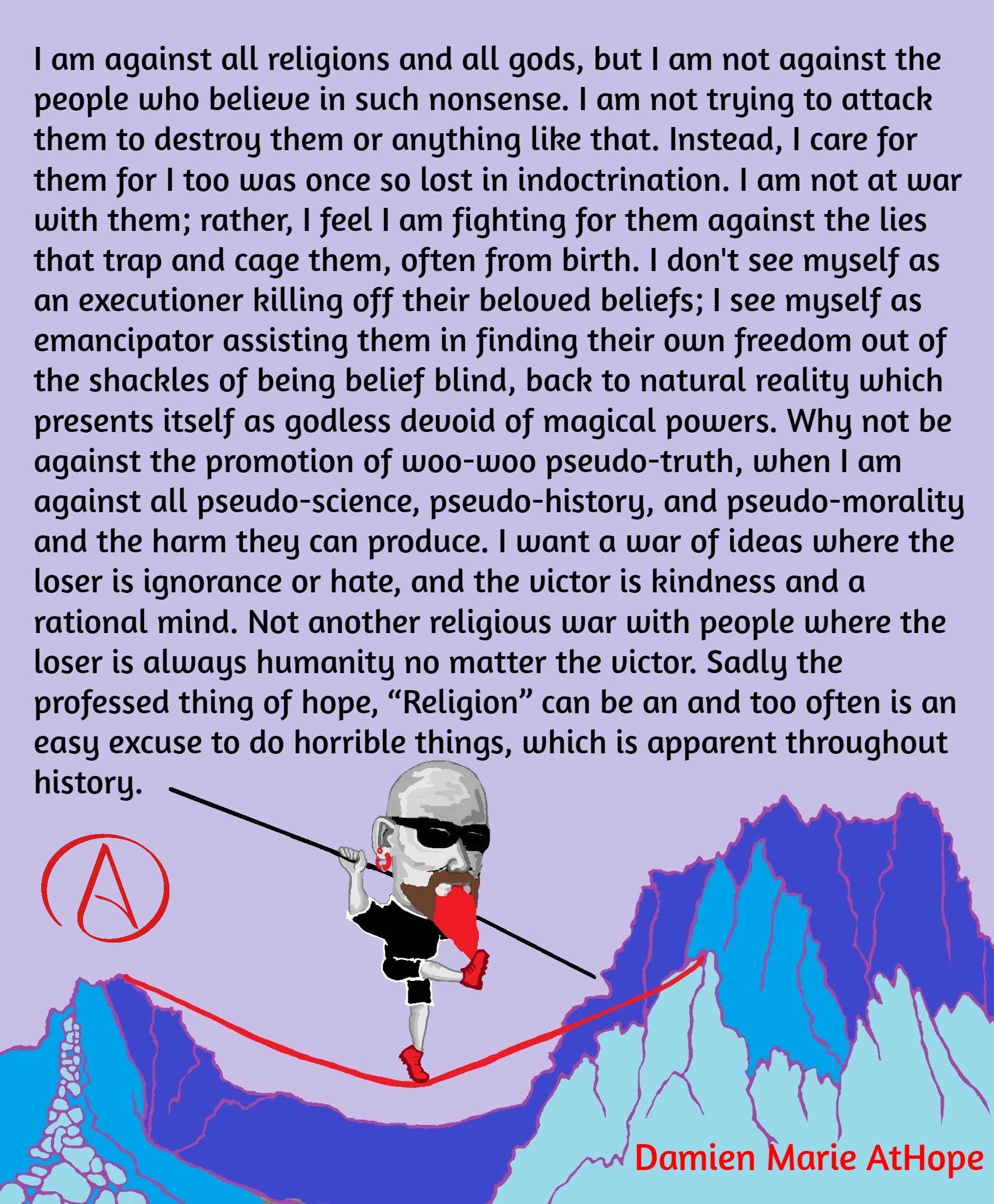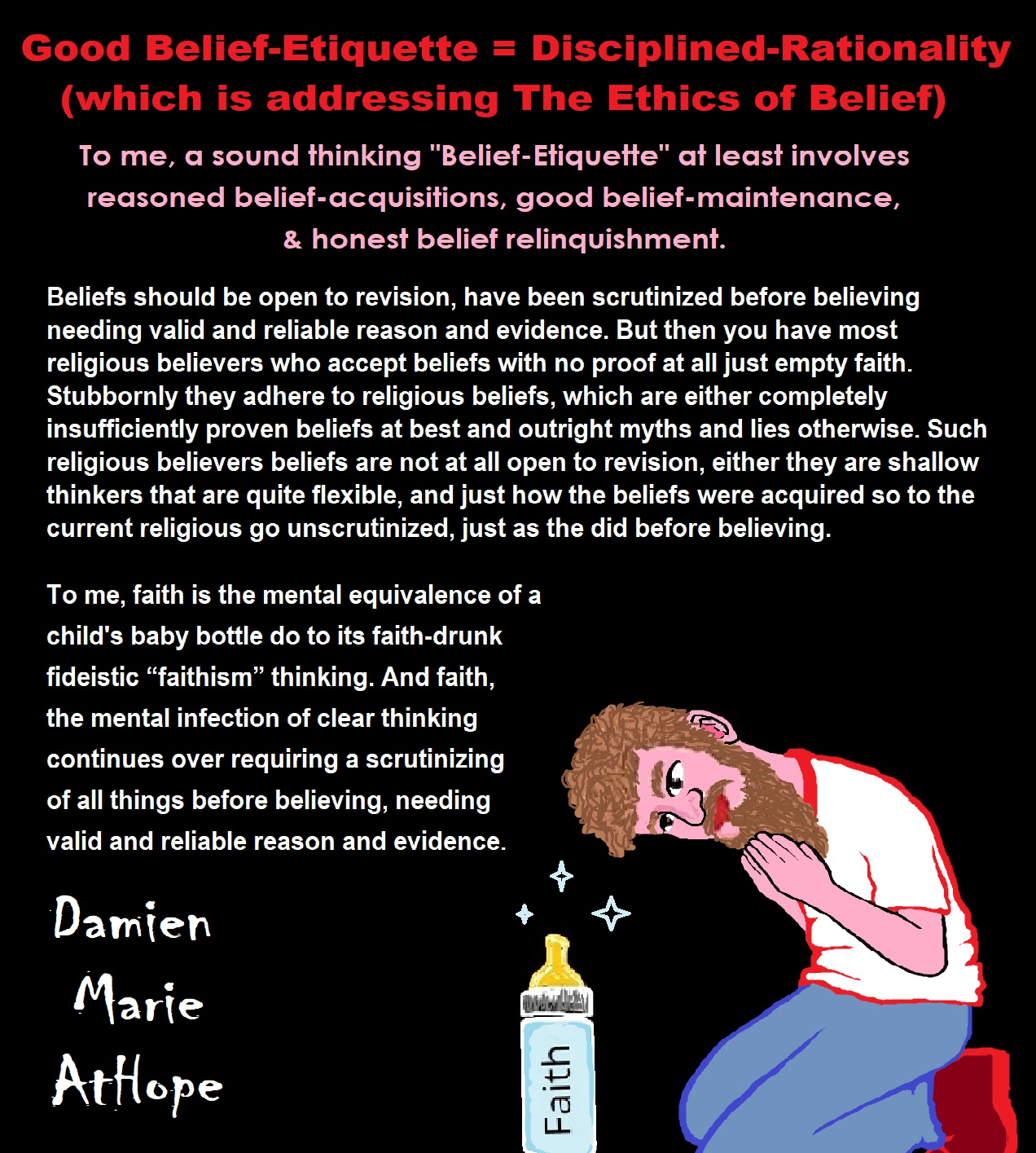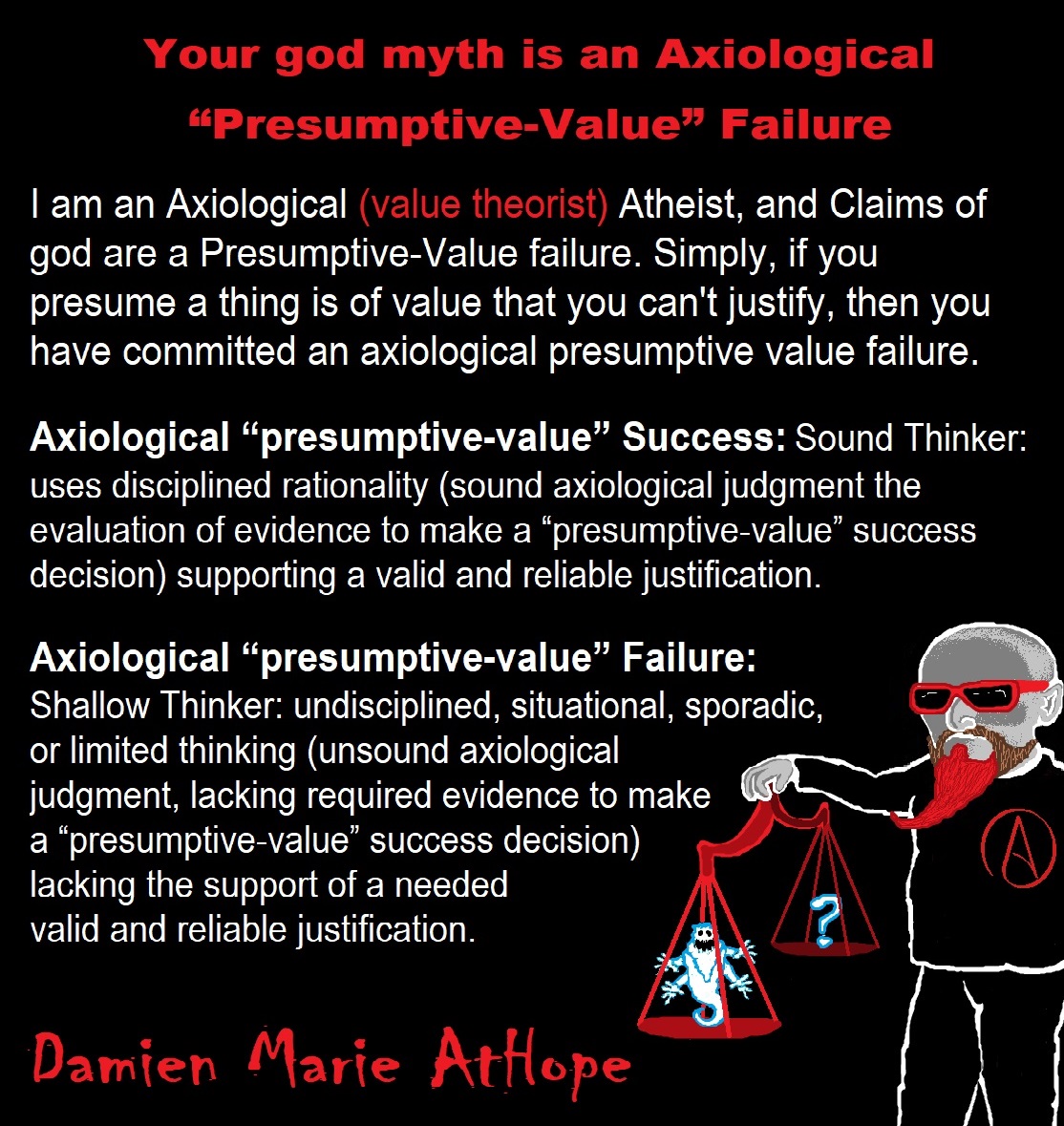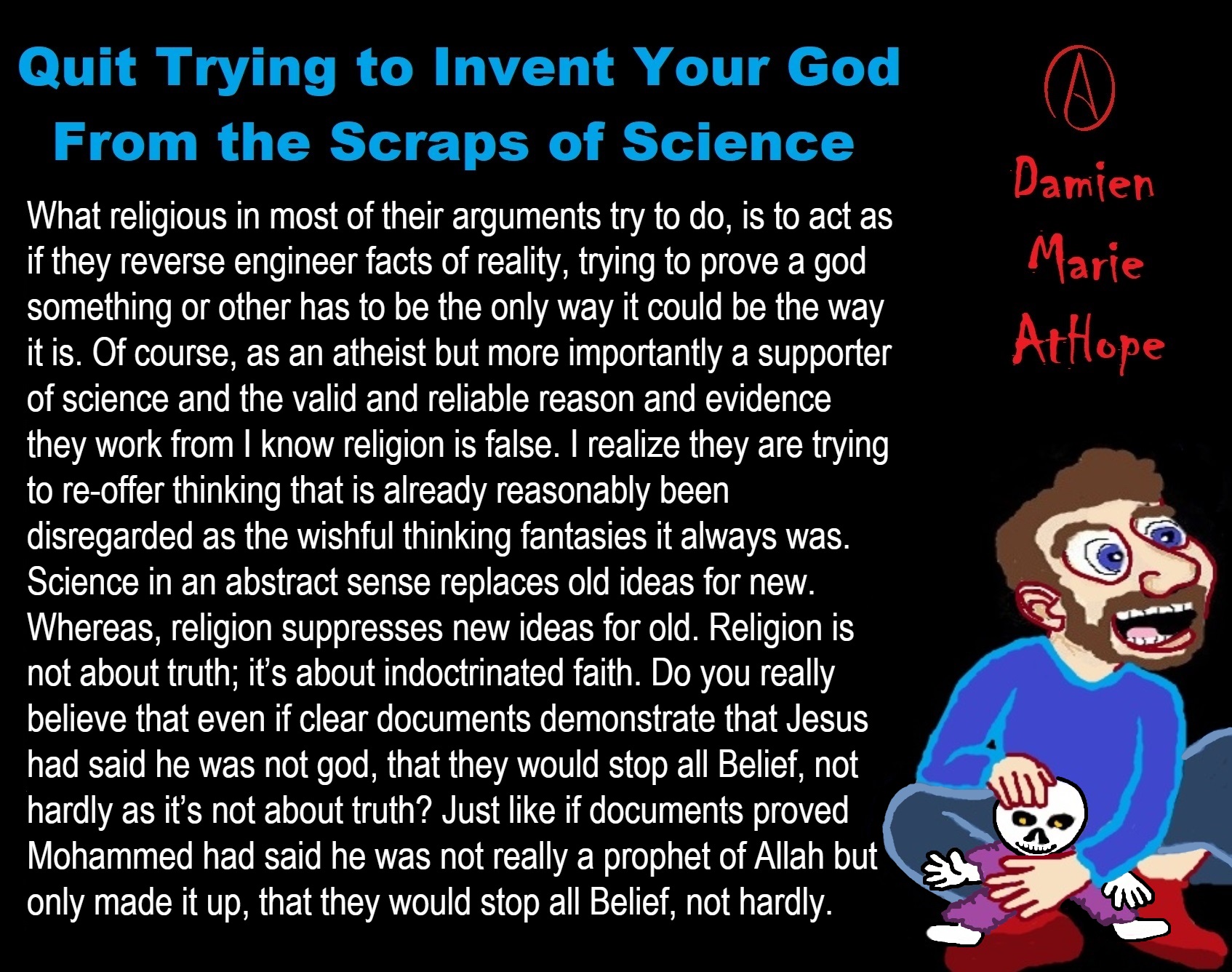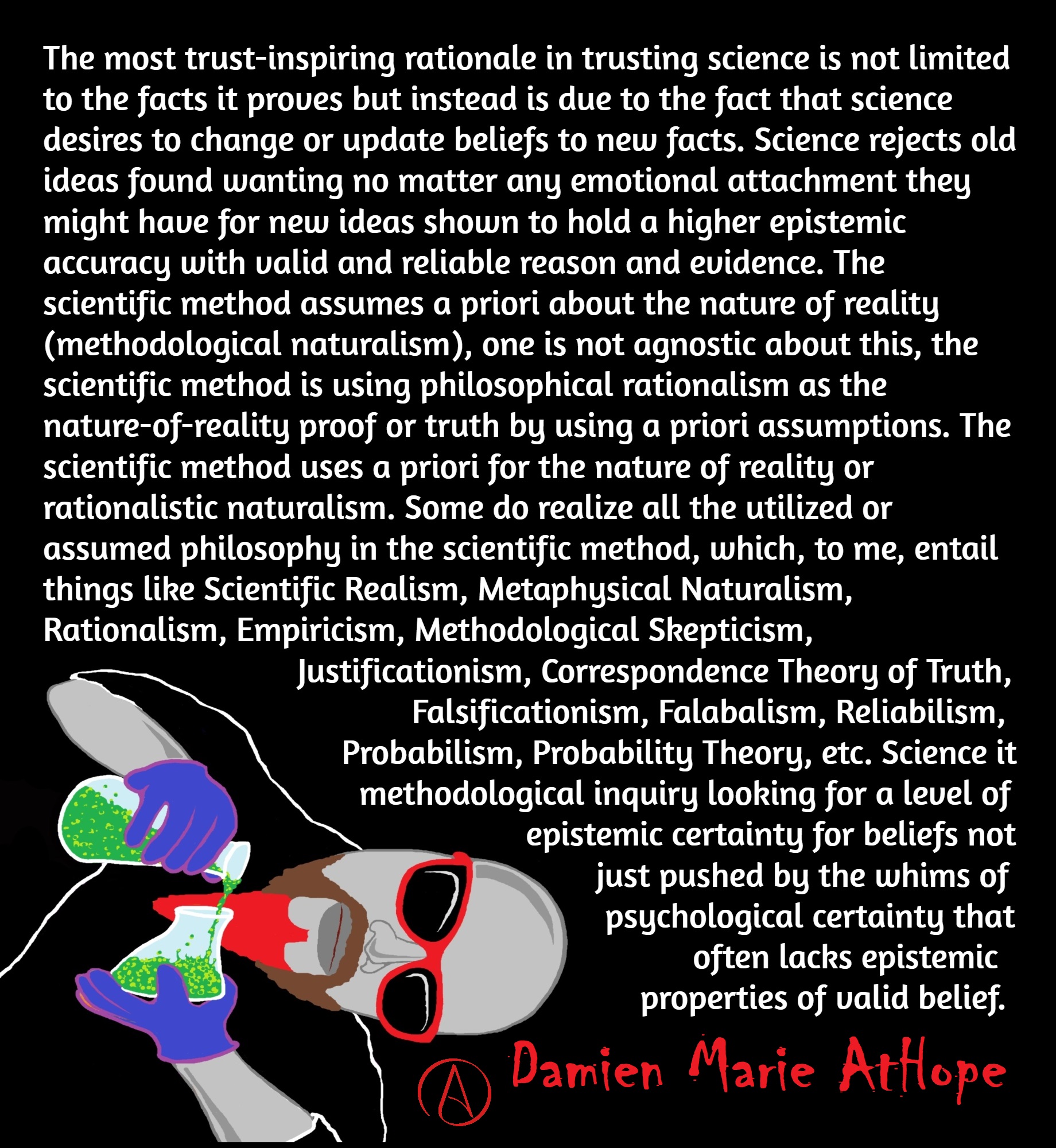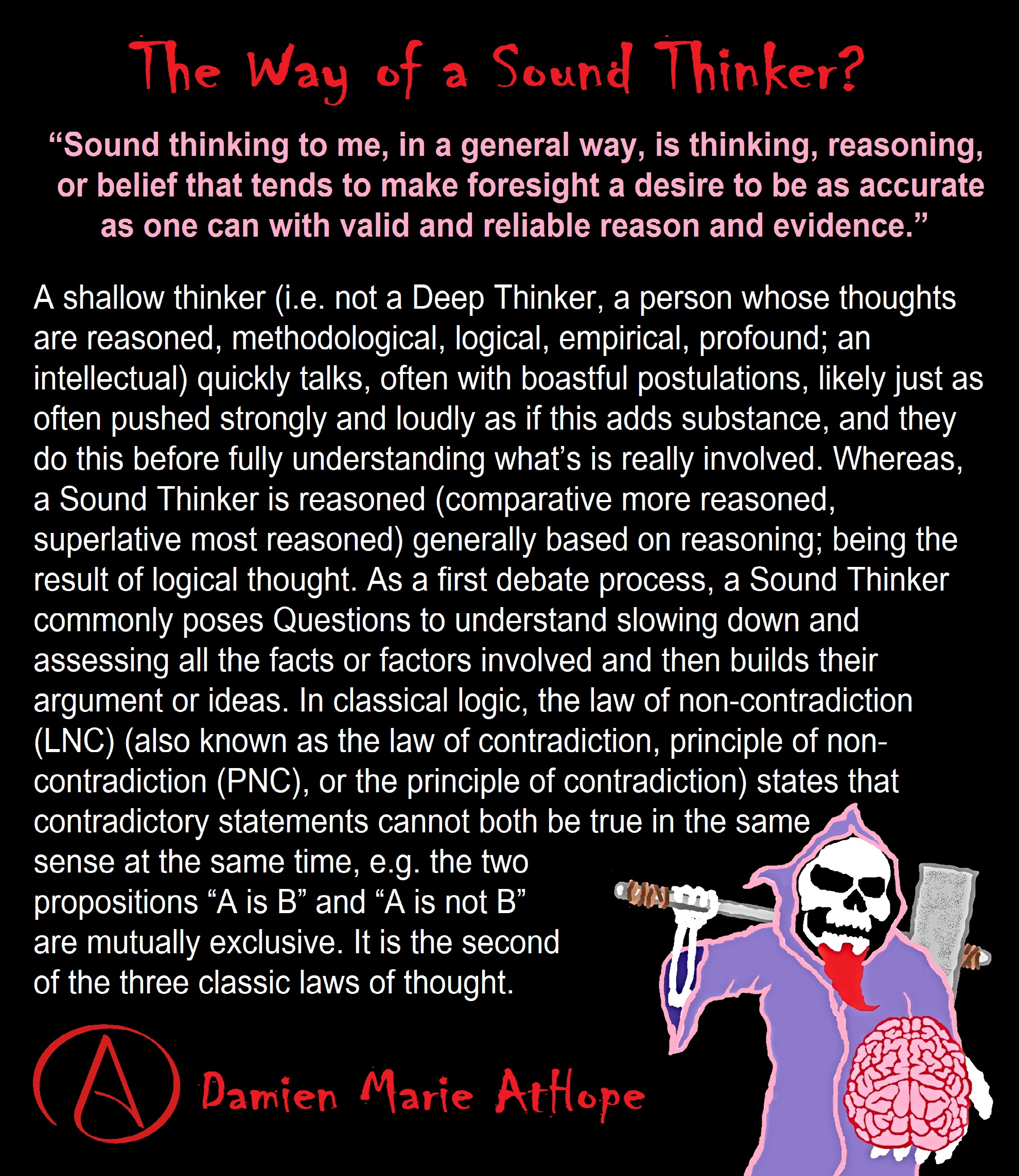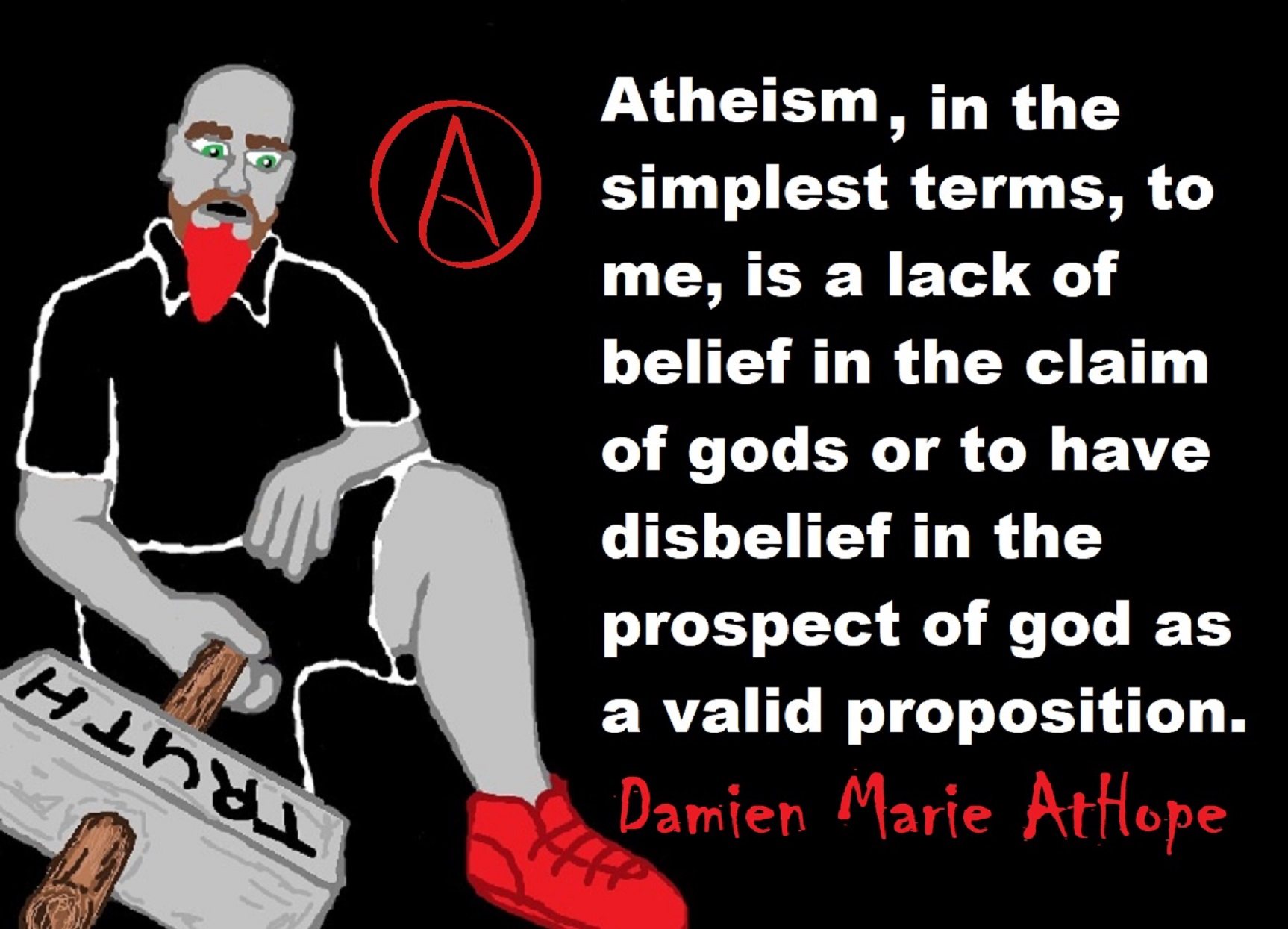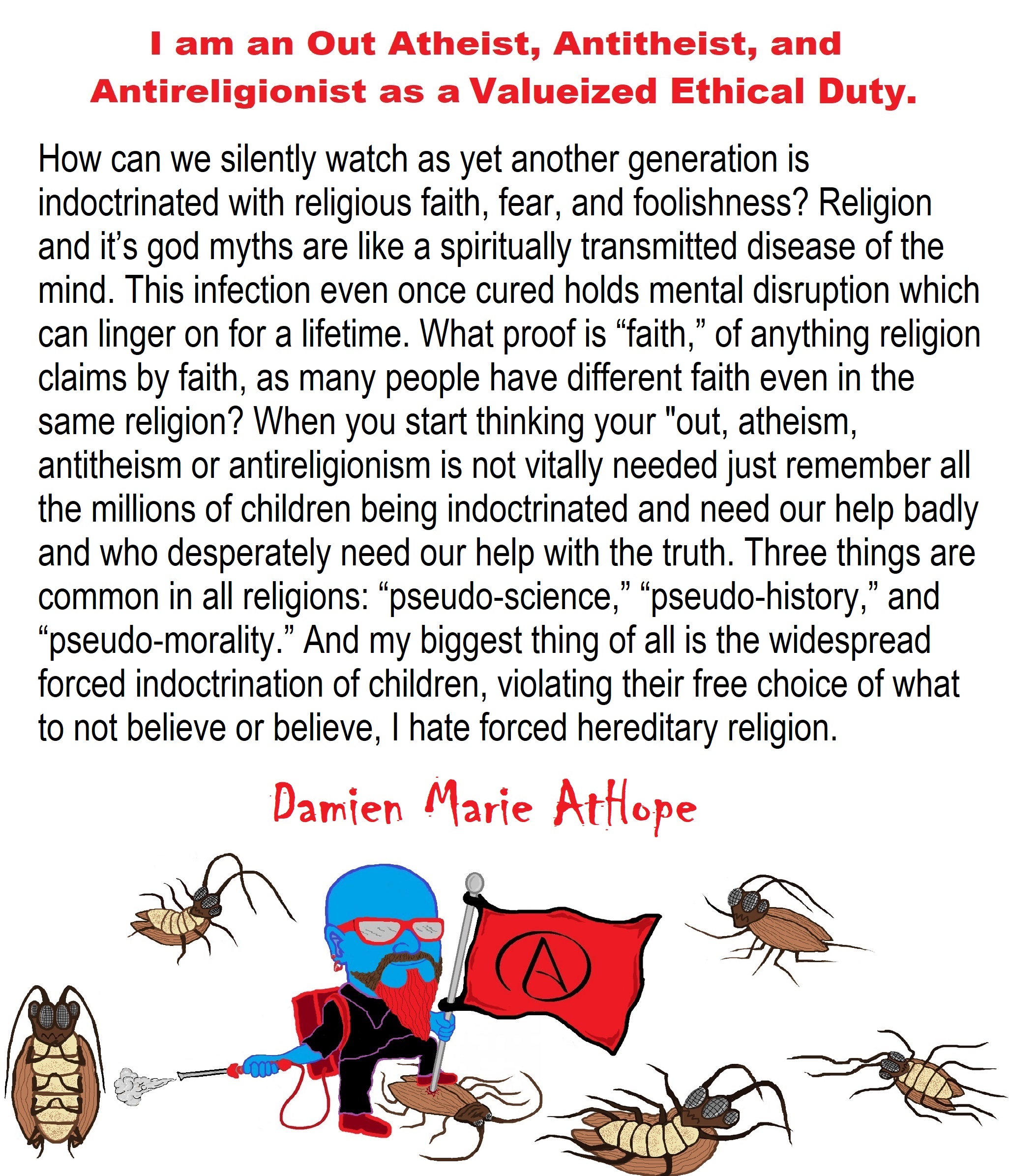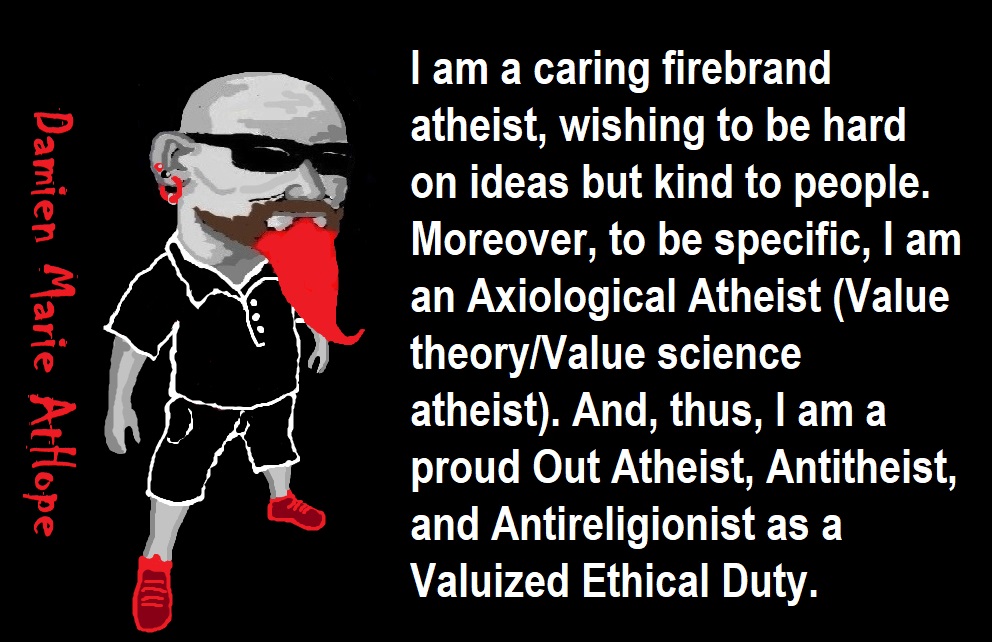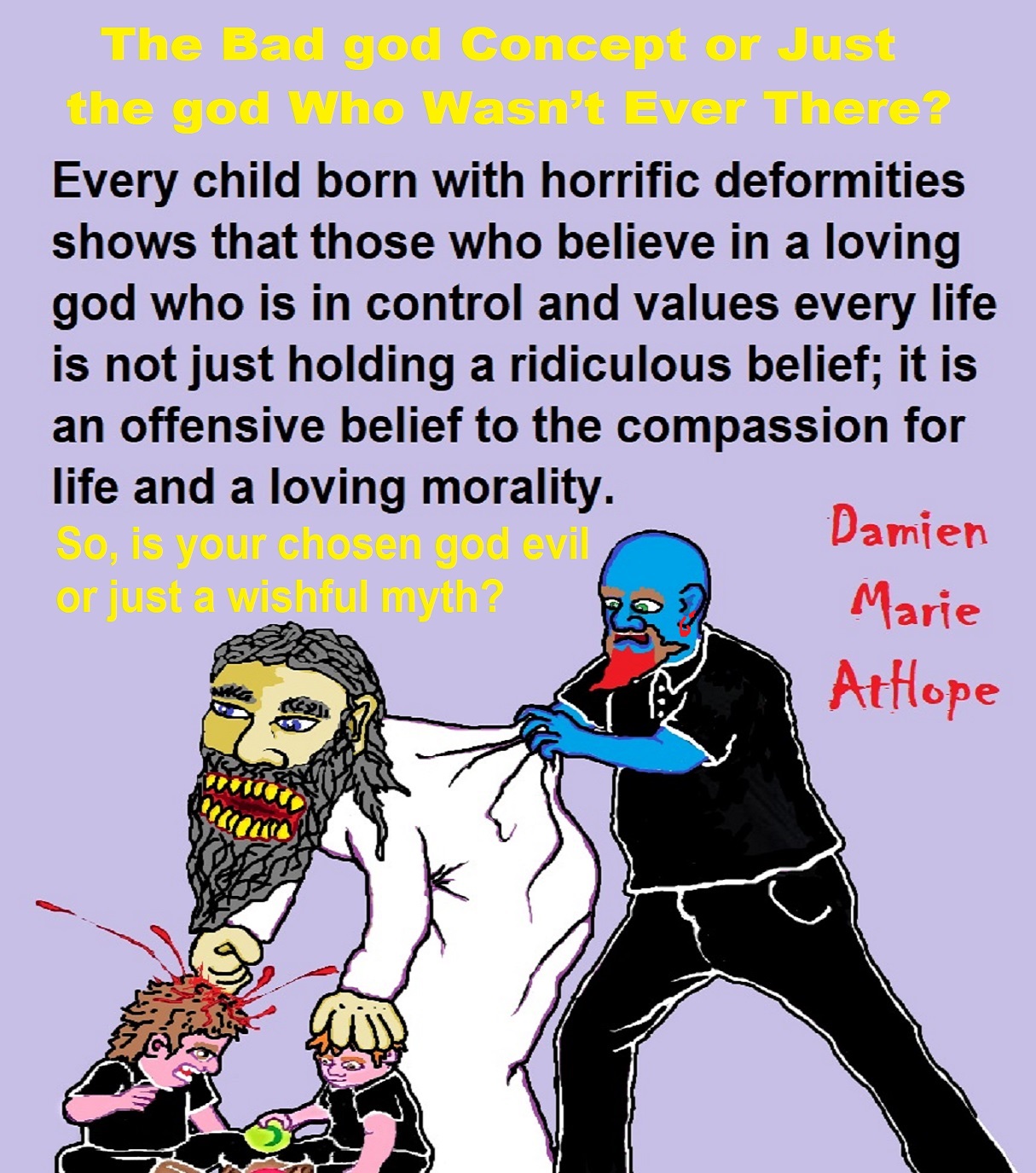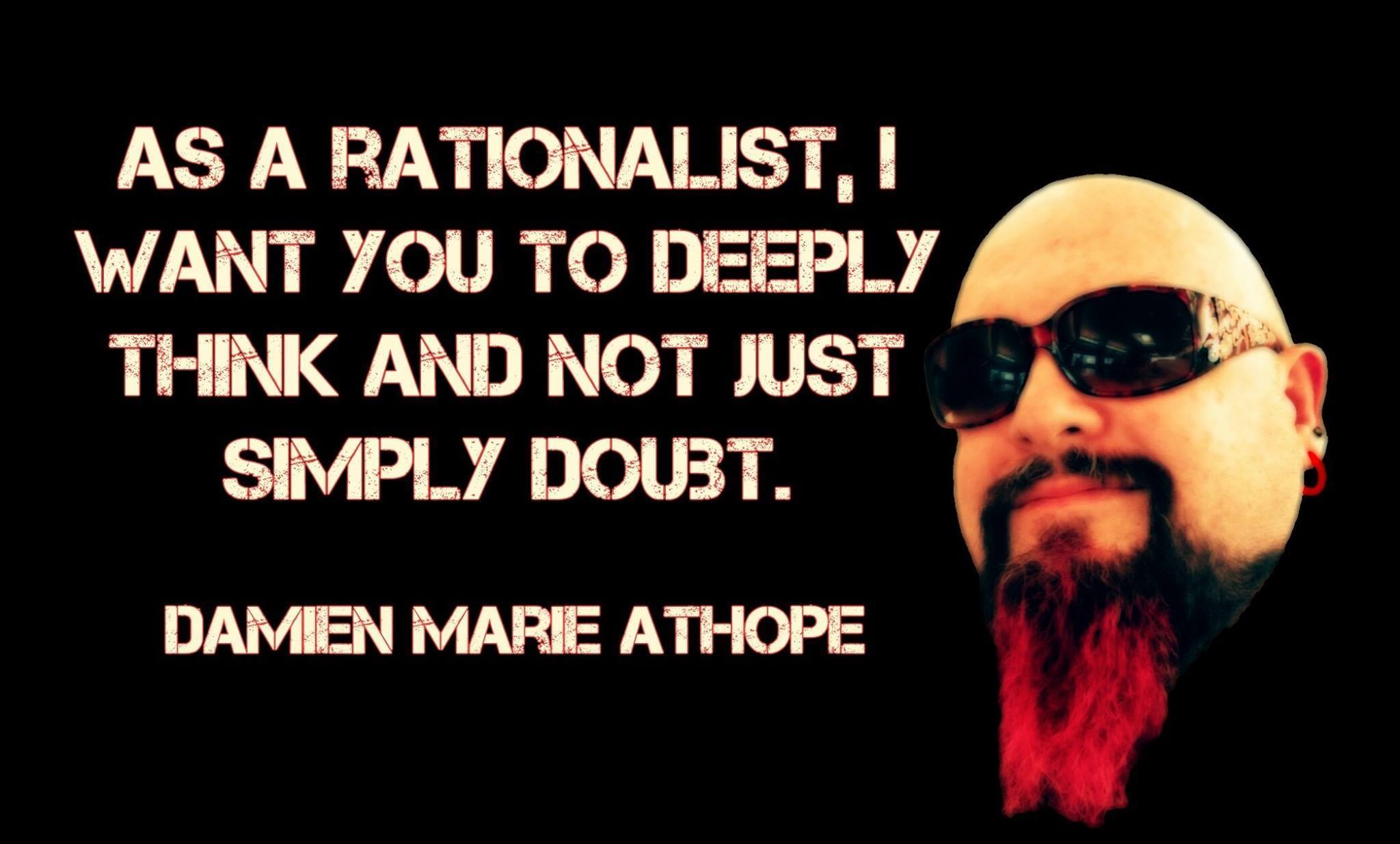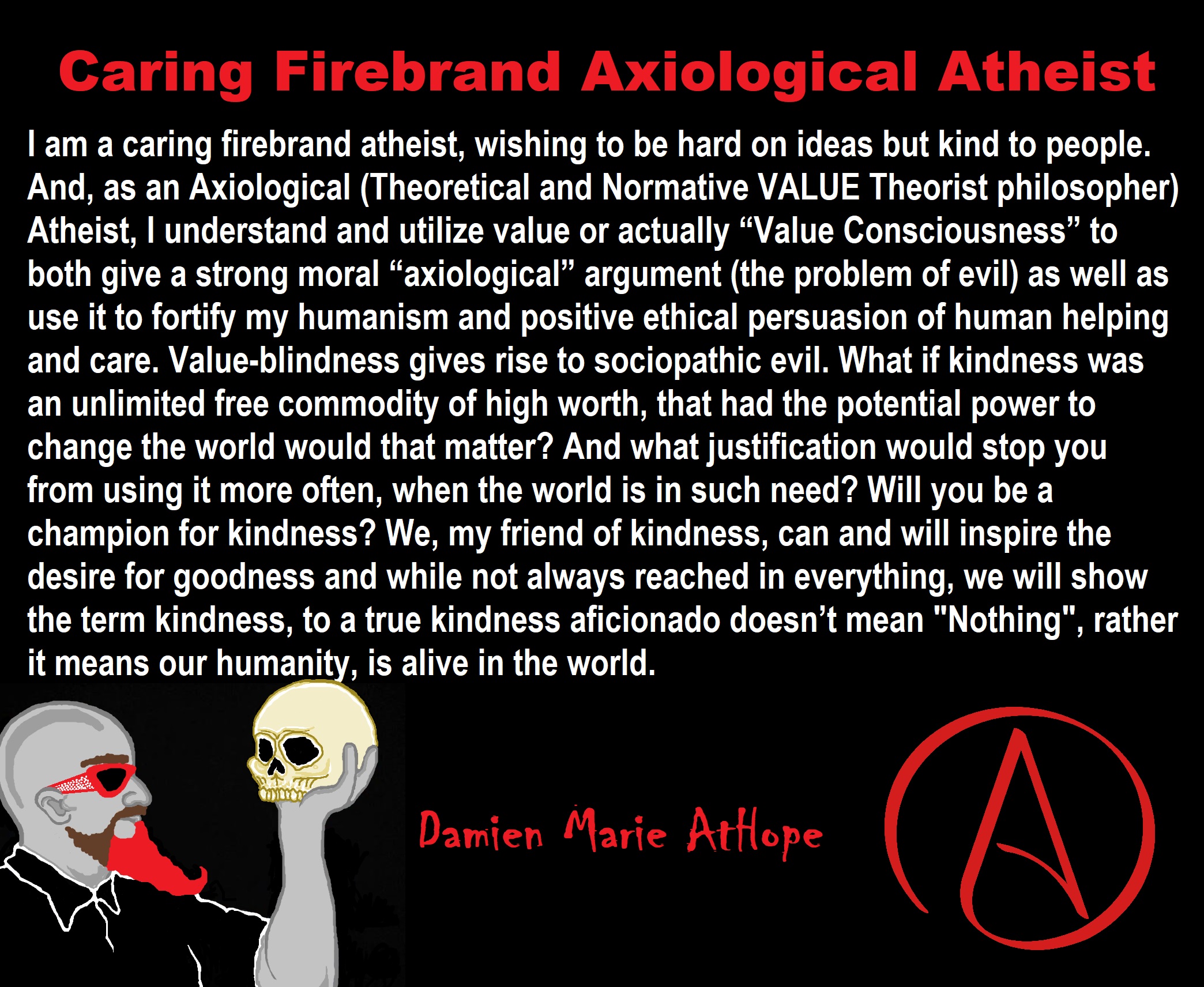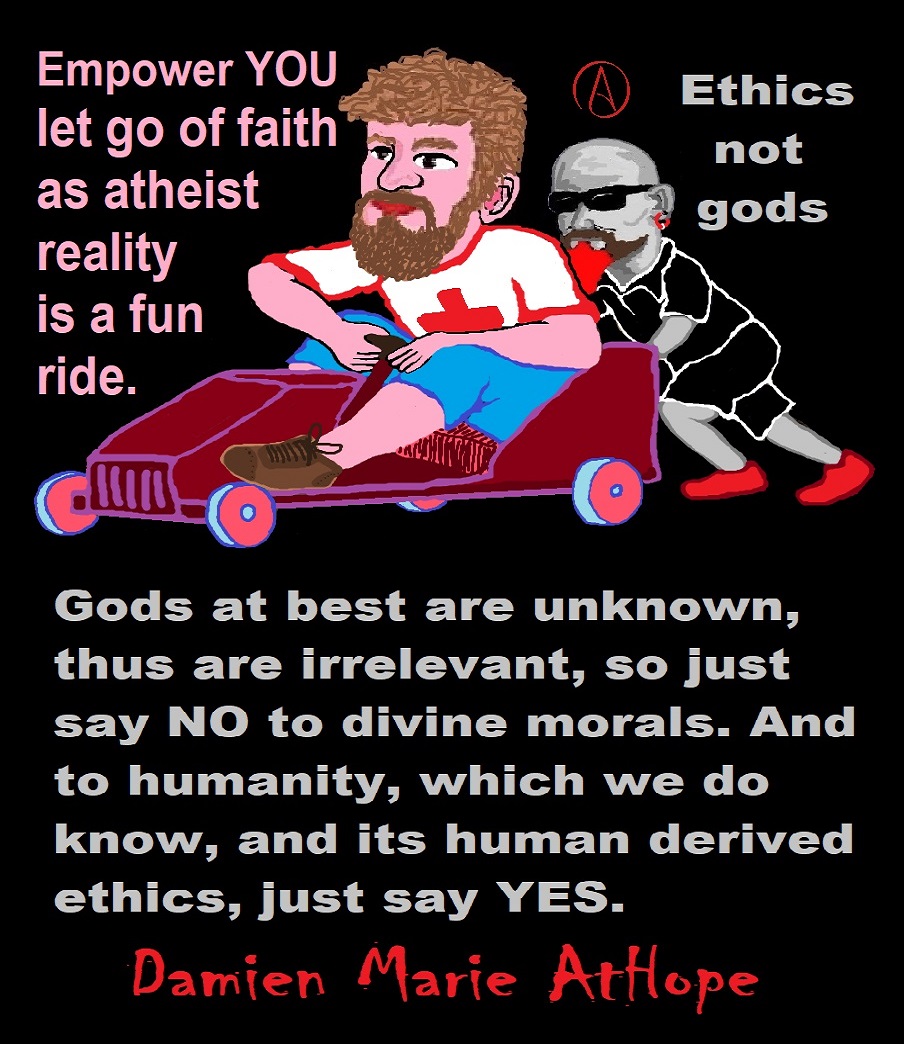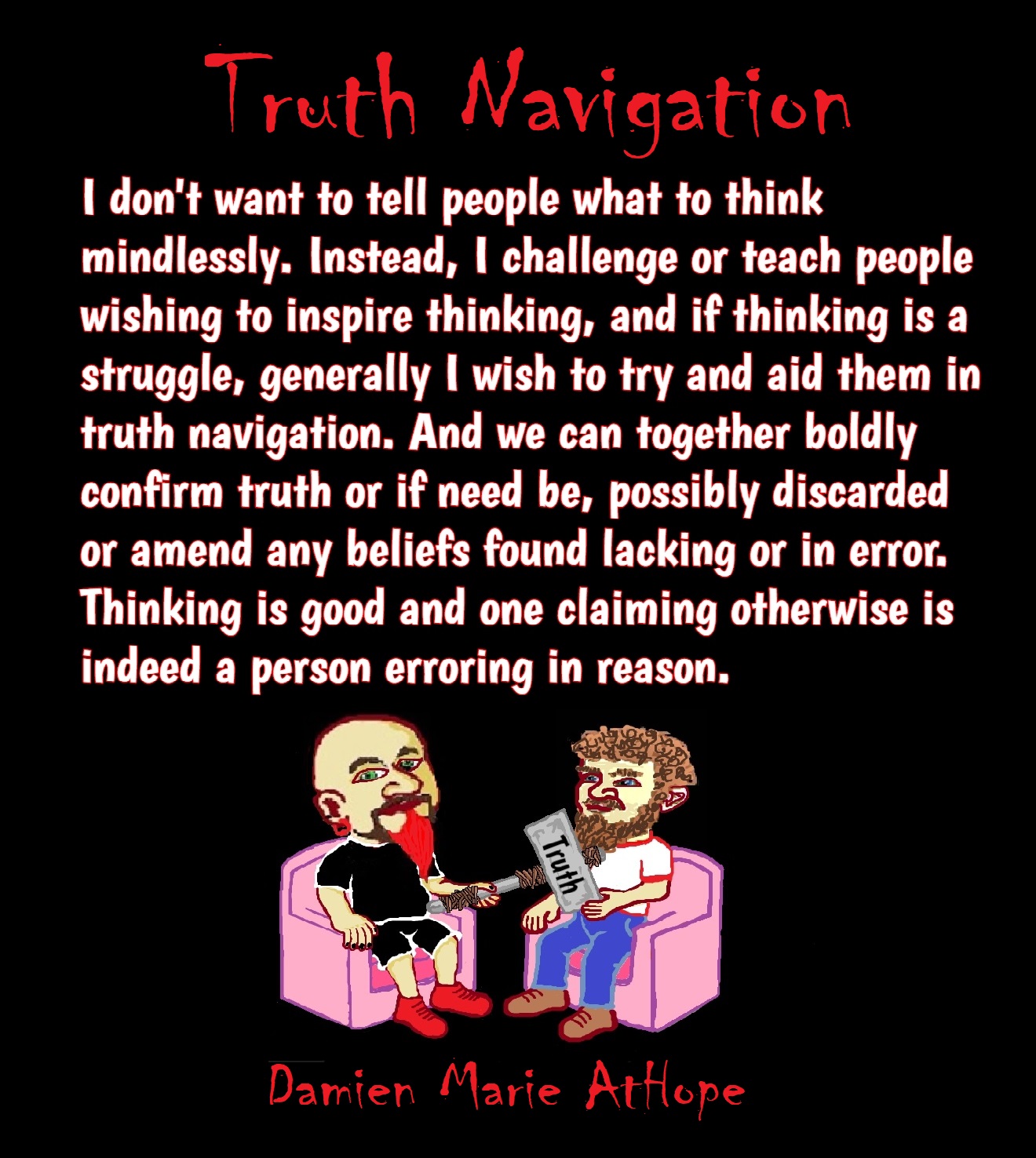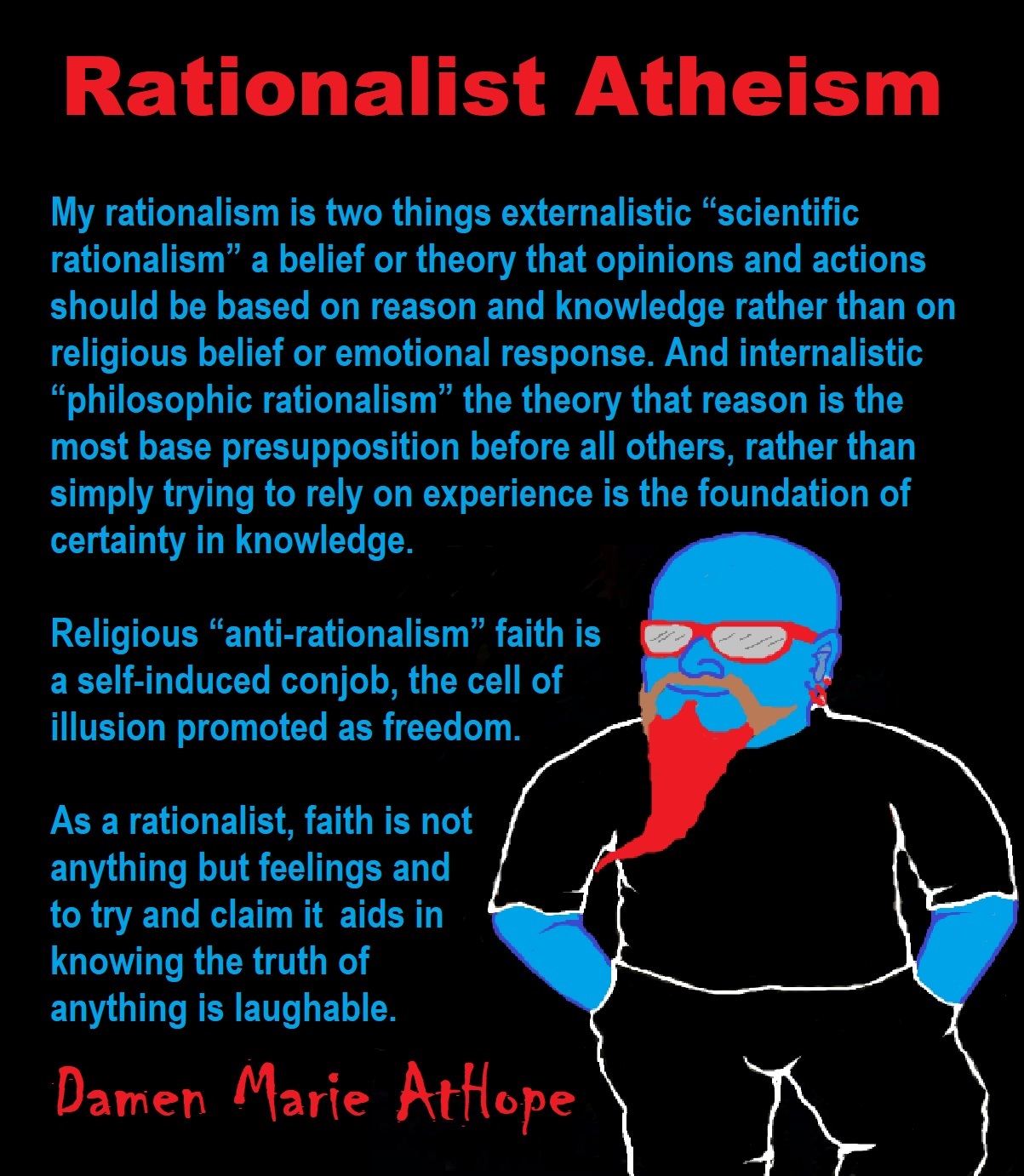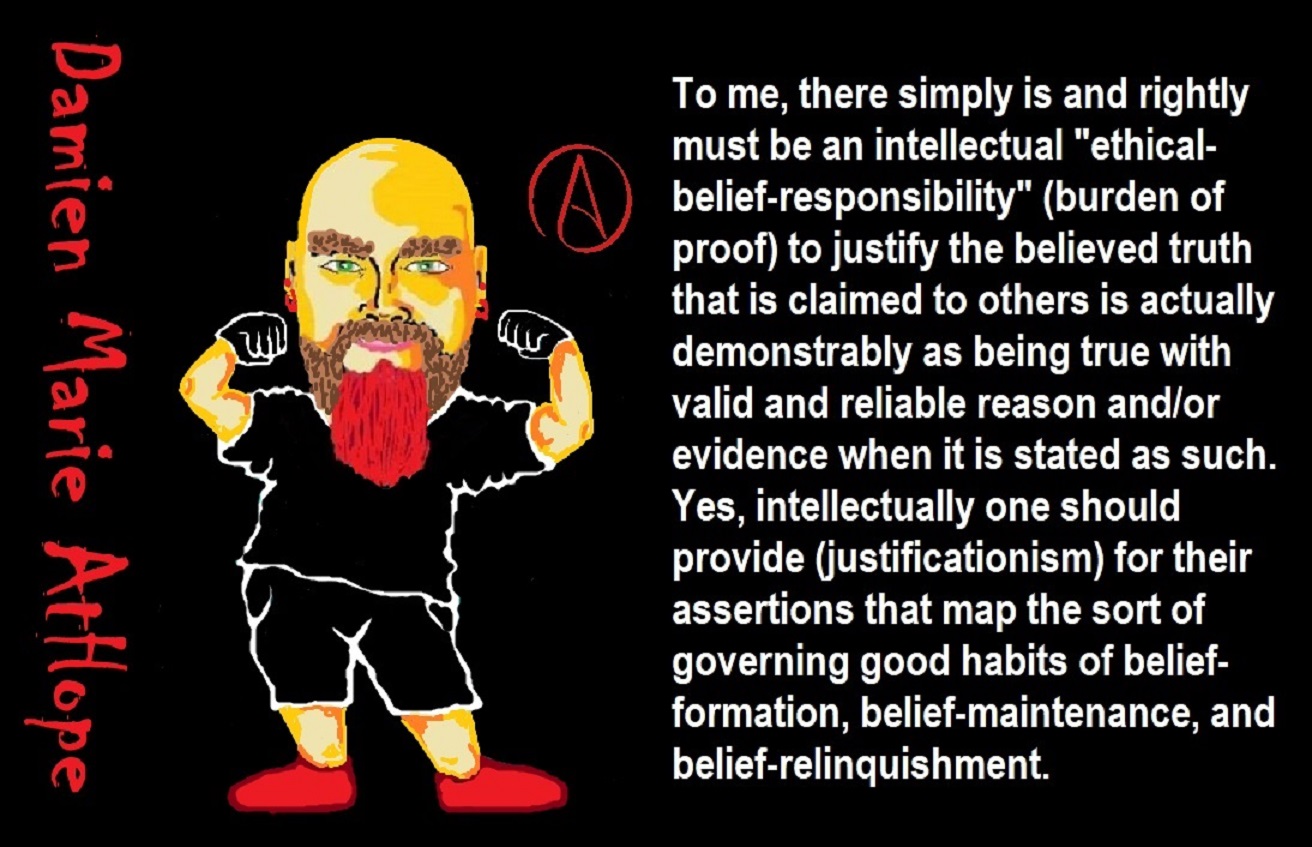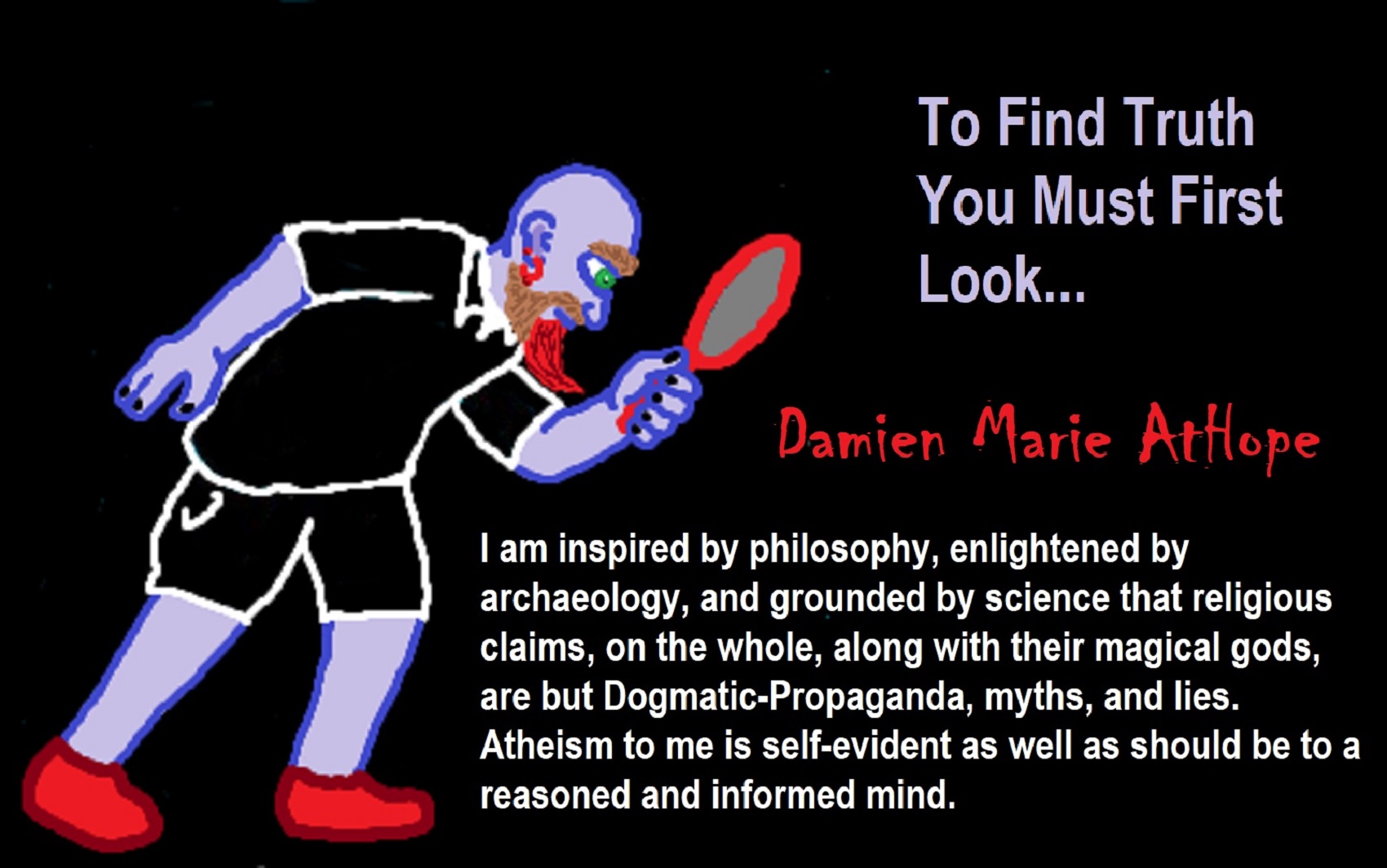
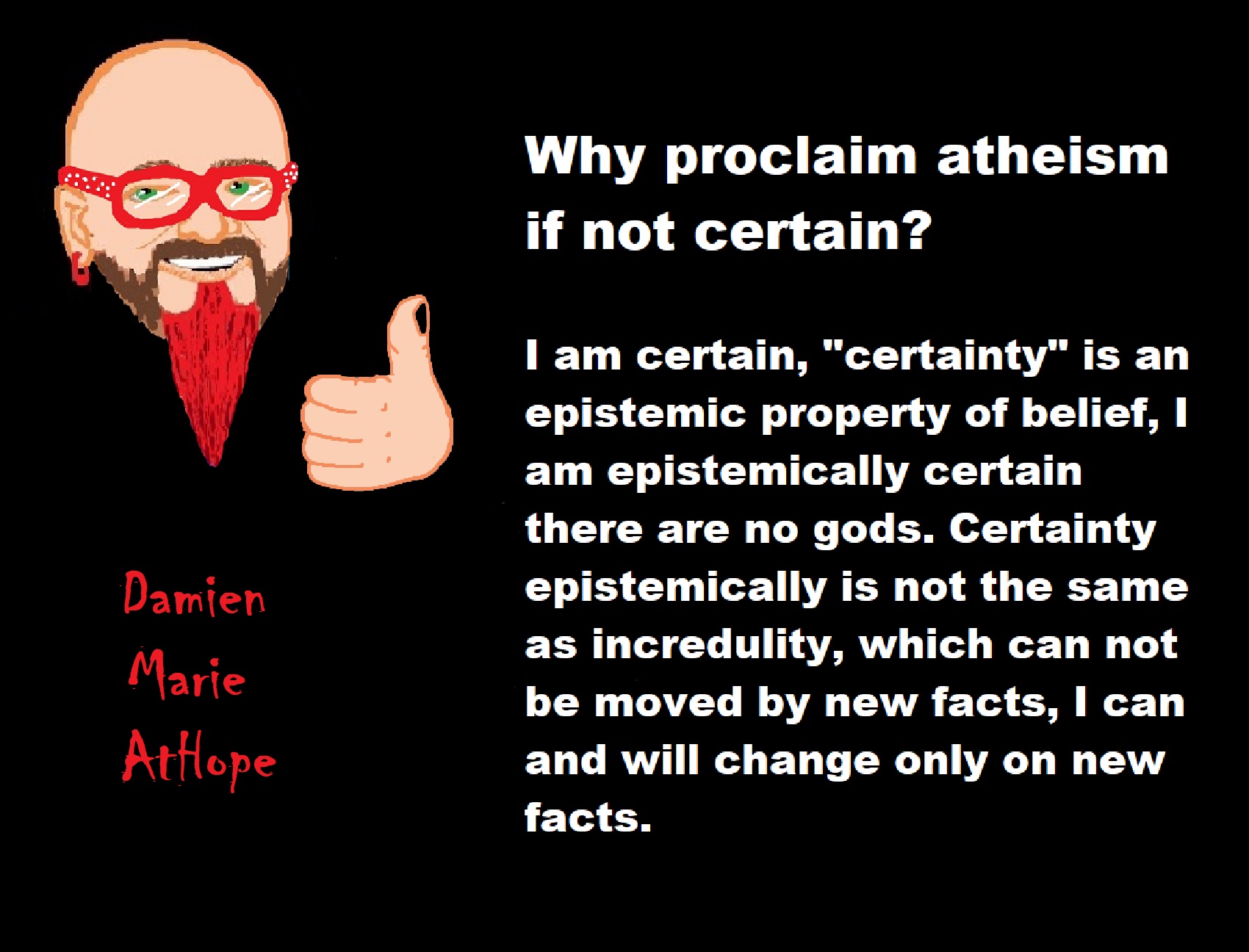
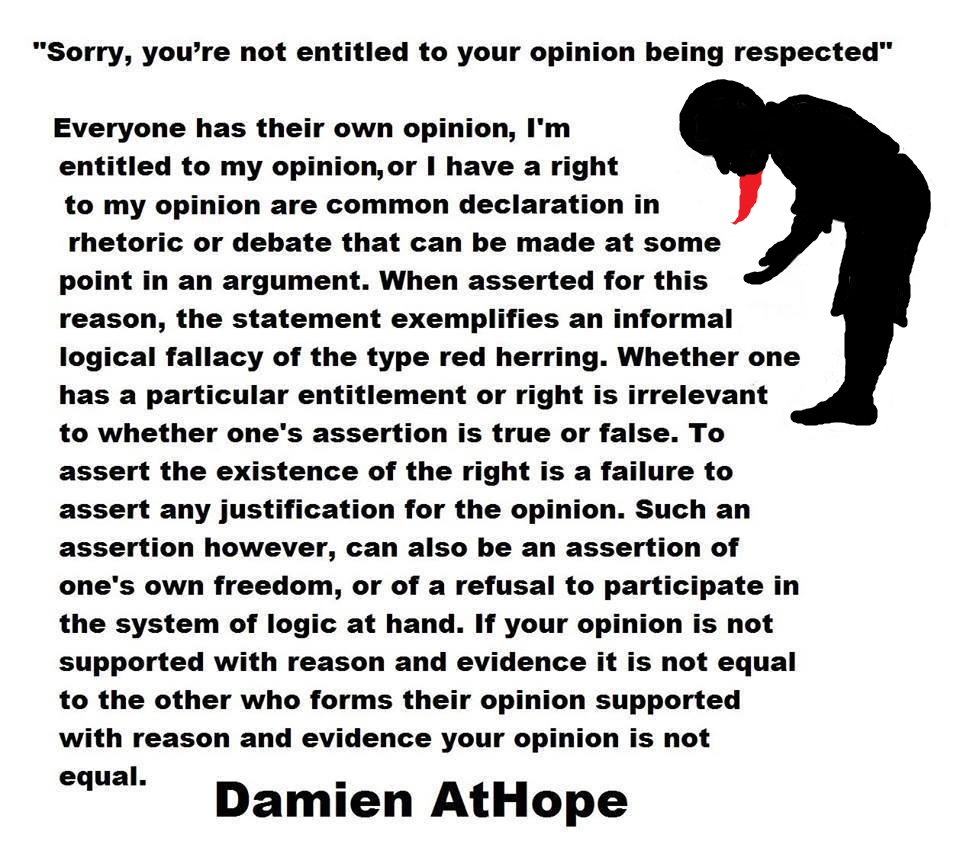
I am against all gods ever believed and against such a concept as gods and even if a god-something could be real, I am an anarchist antitheist, so I am against any “being” removing/threatening human rights and dignity or demanding worship.
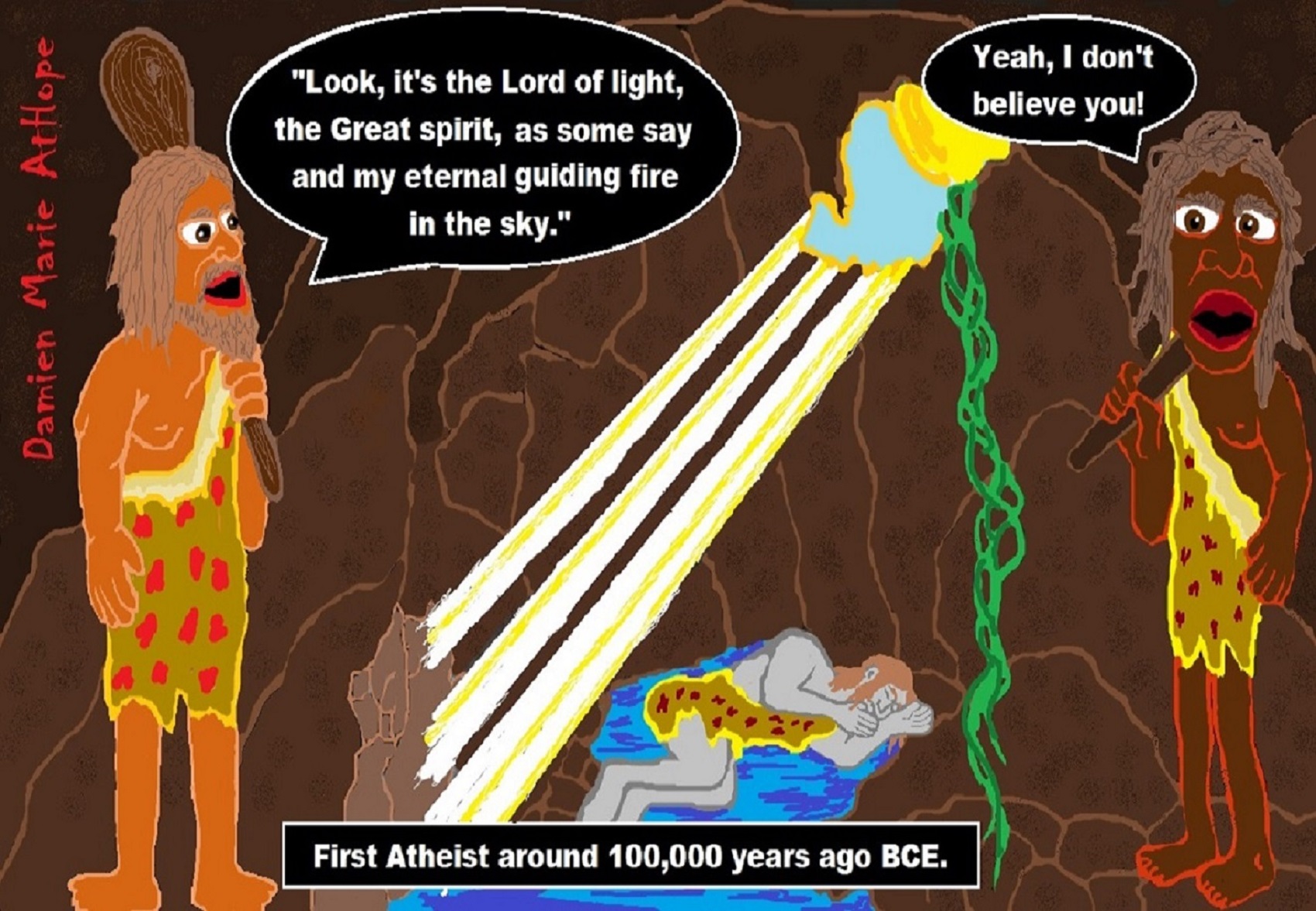
To Find Truth You Must First Look
“Rationalism vs. Emotionalism”
Rationalism: “Rationalism is any view appealing to intellectual and deductive reason (as opposed to sensory experience or any religious teachings) as the source of knowledge or justification. Thus, it holds that some propositions are knowable by us by intuition alone, while others are knowable by being deduced through valid arguments from intuited propositions. It relies on the idea that reality has a rational structure in that all aspects of it can be grasped through mathematical and logical principles, and not simply through sensory experience. During the middle of the 20th Century, there was a strong tradition of organized Rationalism (represented in Britain by the Rationalist Press Association, for example), which was particularly influenced by free thinkers and intellectuals. However, Rationalism in this sense has little in common with traditional Continental Rationalism and is marked more by a reliance on empirical science. It accepted the supremacy of reason but insisted that the results be verifiable by experience and independent of all arbitrary assumptions or authority. ref
Emotionalism, appealing to faith over facts “faithism” is, to me, often an expression of emotionalism over rationalism. Emotionalism, to me, in this truth versus nontruth, is placing focus on emotions rather than evidence, a tendency to regard things emotionally and/or undue indulgence in or display of emotion. ref
The tether that holds humans on a path to progressed humanity; is our shared willingness to not just function but flourish in our respect as well as support for all peoples sovereign individually and unity. We rise by helping each other.
If I never look, I will always find only what I am looking for, which is, simply, nothing if I never looked. However, if I truly seek truth, I may find more than I could imagine. If you only look for nothing, you will find nothing. However, to look earnestly, you will always find a new truth waiting to be found. Be willing to look and be a truth seeker. When you believe you can have little or no facts and need only faith, you demonstrate no real love of truth. I implore you to be a rationalist and accepting nothing but facts upon facts connected to reality. Faith is a proclamation of belief in the absence of or contrary to evidence. Faith is not a reasoned virtue; it is the vice of emotionalism.
Faith often seems to be seen at times as an argument dependent on some aspect of its user; i.e. from the bible one’s connection with the holy spirit as inspiring the believer’s faith, 1 Corinthians 12. And from the quran those who believe in the unseen, what was revealed before and to Muhammad are certain in faith, whereas those who disbelieve they lack faith because Allah has set a seal upon their hearts covering their faith their vision, Al Quran Surah 2:2-7. This is a flawed way of thinking as the true value of an argument is in its intellectual or empirical power; not some aspect of its user.
The need for Epistemic Rationality, I hate when you are so ignorant about something that you have no idea just how ignorant you are about it and sadly likewise don’t even know where to correctly seek out what you need to stop being as ignorant about it as you are. Being Epistemically Rational?
If it requires faith to see a thing as real, then you are admitting such a thing has nothing to do with reality. Can you not see that in the acquisition of knowledge faith, as a method is not worth believing in? Critical thinking requires you to work on your thinking continually, to make your thinking the object of thought, to make your behavior the object of your thinking, and to make your beliefs the object of your thinking. For example, take your religious thinking: All over the world, there are many belief systems and each is certain of its truth on the evidence devoid of the property of faith. As such, on average if you are raised where buddhism is most common, then you become a buddhist. If you are raised where hinduism is most common, then you become a hindu. Christian, you become a christian. Etc.
According to the Encyclopedia Britannica, you have 500 choices. Honestly, how many study religions before they pick one rather than it being picked for them? I like to say I am a rationalist atheist it’s not that I don’t value Skepticism as I do as a tool to minimize errors. I see skepticism as a way to protect against or remove falsehoods, but think in the unbelief community it is overemphasized from a tool to a full way of being. I don’t see it as a way of being for me as it in no way is a method to bring truth nor new knowledge. Skepticism is defined as the method of suspended judgment, systematic doubt, an attitude of doubt or a disposition to incredulity either in general or toward a particular object, or doubt concerning basic religious principles (as immortality, providence, and revelation). People who call themselves skeptics say it’s about critical thinking but if you look up critical thinking it never even mentions skepticism. The National Council for Excellence in Critical Thinking (a non-profit organization based in the U.S.) defines critical thinking as the intellectually disciplined process of actively and skillfully conceptualizing, applying, analyzing, synthesizing, and/or evaluating information gathered from, or generated by, observation, experience, reflection, reasoning, or communication, as a guide to belief and action. ref
- Empiricism
- Rationalism
- Skepticism ref
To me, a good use of rationality is to test concepts with skeptical thinking to see if one has errors, if so use rationalism again to clarify them and find truth belief which is knowledge. So it is not excluding the use of skepticism just not holding skeptical thinking as a main focus instead as I see it rationalism and rational thinking is the star.
As a rationalist I strongly stand up for reality
“Damien, do you believe creation could be a possibility yet very improbable, even life itself at a single cell level evolving there after pending creator’s Omnipotence, Omniscience, Omnipresence ???” – Questioner
My response, “I can only assess the possibility of things from the reference limited to reality, so no.”
“Reality as determined through a sensory filter that demonstrably cannot detect 90% of said reality. We’re peeking in on reality through a keyhole. There’s more than meets the eye. While nothing is what it seems, how can what we see be what we get?” – Challenger
My response, Reality is only assessed by tests in reality so do you have some valid non-realty method?
“Those tests are unfortunately locked onto our sensory filter. Our senses are fallible and only work on 10% of the bigger picture.” – Challenger
My response, so, no test method that is outside reality means all we know as I said is reality, right?
“We don’t know what reality is, dear friend. In fact the brightest minds in the world are leaning towards the nature of reality being in fact, not at all real. ” – Challenger
My response, To make the “anti-claim” is a hidden acceptance of reality to gain such knowledge so you already are seemingly agreeing with my reality to know reality starting point. If you don’t start with my reality-point, what do you think you gather this claimed non-reality evidence that we do not know reality? I feel your claim attaches not an understanding of reality to even then go to justifying it thus you appeal presuppositional to the thing you mean to use to then say you don’t know it but you claim to know that so a full knowledge claim of a lack of knowledge claim?
“I don’t believe in reality, Damien. My own research has lead me to the conclusion that reality is a simulation. How can I accept any individual’s interpretation of reality when I don’t believe in reality?” – Challenger
My response, you don’t believe in reality because what justification that is not appealing to this reality? To ask, “How can I accept any individual’s interpretation of reality” is a what doubt of yourself or others? You already said the opposite, that you believe the thinking of the brightest minds in the world are leaning towards the nature of reality being in fact, not at all real. So, you appealed both to the reality of others and that they can be trusted, right?
“I don’t believe in reality for a vast array of reasons. I could never sum it up in a simple phrase. For instance the relativistic effect of supposed reality makes me suspect of its true nature. Everything about reality is relative to the consciousness interpreting it. There’s no static reality, what us true for some minds is false to others and vice versa.” – Challenger
My response, So, is this “relativistic effect” is a test in reality or outside reality, or some other non-reality thing? “Everything about reality is relative to the consciousness interpreting it.” Let’s ponder this knowledge claim about reality, claiming to know but not? You know this or do you simply like it and I guess, are unjustifiably believe this?
“Sure. Reality to an insect colony is nothing like reality for a bird, or indeed a human consciousness. The world is wholly different to each individual consciousness, and in this strict context they’re mutually valid.” – Challenger
My response, Relativistic effects are important for the heavier elements with high atomic numbers. So you agree there is a reality just how we understand it is not complete?
“Time is also relative. Two minds experiencing the same thing can have totally opposite interpretation. No, I simply don’t believe in reality.” – Challenger
My response, ok, but that is referring to different perception in reality, not a removing of reality, right?
“Yes but the fact that these two totally conflicting view points both carry equal validity means that consensus reality and personal reality are two different things. There’s so many kinds of reality that you can’t peg down a definition. Attempts to do so are at least esoteric and at most nebulous. Indeed why believe in reality at all? I can’t think of one reason. ” – Challenger
My response, that is not how science works as there are better models and less effective models and you have not yet used an effective model outside reality to make an anti-reality claim and so do many smart people, so they are like most making unjustified claims about reality all the while appealing to reality (all can and do error even me but that does not remove truth does it. Don’t forget you did make several seeming truth claims.
“I have the simulation hypothesis. Research it, my friend. ” – Challenger
My response, thinking is occurring and it is both accessible as well as guided by what feels like me; thus, it is rational to assume I have a thinking mind, so, I exist. But, some skeptics challenge reality or certainty (although are themselves appealing to reason or rationality that it self they seem to accept almost a priori themselves to me). Brain in a vat or jar, Evil Demon in your mind, Matrix world as your mind, & Hologram world as your reality are some arguments in the denial or challenge of reality or certainty.
My response, The use of “Brain in a vat” type thought experiment scenarios are common as an argument for philosophical skepticism and solipsism, against rationalism and empiricism or any belief in the external world’s existence. Such thought experiment arguments do have a value are with the positive intent to draw out certain features or remove unreasoned certainty in our ideas of knowledge, reality, truth, mind, and meaning. However, these are only valuable as though challenges to remember the need to employ Disciplined-Rationality and the ethics of belief, not to take these thought experiment arguments as actual reality. Brain in a vat/jar, Evil Demon, Matrix world, and Hologram world are logical fallacies if assumed as a reality representations.
My response, First is the problem that they make is a challenge (alternative hypotheses) thus requiring their own burden of proof if they are to be seen as real. Second is the problem that they make in the act of presupposition in that they presuppose the reality of a real world with factual tangible things like Brains and that such real things as human brains have actual cognition and that there are real-world things like vats or jars and computers invented by human beings with human real-world intelligence and will to create them and use them for intellectually meaningful purposes. Third is the problem of valid and reliable slandered as doubt is an intellectual professes needing to offer a valid and reliable slandered to who, what, why, and how they are proposing Philosophical Skepticism, Solipsism and the Denial of Reality or Certainty. Though one cannot on one had say I doubt everything and not doubt even that. One cannot say nothing can be known for certain, as they violate this very thought, as they are certain there is no certainty.
My response, The ability to think of reasonable doubt (methodological Skepticism) counteracts the thinking of unreasonable doubt (Philosophical Skepticism’s external world doubt and Solipsism). Philosophical skepticism is a method of reasoning which questions the possibility of knowledge is different than methodological skepticism is a method of reasoning, which questions knowledge claims with the goal finding what has warrant, justification to validate the truth or false status of beliefs or propositions. Fourth is the problem that external world doubt and Solipsism creates issues of reproducibility, details and extravagancy. Reproducibility such as seen in experiments, observation and real-world evidence, scientific knowledge, scientific laws, and scientific theories. Details such as the extent of information to be contained in one mind such as trillions of facts and definable data and/or evidence. And extravagancy such as seen in the unreasonable amount of details in general and how that also brings the added strain to reproducibility and memorability. Extravagancy in the unreasonable amount of details also interacts with axiological and ethical reasoning such as why if there is no real world would you create rape, torture, or suffering of almost unlimited variations.
My response, Why not just rape but child rape not just torture but that of innocent children who would add that and the thousands of ways it can and does happen in the external world. Extravagancy is unreasonable, why a massive of cancers and infectious things, millions of ways to be harmed, suffer and die etc. There is a massive amount of extravagancy in infectious agents if the external world was make-believe because of infectious agents come in an unbelievable variety of shapes, sizes and types like bacteria, viruses, fungi, protozoa, and parasites. Therefore, the various types of pleasure and pain both seem an unreasonable extravagancy in a fake external world therefore the most reasonable conclusion is the external world is a justified true belief. Fifth is the problem that axiological or ethical thinking would say we only have what we understand and must curtail behavior ethically to such understanding. Think of ability to give consent having that reasoning ability brings with it the requirement of being responsible for our behaviors.
My response, If one believes the external world is not real, they remove any value (axiology) in people, places or things and if the external world is not real there is no behavior or things to interact with (ethics) so nothing can be helped or harmed by actions as there is no actions or ones acting them or having them acting for or against. In addition, if we do not know is we are actually existing or behaving in the real world we also are not certain we are not either, demanding that we must act as if it is real (pragmatically) do to ethical and axiological concerns which could be true. Because if we do act ethically and the reality of the external world is untrue we have done nothing but if we act unethical as if the reality of the external world is untrue and it is in fact real we have done something to violate ethics. Then the only right way to navigate the ethics of belief in such matters would say one should behave as though the external world is real.
My response, In addition, axiological or ethical thinking and the cost-benefit analysis of belief in the existence of the external world support and highly favors belief in the external world’s existence. Solipsism (from Latin solus, meaning “alone”, and ipse, meaning “self”) is the philosophical idea that only one’s own mind is sure to exist. To me, solipsism is trying to limit itself to rationalism only to, of, or by itself. Everyone, including a Solipsist, as the mind to which all possible knowledge flows; consider this, if you think you can reject rational thinking as the base of everything, what other standard can you champion that does not at its core return to the process of mind as we do classify people by intelligence. If you cannot use rationalism what does this mean, irrationalism? A Solipsist, is appealing to rationalism as we only have our mind or the minds of others to help navigate the world accurately as possible. Okay let’s think about your claim, “I have the simulation hypothesis.” in which I am guessing, you don’t appeal to anything in reality to reach such a thinking?
“Do the research. Yes it’s a testable hypothesis, and some scientists are so convinced that they’re looking for errors in the code. You don’t mean to tell me you’re afraid of a little research? No, I won’t spoon feed it to you. The keys are in your hands. ” – Challenger
My response, I already have and I reject it fully, as I did here; unless if you now can disprove all my challenges about the starting point philosophic reference being the reality your effort to use to deny reality relatively not objectively and you think I am the one needing more research? Okay let’s think about your claim, “a testable hypothesis” in which I am guessing, you don’t appeal to anything in reality to reach such a thinking? The irrationalist sees reason as irrational. that’s why we can’t often reason with them, until we first crack the flawed thinking paradigm they reason through. In the irrationalist mind, denying the authority of reason is almost as strong as their will to not see what is true over what is believed. It’s almost a lost cause from the beginning for many, but even some hard cases turn around and enlighten themselves eventually.
Ontology, Epistemology, & Axiology argument/challenge protocol
Ontology (Greek meaning ontos, “being; that which is”; and logos meaning “discourse, study, ratio, calculation, reason”) Ontology is the philosophical study of the nature of being, becoming, existence, or reality, as well as the basic categories of being and their relations.
Epistemology (Greek episteme, meaning “knowledge, understanding”, and logos, meaning “discourse, study, ratio, calculation, reason”) it is the theory of knowledge, especially with regard to its methods, validity, and scope. Epistemology is the investigation of what distinguishes justified belief from opinion.
Axiology (Greek meaning axia, “value, worth”; and logos meaning “discourse, study, ratio, calculation, reason”) it is the philosophical study of value as well as ethics and aesthetics. Formal Axiology is a specific branch of the science of Axiology. Axiology also studies of goodness, value or worth, in the widest sense of these terms. Its significance lies in the unification that it has provided for the study of a variety of questions—economic, moral, aesthetic, and even logical—that had often been considered in relative isolation.
“The Hammer of Truth” is the use of Ontology, Epistemology and Axiology questions to remove errors and add accuracy. It is also my folk name for Scientific Philosophy: Ontology, Epistemology, and Axiology”
Ontology, Epistemology, & Axiology OEA (The Hammer of Truth)
OEA “Hammer of Truth” Questions:
Ontology, Epistemology, & Axiology questioning tools in inquiry, disagreements, arguments, or debates.
*Ontology (thingness of things) questions to define or compare and contrast thingness.
*Epistemology (knowledge of things) questions to explode or establish and confirm knowledge.
*Axiology (value/worth/goodness of things) questions to valueize (value judge) or establish and confirm value or disvalue, worth or dis-worth, as well as goodness or un-good.
(OEA challenge protocol; is part of my, Methodological Rationalism approach)
Expressed in its simplest form, The Hammer of Truth: Ontology, Epistemology and Axiology. We and credible thinkers should adopt rationality assumptions, as necessary constraints on interpretation, as well as practical issues in addressing methodological problems faced by:
gatherers: “Ontology”, inquisitors: “Epistemology”, & judgers: “Axiology.”
“The Hammer of Truth: Ontology, Epistemology and Axiology”
Mock Debate court using the “Hammer of Truth”
- Ontology “Reality” questions/assertion: Witness gives evidence about the claim.
- Epistemology “Truth” questions/assertion: Lawyer searches for warrant or justification for the claim.
- Axiology “Goodness-for” questions/assertion: Judge assesses and value judges because of qualities in or lacking in the claim.
Always try to follow this attack order:
*Ontology, (understanding the thingness of things; like what is or can be real, like not god)
-What is your claim?
-What aspects must be there for your claim?
-What makes your claim different than other similar claims?
*Epistemology, (understanding what you know or can know; as in you do have and thing in this reality to know anything about this term you call god, and no way of knowing if there is anything non-naturalism beyond this universe and no way to state any about it if there where)
-How do know your claim?
-How reliable or valid must aspects be for your claim?
-How does the source of your claim make it different than other similar claims?
*Axiology (understanding what is good or valuable as well as what is evil or unvaluable like how the stories about theist theistic gods are often racist, sexist, homophobic, transphobic intersexphobic, xenophobic, etc. Thus, they are directly against humanity and thus are evil and unvaluable. Unvaluable; as in the god concept you have is evil and demonstrably harmful and thus is highly unvaluable to humanity)
-Why are your objects of proposed value subjective psychological states or objective physiological external world states for your claim?
-Why do your purposed descriptive words fit qualities for valuation (such as “powerful”, “knowing”, and “present” in the Omnipotent: all-powerful, Omniscient: all-knowing, and Omnipresent: all-present god assertion) your claim?
-Why is your value-for, worth-for, and/or goodness-for claims different than other similar claims?
Take for instance how Religion supporters try the evaluation tactic of saying “there are peaceful Religions.”
I may respond, what do you mean by Religion and what do you mean by painful or good” (asking to find the truth or as usual expose the lack of a good Ontology)
Then, I may respond, “how do you know that, what is your sources and how reliable they are” (asking to find the truth or as usual expose the lack of a good Epistemology)
Then, I may respond, “what value do you think what you are saying has and to what level of proof do you feel truth needs as well as how do you ensure Accuracy” (asking to find the truth or as usual expose the lack of a good Axiology)
Let’s look at the “gOD claim” with the Hammer of Truth
To me god is a the Presuppositional Error it assumes an unsupported oncology assumption. First, truly what is a god and how can you claim to know about it? Guessing is not evidence, neither is wild, unfounded assertions that are written in reality devoid documents such as holy books. Atheists do not have to prove that gods do not exist, as gods have never been proven to exist. Nor is there any good reason to think they could exist! In the branch of linguistics known as pragmatics, a presupposition is an implicit assumption about the world or background belief relating to an utterance whose truth is taken for granted in discourse.
Let me explain why as an axiological atheist (value theory atheist) even the belief in the concept of god is ethically vile to me. God belief is inherently immoral to me it is the belief that supports an all powerful being who willfully allows suffering, something that no ethical person would tolerate if they had the ability to do otherwise. Moreover, a common attribute of god belief is support of this claimed greater being of high intelligence and self will forcing its will and standards on other beings of high intelligence and self will. This force is unethical and abusive to the rights of humanity. Furthermore, many who subscribe to this force abusive relationship god claim an even more revolting ethical atrocity called hell where eternal horror and suffering is dished out by direct will of the claimed stronger immoral god being against the defenseless undeserving subjugated humanity. Thus, being one, who values rights and ethics, it sickens me to even speak of such willful misconduct of justice. Your god concept is vile… (axiology value judgment).
The god claim is like a clown car rolling in from out of nowhere and it seems like it is only one or possibly a few bad ideas, but no. No, it is a dark festival that masquerades as truth but it is only an evil funhouse of mirrors that distorts reality. The term god is an empty meaningless term and if it was not for man-made myths or wild speculations which are usually the misinterpretations of nature, no one would claim to know what a god is or could be. Unless one falls back to the circus of fallacies in the magic big top of fideism and the faith fallacy that you do not need anything but faith to validate, justify, or prove any mystical belief you so desire.
The God Fallacy is that there is no epistemically warranted or justifiably reliable evidence for god(s) existence; most ideas offered are stretches of unreason promoting seemingly implausible knowledge or reality claims. Moreover, beyond this is the self-evident realization that there is no reliable and /or verifiable evidence that could be used to define what god term actually is or could be assured to involve. Because it is never good to just randomly conceptualize or fabricate from bias trying to force connections into existence. epistemically warranted or justifiably reliable evidence or even a preset of proofs that do not hold gaps a believer want to fill with an arbitrary beliefs things need a god explanation and yet again what does god even mean. One his furthered nothing with god talk until they offer clear links to understand what could rightly make up the empty term g. o. d. (Group Originated Delusion).
Any reasonable thinker should conclude that clear links to any knowledge are required to comprehend what to ask, where to look, or what to state is involved. This would seem especially important since what is on the line is the actual truth or falsehood of the great believed “IT” of somethingism. Do you wish to just assemble or make up your god thinking as you go, greedily forcing anything that seems slow enough to not get away or is the actual truth in reality you seek even if godless as finding the true is the main pursuit, as your aim is what true right, taken with the deepest integrity? One should desire such intellectual rigor in order to even distinguish if we need to inquire or have a way to question a possibility of existence, as this empty termed “it” god of nothingism is unknown in every way even in its “it” status outside of faith superstitions, Dogmatic–Propaganda, delusion, myths and lies.
Religion is just Dogmatic–Propaganda, such as how it is wrong to start with full belief built only upon faith: then search and anything unknown, claiming it somehow justifies or is evidence for their specific God Fallacy.
Another attribute of the God Fallacy is that believers seem to insinuate, if they can in anyway demonstrate (even the possibility of a thing that could seem to be a something attributed to a god) then they have proved that the god they believe in is true. And yet is it not true that man will always fail to prove a specific god? Religion is big on claims but small on reasoning. Take the Abrahamic faiths; they propose a very specific, well-defined god, but in reality, they advocate a very unspecified god; a naturalistic, inferred-theistic-creationism or the god of intelligent design. In other words, when pressed to demonstrate god in the world, or as the reason for the big bang, they can at best only try to surmise a magical power or unknown and unknowable possible something as the “creator.” But the question needs to asked, how does that prove any specific god? So even if we were to concede, for the sake of argument, that some god, phantom-menace started things, they still have to show that this god is the very same as the god in which they believe.
The truth is, for all the appeals they make to nature in order to justify their god, not one appeal is valid in any way to confirm that their god (and only their god) is true, they must always leave the facts and return to faith. Thus, these haughty theists always fail to show any naturalistic reasons for believing in their special-needs god. What they show instead is a belief, not in the god of some myth or scriptures, but belief in a projected somethingism-god attributed to nature, which is indistinguishable from a nothingism, godless reality attributed by nature. However, the issues don’t stop there, as they also would have to prove, or give warrant, as well as justification for every attribute and claimed character trait attached to their specific god using only natural arguments, not some Holy Book or otherworldly revelation.
Coherent Definition of god?
I am an Ignostic atheist and not only do not believe in the term gods I reject that even the term or concept of god has any real thing or true reality connected definition. To me there is no one coherent definition of god even if they think articulation proves real meaning, this proves little more than me saying someone believes in a “Triangle-Square-Circle”. To the term god I thus regard it as empty of real meaning and or real definition constancy, so I see it as something that is not really known or knowable or coherently definable as a real object even if it can add arbitrary words to articulate it is still not something outside man-made arbitration.
One may say no the god definition is real one cannot say it is not, as most people generally know what the term god means thus that cannot be rejected. Really?? I could be misunderstanding this reasoning put against Ignostic Atheist thinking but to me it seems to hold the opinion, saying I must accept the god concept as something definable in reality because of ad populum? In argumentation theory, an argumentum ad populum (Latin for “appeal to the people”) is a fallacious argument that concludes that a proposition is true because many or most people believe it: “If many believe so, it is so.”
Bigfoot’s, Unicorns, and Gods the rational conclusion using Axiology
So how do we form rational conclusions? More importantly, how do we differentiate between the levels involved to establish a conclusions rational viability.
It takes axiology or the value judgment the worthiness or lack thereof in relation to the available reason and evidence.
So let’s start with the axiological viability of Bigfoots
There is no available evidence for Bigfoots.
But is their proposition outside of reason?
Always start in reality from the evidence we do know, such as a primate/nonhuman hominid close to that of both humans and other nonhuman primates is not entirely outside all possibility of reason even though lacking all evidence. Therefore, belief is not warranted and the axiological worthiness of possibility is low enough to motivate disbelief.
Next The axiological viability of Unicorns (ie. a horse with a single horn on its head)
There is no evidence for Unicorns.
But is their proposition outside of reason?
As always start in reality from the evidence we do know, such as by looking at the evolution of the horse not once was there a horn on any of the several stages of animals to the horse we know today. So it is relatively outside of possibility though as it is still only claiming non-fantastic attributes it is only somewhat ridiculous. Therefore, belief is not in any way warranted and the axiological worthiness is so low to highly support disbelief.
Now the axiological validity of Gods
There is no evidence for Gods.
But is their proposition outside of reason?
As always start in reality from the evidence we do know, such as never in the history of scientific research or investigation has any supernatural claims shown to be true. So it is completely outside of possibility and is utterly ridiculous. Therefore, belief should be rejected as there are no warrants at all and it is axiologically unworthy to such a preponderance to demand disbelief.
The following are some evidence against a caring god working in the world. A recent study of the current living conditions throughout Africa shows that more than one billion people do not have enough clean water to provide for their basic human needs. As a result, more than 2,500 children are dying each day. I guess it is that god gives us free will by keeping children from clean water in an unproportioned amount to the civilized science filled world. I ask you, does your god not hear their prayers? According to Missionaries of Africa (2008), there is a water crisis and diseases that are living in dirty water are wiping out entire villages and communities. Does god exist? Does the magic chanting of prayer seem to work? Suppose for a minute with the understanding of religious believe, if there was a loving god and it answered even some prayers, would not the most deserving be the non-sinning? Moreover, what living human could be said to be less sinning than a baby and thus the most deserving. In addition, babies or children are likely the ones religionists/fideists pray most often, for when they are in trouble. Belief changes nothing. Whatever circumstances you are in or not, has nothing to do with belief. If you are poor, belief does not make you not poor. If you are rich, you do not stay rich because of belief. You would think that poor people would have the benefit of the heavenly means and have god on their side, if anyone would, right? Overall, in 186 countries, first-day child death rates for babies are 6.9%. Where was god? In Angola, 8% of the babies die and 95% of the population is christian. In Congo, 7.5% of the babies die and 95.8 % of the population is christian. Whereas in Guinea-Bissau, 9% of the babies die and 10 % of the population is christian and in Niger 8.7% of the babies die and 5% of the population is christian. Therefore, being a christian and begging for an all-powerful all loving god myth to do something that any half-decent human being would hardly even need to be asked to help an innocent child, shows that belief seems to make no difference in the world because the world is godless and sadly babies die. Isaiah 45:7 “I form the light, and create darkness: I make peace, and create evil: I god do all these things.” Ref
Just think, the bible god “could” have banned slavery or shellfish and he chose to ban shellfish (Leviticus 11:12) and actually support slavery (Leviticus 25:44-46) even in the new testament (Ephesians 6:5; 1 Timothy 6:1-2) and Jesus clearly approves of beating slaves even if they didn’t know they were doing anything wrong (Luke 12:47-48) how crazy and immoral is that for a man-made fairy tales. I will openly say faith is foolish lacking credibility and it is stupid to hold on to beliefs that are disproved by science fact. However, I don’t usually call people names even ones saying things I believe are ridiculous nor do I belittle them instead I strive to and support attacking the thinking and not the person.
- Axiological Atheism Explained
- Axiological Atheism not Nihilist Atheism
- My quick definition of Axiology and Axiological Atheism?
- Applying Axiological Thinking
- Axiological Morality Critique of Pseudo-Morality/Pseudomorality?
- As an Axiological Atheist, I wish for Human flourishing
- I am an Axiological Atheist?
- Axiological Atheist “Damien” Live at 25 MeetUps: Atheist Reality TV
- Explaining Axiological theism, Axiological agnosticism, and Axiological atheism
- Axiological Dignity Being Theory
- Interview of Formal Axiological Atheist Dr. William Kelleher
- Axiological Atheism Morality Critique: of the bible god
- Axiological Leftist
- Using Axiological Awareness to Assist in Argumentation.
- Using a universal declaration of ethical principles to build a better world
- I have questions for someone believing all morality is subjective
- MORALITY: values, morals, and ethics
- Quickly Grasping Naturalistic Morality
- Babies & Morality?
- Think there is no objective morality?
- Religions Promote Pseudo-Morality
- Morality: all subjective or all objective?
- True Morality Not the Golden Rule…
- Real Morality vs. Pseudo Morality
- Believe in Good, Humanist Morality?
- Natural Morality?
- Anarcho-Humanism
- Good Belief-Etiquette = Disciplined-Rationality (addressing The Ethics of Belief)
- Methodological Rationalism (Ontology, Epistemology, & Axiology) and Skepticism
- I am an Axiological Atheist, with a Rationalist Persuasion, who Supports Anarcho-Humanism
- Guest post: Atheism’s Conclusion by Rational Thinking” by Marquis Amon
- Rationalism and the Enlightenment
- My Methodological Rationalism: investigate (ontology), expose (epistemology) and judge (axiology)
- T.R.U.E. “The Rational Universal Ethics”
- Rationalist atheism
- Skepticism and or Rationalism Leads to Humanism and Atheism?
- I am a Rationalist
- As a rationalist I strongly stand up for reality
- I was asked what is a good book on how I use rationalism?
- Rationalism, Freethinker, Humanism & Secular humanism?
- A Rational Mind Values Humanity and Rejects Religion and Gods
- Epistemically Rational with Beliefs?
- Rationalist thinkers vs Skeptic thinkers
- The Struggle of a Rationalist
- Basics of my Methodological Rationalism Epistemology Approach
- Rationalist through and through
- The Evolution of Religion and Removing the Rationale of Faith
- Scientific Values: fallibilism, realism, & rationalism
- My “Methodological Rationalism” approach
- Ethical Thinking or Moral Reasoning Should be Rational AND Emotional
- Being Epistemically Rational
- I Am a Rationalist and Support Reasonable Skepticism
- Crazy Beliefs Need Rational Thought
- Rational Belief, not Religion.
- Religion is Antirationalism
- The Rational Imperative, How Does One Know Things?
- A Different Kind of Atheist: Axiological, Methodological, Anarchist, Universal Ethicist, Realist, and Rationalist
- Dogmatic–Propaganda vs. Disciplined-Rationality
- Faith is not reasoned, be a rationalist willing to look and be a truth seeker.
- The Scientific Method & Naturalistic Rationalism
- Rationalist Damien Marie AtHope
- Talking with Jennifer (Shaw) Hancock (Humanist Educator) on Humanism, Atheism, Beliefs, and Morality
I started just writing quotes of wisdom, but not many read boring text… So, I saw I needed to go where the people were at, the ones that I was trying for anyway. I made memes, art, videos, blogs, or anything I could think of, to do all I can, for as many as I can. Blood on the hands of the claimed upper classes who do nothing to help.
I am for the people, the general public, desiring to help all I can, with all I am, giving them thinking for free, that have been locked up in collages or the minds of those who wish to stay elite. I am a freedom fighter and I want power back where it belongs, in the hands, of the so-called average people.
We are all an equal humanity, even I am a nothing, a no one, just one of the whole, which we all must care about if we want true human-flourishing, and if it must, let it start with me. May I be a true person of value, an honorable human, just another, a fellow dignity-being.
My Antireligionism?
I will grant you some religious mythology is quite interesting but I never forget it is simple stories of hope, fear, and magical thinking arising from human ignorance fueled by imagination and presto people believe in things never seen. I hate religion as I hate harm, oppression, bigotry, and love equality, self-ownership, self-empowerment, self-actualization including self-mastery, as well as truth and not only does religion lie, it is a conspiracy theory of reality. I know that god-something is is an unjustified and debunked claim of super supernatural when no supernatural any has ever been found to even start such claims.
I don’t think antireligionism is really anti-friendly-atheism, as it can involve being friendly to people even if it is harsh to religion, positive antireligionism or Anti-Accommodationism is attacking bad thinking and bad behaviors, not just people who believe. Not just an atheist and antitheist, I am a proud anti-religionist. I have greater confidence in science as they often admit errors and I have greater mistrust of religion as they often refuse to accept or admit errors.
What I do not like about religion in one idea, religions as a group are “Conspiracy Theories of Reality,” usually filled with Pseudoscience, Pseudohistory, along with Pseudomorality, and other harmful aspects. An antireligionist generally means opposition to religion, this includes all, every religion or pseudo-religion, YES, I am an atheist and antitheist, who is “Anti” ALL RELIGIONS. But I am against the ideas, not people. We regrettably pay our life debt in our time lost living one moment at a time which seem to group together into what we call a life, so live as there just went another lost moment.
“But Damien, Souls are real because energy does not die!”
My response, That is a logical fallacy as it is not a reasoned jump in logic. Energy leaves all once alive bodies by dissipating heat in the environment then is gone as the once related energy in a now dead body.
No God: No evidence, No intelligence, and No goodness = Valid Atheism Conclusion
1. No evidence, To move past the Atheistic Null Hypothesis: There is no God/Gods (in inferential statistics, a Null Hypothesis generally assumed to be true until evidence indicates otherwise. Thus, a Null Hypothesis is a statistical hypothesis that there is no significant difference reached between the claim and the non-claim, as it is relatively provable/demonstratable in reality in some way. “The god question” Null Hypothesis is set at as always at the negative standard: Thus, holding that there is no God/Gods, and as god faith is an assumption of the non-evidentiary wishful thinking non-reality of “mystery thing” found in all god-talk, until it is demonstratable otherwise to change. Alternative hypothesis: There is a God (offered with no proof: what is a god and how can anyone say they know), therefore, results: Insufficient evidence to overturn the null hypothesis of no God/Gods.
2. No intelligence, Taking into account the reality of the world we do know with 99 Percent Of The Earth’s Species Are Extinct an intelligent design is ridiculous. Five Mass Extinctions Wiped out 99 Percent of Species that have ever existed on earth. Therefore like a child’s report card having an f they need to retake the class thus, profoundly unintelligent design.
3. No goodness, Assessed through ethically challenging the good god assumptions as seen in the reality of pain and other harm of which there are many to demonstrates either a god is not sufficiently good, not real or as I would assert, god if responsible for this world, would make it a moral monster ripe for the problem of evil and suffering (Argument from Evil). God would be responsible for all pain as life could easily be less painful and yet there is mass suffering. In fact, to me, every child born with diseases from birth screams out against a caring or loving god with the power to do otherwise. It could be different as there is Congenital insensitivity to pain (CIP), also known as congenital analgesia, in which a person cannot feel (and has never felt) physical pain.
My Thought on the Evolution of God?
Animal protector deities from old totems/spirit animal beliefs come first to me, 13,000/12,000 years ago, then women as deities 11,000/10,000 years ago, then male gods around 7,000 years ago. Then Moralistic gods around 5,000 years ago.
I am a writer working on a book studying/researching the prehistory of the evolution of religion through archaeology and anthropology. Which to me starts back to at least 300,000 years ago with pre-animism, then 100,000 years ago for animism, 50,000 years ago for totemism, 30,000 years ago for shamanism, 12,000 years ago for paganism, 5,000 years ago for progressed organized religion (like that in Egypt) and under 4,000 years ago for all current world religions with most around or after 2,000 years ago.
My thoughts on religious progression, and reasoned speculations from the evidence:
Animism (100,000 years ago)
Totemism (50,000 years ago)
Shamanism (30,000 years ago)
Paganism (13,000 years ago)
“Institutional” Progressed Organized Religion (5,000 years ago)
Religion Progression
- Animism (belief in a perceived spirit world) passably by at least 100,000 years ago “the primal stage of early religion”
- Totemism (belief that these perceived spirits could be managed with created physical expressions) passably by at least 50,000 years ago “progressed stage of early religion”
- Shamanism (belief that some special person can commune with these perceived spirits on the behalf of others by way rituals) passably by at least 30,000 years ago
- Paganism “Early organized nature-based religion” mainly like an evolved shamanism with gods (passable by at least 13,000 years ago).
- Institutional religion developed stage of “Progressed Organized Type Religion” as a social institution with official dogma usually set in a hierarchical/bureaucratic structure that contains strict rules and practices dominating the believer’s life.
I see all religious people as at least animists, so, all religions have at least some amount, kind, or expression of animism as well.
I want to make something clear as I can, as simple as I can, even though I classify Animism (animated and alive from Latin: anima, ‘breath, spirit, life‘ or peoples’ “spiritual” or “supernatural” perspectives. Potentially, in some animism perceives, all things may relate to some spiritual/supernatural/non-natural inclinations, even a possible belief that objects, places, and/or creatures all possess a distinct spiritual essence, and/or thinking things like all things—animals, plants, rocks, rivers, weather systems, human handiwork, and perhaps even words— could be as animated and alive ref) as the first expression of religious thinking or religion, it is not less than, nor is it not equal to any other religion, or religious thinking. I see all religious people as at least animists any way, so everyone is at least animist, how could it be less than other religions as all other religions have at least some amount, kind, or expression of animism. Animism, +? is what I think about all that say they are spiritual or religious in thinking. Regardless if they know it, understand it, or claim it, they all, to me, an animistic-thinker, plus a paganistic, totemistic, and shamanistic-monotheist, calling themselves a Christian, Jew, or Muslim, as an example of my thinking. Animism (is the other-then-reality thinking relates to, thus it is in all such non-reality thinking generally.
Furthermore, I actually am impressed by animist cultures in Africa, others have seen them as primitive or something, help with that, they are revolutionaries with women’s rights, child rights. I mean if I had to choose a religion it would be animism only like in Africa so I don’t look down on them nor any indigenous peoples, who I care about, as well as I am for “humanity for all.” I challenge religious Ideas, and this is not meant to be an attack on people, but rather a challenge to think or rethink ideas, I want what is actually true. May we all desire a truly honest search for what is true even if we have to update what we believe or know. I even have religious friends, as I am not a bigot.
I class religious thinking in “time of origin” not somehow that any are better or worse or more reasoned than others. No, I am trying to help others understand how things happened, so they understand, and for themselves can finally think does the religion they say they believe in, still seems true, as they believed before learning my information and art. I am hoping I inspire freedom of thought and development of heart as well as mind as we need such a holistic approach in our quest for a humanity free for all and supportive of all. Until then, train your brain to think ethically. We are responsible for the future, we are the future, living in the present, soon to be passed, so we must act with passion, because life is over just like that. I am just another fellow dignity being. May I be a good human.
Your embracing and supporting “white privilege” makes me sick!!!
Hell YES, America is a Racist Country!!!
For the love of Hillbillies and Teachers?
Less Imperialism Worship in Prehistory/History, PLEASE
People of Statism-worship persuasion, love saying, things are so bad and we need to lower the struggle,
I think what the delusion are you talking about, it has always been class war, crazy fucker, you know, for about 7,000 years ago of oppressions forced on us at the end.
Between 7,000-5,000 Years ago, rise of unequal hierarchy elite, leading to a “birth of the State” or worship of power, strong new sexism, oppression of non-elites, and the fall of Women’s equal status
Here are a few of what I see as “Animist only” Cultures:
“Aka people” Central African nomadic Mbenga pygmy people. PRONUNCIATION: AH-kah
“The Aka people are very warm and hospitable. Relationships between men and women are extremely egalitarian. Men and women contribute equally to a household’s diet, either a husband or wife can initiate divorce, and violence against women is very rare. No cases of rape have been reported. The Aka people are fiercely egalitarian and independent. No individual has the right to force or order another individual to perform an activity against his or her will. Aka people have a number of informal methods for maintaining their egalitarianism. First, they practice “prestige avoidance”; no one draws attention to his or her own abilities. Individuals play down their achievements.” ref
“Mbuti People”
“The Mbuti people are generally hunter-gatherers who commonly are in the Congo’s Ituri Forest have traditionally lived in stateless communities with gift economies and largely egalitarian gender relations. They were a people who had found in the forest something that made life more than just worth living, something that made it, with all its hardships and problems and tragedies, a wonderful thing full of joy and happiness and free of care. Pygmies, like the Inuit, minimize discrimination based upon sex and age differences. Adults of all genders make communal decisions at public assemblies. The Mbuti people do not have a state, or chiefs or councils.” ref
“Hadza people”
“The Hadza people of Tanzania in East Africa are egalitarian, meaning there are no real status differences between individuals. While the elderly receive slightly more respect, within groups of age and sex all individuals are equal, and compared to strictly stratified societies, women are considered fairly equal. This egalitarianism results in high levels of freedom and self-dependency. When conflict does arise, it may be resolved by one of the parties voluntarily moving to another camp. Ernst Fehr and Urs Fischbacher point out that the Hadza people “exhibit a considerable amount of altruistic punishment” to organize these tribes. The Hadza people live in a communal setting and engage in cooperative child-rearing, where many individuals (both related and unrelated) provide high-quality care for children. Having no tribal or governing hierarchy, the Hadza people trace descent bilaterally (through paternal and maternal lines), and almost all Hadza people can trace some kin tie to all other Hadza people.” ref
- First, there is the foundation: Superstitionism and Symbolism/Ritualism.
- Second, is the frame and walls: Supernaturalism and Sacralizism/Spiritualism.
- Third, is the roof and finishing elements of the structure: Dogmatism and Myths.
- Fourth, is the window dressing and stylings to the house: decorated with the webs religious Dogmatic-Propaganda.
In the stage of organized religion, one important aspect that is often overlooked because of male-only thinking or by some over-emphasized because of extreme feminism is gender. There are some obvious gender associations in artifacts and possible gender-involved religious beliefs but thoughtful feminist archaeologists do not pounce on every representation of a woman and pronounce that it is a goddess. Around 5,000 years ago there are the full elements seem to be grouping together with its connected set of Dogmatic-Propaganda-Closure belief strains of sacralized superstitionism that took different forms of behavior in different areas of the world.
The interconnectedness of religious thinking Animism, Totemism, Shamanism, and Paganism
So, it all starts in a general way with Animism (theoretical belief in supernatural powers/spirits), then this is physically expressed in or with Totemism (theoretical belief in mythical relationship with powers/spirits through a totem item), which then enlists a full-time specific person to do this worship and believed interacting Shamanism (theoretical belief in access and influence with spirits through ritual), and then there is the further employment of myths and gods added to all the above giving you Paganism (often a lot more nature-based than most current top world religions, thus hinting to their close link to more ancient religious thinking it stems from). My hypothesis is expressed with an explanation of the building of a theatrical house (modern religions development ending with Institutional religion/organized religion).
Primal early superstition starts around 1 million years ago with. Then the development of religion increased around 600,000 years ago with proto superstition and then even to a greater extent around 300,000 years ago with progressed superstition. Around 100,000 years ago, is the primal stage of early religion, the proto stage of religion is around 75,000 years ago, or less, the progressed stage of early religion is around 50,000 years ago and finally after 13,500 years ago, begins with the evolution of organized religion. The set of stages for the development of organized religion is subdivided into the following: the primal stage of early organized religion is 13,000 years ago, the proto stage of organized religion is around 10,000 years ago, and finally the progressed stage of organized religion is around 7,000 years ago with the forming of mythology and its connected set of Dogmatic-Propaganda-Closure belief strains of sacralized superstitionism. In the stage of organized religion, one important aspect that is often overlooked because of male-only thinking or by some over-emphasized because of extreme feminism is gender. There are some obvious gender associations in artifacts and possible gender-involved religious beliefs but thoughtful feminist archaeologists do not pounce on every representation of a woman and pronounce that it is a goddess. Around 5,000 years ago elements seem to be grouping together with its connected set of Dogmatic-Propaganda-Closure belief strains of sacralized superstitionism that took different forms of behavior in different areas of the world.
Promoting Religion as Real is Harmful?
Sometimes, when you look at things, things that seem hidden at first, only come clearer into view later upon reselection or additional information. So, in one’s earnest search for truth one’s support is expressed not as a one-time event and more akin to a life’s journey to know what is true. I am very anti-religious, opposing anything even like religion, including atheist church. but that’s just me. Others have the right to do atheism their way. I am Not just an Atheist, I am a proud antireligionist. I can sum up what I do not like about religion in one idea; as a group, religions are “Conspiracy Theories of Reality.” These reality conspiracies are usually filled with Pseudo-science and Pseudo-history, often along with Pseudo-morality and other harmful aspects and not just ancient mythology to be marveled or laughed at. I regard all this as ridiculous. Promoting Religion as Real is Mentally Harmful to a Flourishing Humanity To me, promoting religion as real is too often promotes a toxic mental substance that can divide a person from who they are shaming them for being human. In addition, religion is a toxic mental substance that can divide a person from real history, real science or real morality to pseudohistory, pseudoscience, and pseudomorality. Moreover, religion is a toxic mental substance that can divide a person from rational thought, critical thinking, or logic. Likewise, religion is a toxic mental substance that can divide a person from justice, universal ethics, equality, and liberty. Yes, religion is a toxic mental substance that can divide a person from loved ones, and religion is a toxic mental substance that can divide a person from humanity. Therefore, to me, promoting religion as real is too often promote a toxic mental substance that should be rejected as not only false but harmful as well even if you believe it has some redeeming quality. To me, promoting religion as real is mentally harmful to a flourishing humanity. Religion may have once seemed great when all you had or needed was to believe. Science now seems great when we have facts and need to actually know.
A Rational Mind Values Humanity and Rejects Religion and Gods
A truly rational mind sees the need for humanity, as they too live in the world and see themselves as they actually are an alone body in the world seeking comfort and safety. Thus, see the value of everyone around them as they too are the same and therefore rationally as well a humanistically we should work for this humanity we are part of and can either dwell in or help its flourishing as we are all in the hands of each other. You are Free to think as you like but REALITY is unchanged. While you personally may react, or think differently about our shared reality (the natural world devoid of magic anything), We can play with how we use it but there is still only one communal reality (a natural non-supernatural one), which we all share like it or not and you can’t justifiably claim there is a different reality. This is valid as the only one of warrant is the non-mystical natural world around us all, existing in or caused by nature; not made or caused by superstitions like gods or other monsters, too many sill fear irrationally.
I know that god-something is is an unjustified and debunked claim of super supernatural when no supernatural any has ever been found to even start such claims. I am quite familiar with a general when and why gods were created. Gods are not in all religions nor their thinking. I believe that all claims of God will fail epistemic qualities need for belief and instead require disbelief in all of them, unless shown real epistemic value.
Every child born with horrific deformities shows that those who believe in a loving god who is in control and values every life is not just holding a ridiculous belief; it is an offensive belief to the compassion for life and a loving morality. Prayer is nothing like hope, as prayer is the Belief in magic and a thing one is believed they are praying to is magical things or beings. Hope is a desire or aspiration, not a Belief in magical things or you have additional beliefs added in that hope.
Religion removed? All its pseudo meaning as well as pseudoscience, pseudohistory, and pseudo-morality. We have real science, realistic history and can access real morality with a blend of philosophy, anthropology, psychology, sociology, and cognitive science. I do not hate simply because I challenge and expose myths or lies any more than others being thought of as loving simply because of the protection and hiding from challenge their favored myths or lies.
Can we do better?
Reparations for Slavery, American Terrorism?
Reparations for Jim Crow, American Terrorism?
Reparations for Red Lining, American Terrorism?
Reparations for Lynchings, American Terrorism?
Reparations for Unarmed Shootings, American Terrorism?
Yes, I believe we should!
A Study Finds 4,000 Lynchings in Jim Crow South, Will U.S. Address Legacy of Racial Terrorism?
Such vile American-Terrorism, So horrific, I totally support reparations.
The “Free Will” Debate.
To me, we have a “will” that is lesser or greater all the time, not really “free will” as some think and that does not remove how in a general way, we tend to have something close to free will. Think if we had true “free will” we would never be limited by influences such as environments, or our fight-or-flight response, or our tend and befriend behaviors. We do not start the world as blank slates, nor does it take long to recognize the beginnings of morality in humans, we see it is babies at around a few months old not after they learn religion nor any philosophy. I see our ebbing and flowing will, one that at times we feel 100% free of will does not equal a mind 100% free-thinking devoid of any basis when we know such thinking errors are the rule, not an unlikely accident. Choose wisely.
I see our will as at times possibly close to what people think of as free will. But such a time is not fixed or lasting and ranges up and down during the day and is in no way actually regulated. As in think of the moment you hear of a crushing loss, could you make truly clear-headed moral reasoned decisions? I do not know about you, but I likely could error being so emotionally hijacked in my thinking. I believe generally most can but there is not just one thinking state nor is simple awareness the came as a critical reflection over days on one idea. is just swimming in our cognitive motivations stemming from both external and external influences thus we are not as free as we believe but yes, we have some “will”, I do not know if free is the best word as it could give a wrong impression or exaggerated explanation and maybe why there is all the confusion.
I am not trying to just push one thinking without thinking, rather I seek to desire truth even if it is being spoken from the mouths of others. I strive to be a free thinker with only reason as my master and humanity in my heart. May I use all the will I have to be the best me I can be, may I be a good human. To me, we are responsible to do what is of value. not ego, not pride, not self-dealing, but genuinely embody a heart of kindness, one that breathes deep a care for humanity. When we stop focusing our great minds on better ways to kill, we can focus on ideas that heal.
How can we silently watch as yet another generation is indoctrinated with religious faith, fear, and foolishness? Religion and it’s god myths are like a spiritually transmitted disease of the mind. This infection even once cured holds mental disruption which can linger on for a lifetime. What proof is “faith,” of anything religion claims by faith, as many people have different faith even in the same religion?
When you start thinking your “out, atheism, antitheism or antireligionism is not vitally needed just remember all the millions of children being indoctrinated and need our help badly. Ones who desperately need our help with the truth. Three things are common in all religions: “pseudo-science,” “pseudo-history,” and “pseudo-morality.”
And my biggest thing of all is the widespread forced indoctrination of children, violating their free choice of what to not believe or believe, I hate forced hereditary religion.
My degree is in psychology (with some training in sociology, multicultural criminology and juvenile delinquency, teaching, intervention, alcohol, and drug addiction therapy as well) and I had excellent grades and was doing great but I dropped out of my masters after 7 classes, to do the new desire to research the origins and evolution of religion around the whole Earth and throughout all time, which is an adventure that has taken over 10 years ago to research for my book: “The Tree of Lies and its Hidden Roots”. I was in college to be a mental health therapist, which I would have enjoyed. Unlike the shit, I have to endure as the out activist, like I am now. In fact, I would likely be financially well off but instead, I chose humanity and possible poverty if needed in order to help change the world as much as I can. It was the work mistake of my life but the proudest thing I have ever done in my life. We rise by helping each other. The pain of the mind is some of the most lasting pain just as freedom of the mind is some of the most lasting freedom. May I be someone who can make anyone feel like someone of value. Human-Kind. Be both…
I am virtuous to the vulnerable and champion justice, so valiantly, as I have experienced the hateful lash of unkindness and wish to champion its opposite, radical kindness in an unkind world, a sigh of true bravery. It seems that there are two main types of philosophers: Thinkers and Specialists, and I have always thought of myself as a thinker.
“Religion is an Evolved Product” and Yes, Religion is Like Fear Given Wings…
Atheists talk about gods and religions for the same reason doctors talk about cancer, they are looking for a cure, or a firefighter talks about fires because they burn people and they care to stop them. We atheists too often feel a need to help the victims of mental slavery, held in the bondage that is the false beliefs of gods and the conspiracy theories of reality found in religions.
I am a Methodological Rationalist, I rarely am pushed to doubt as a default, instead, I see reason as my default and at times it may be responsible to doubt, but I get to that conclusion because of reasoning. A common saying in pseudologic is “You can’t prove a negative.” This is, simply not true. This is clearly not true because any statement can be rewritten into the negation of its negation. Any provable statement can be written as a negative. For example, “X is true” can be rewritten as “X is not false”, a negative statement! If “X is true” can be proven true, then you have also proven a negative statement “X is not false”. Moreover, even if it is widely believed that you can’t prove a negative. Going so far as to have people thinking that it is a law of logic—you can’t prove that Santa Claus, unicorns, the Loch Ness Monster, God, pink elephants, WMD in Iraq, and Bigfoot don’t exist. This widespread belief is flatly, 100% wrong. In this little essay, I show precisely how one can prove a negative, to the same extent that one can prove anything at all. Evidence of absence is evidence of any kind that suggests something is missing or that it does not exist. Per the traditional aphorism, “absence of evidence is not evidence of absence”, positive evidence of this kind is distinct from a lack of evidence or ignorance of that which should have been found already, had it existed. In this regard, Irving Copi writes: “In some circumstances, it can be safely assumed that if a certain event had occurred, evidence of it could be discovered by qualified investigators. In such circumstances, it is perfectly reasonable to take the absence of proof of its occurrence as positive proof of its non-occurrence.” — Copi, Introduction to Logic (1953), p. 95
Here is why “Reason is my only master”
The most Base Presupposition begins in reason. Reason is needed for logic (logic is realized by the aid of reason enriching its axioms). Logic is needed for axiology/value theory (axiology is realized by the aid of logic). Axiology is needed for epistemology (epistemology is realized by the aid of axiology value judge and enrich its value assumptions as valid or not). Epistemology is needed for a good ontology (ontology is realized with the aid of epistemology justified assumptions/realizations/conclusions). Then when one possesses a good ontology (fortified with valid and reliable reason and evidence) they can then say they know the ontology of that thing. Thinking is good and one claiming otherwise is indeed a person erroring in reason. Which may I remind you is terrible since the most Base Presupposition in our understanding of everything begins in reason.
So, I think, right thinking is reason. Right-reason (Sound reasoning) is logic. Right logic, can be used for mathematics, and from there we can get to science. And, by this methodological approach, we get one of the best ways of knowing the scientific method. Activating experience/event occurs, eliciting our feelings/scenes. Then naive thoughts occur, eliciting emotions as a response. Then it is our emotional intelligence over emotional hijacking, which entrance us but are unavoidable, and that it is the navigating this successfully in a methodological way we call critical thinking or as In just call right thinking. So, to me, could be termed “Right” thinking, that is referring to a kind of methodological thinking. Reason is at the base of everything and it builds up from pragmatic approaches. And, to me, there are three main approaches to truth (ontology of truth) from the very subjective (Pragmatic theory of truth), to subjective (Coherence theory of truth), then onto objective (Correspondence theory of truth) but remember that this process as limited as it can be, is the best we have and we build one truth ontop another like blocks to a wall of truth.
Soundness
“In logic, more precisely in deductive reasoning, an argument is sound if it is both valid in form and its premises are true. Soundness also has a related meaning in mathematical logic, wherein logical systems are sound if and only if every formula that can be proved in the system is logically valid with respect to the semantics of the system. In deductive reasoning, a sound argument is an argument that is both valid, and all of whose premises are true (and as a consequence its conclusion is true as well). An argument is valid if, assuming its premises are true, the conclusion must be true.” ref
An example of a sound argument is the following well-known syllogism:
“All men are mortal. Socrates is a man. Therefore, Socrates is mortal.” Because of the logical necessity of the conclusion, this argument is valid; and because the argument is valid and its premises are true, the argument is sound. However, an argument can be valid without being sound. For example: “All birds can fly. Penguins are birds. Therefore, penguins can fly.” This argument is valid because, assuming the premises are true, the conclusion must be true. However, the first premise is false. Not all birds can fly (penguins, ostriches, kiwis etc.) For an argument to be sound, the argument must be valid and its premises must be true.” ref
The soundness of a deductive system is the property that any sentence that is provable in that deductive system is also true on all interpretations or structures of the semantic theory for the language upon which that theory is based. In symbols, where S is the deductive system, L the language together with its semantic theory, and P a sentence of L: if ⊢S P, then also ⊨L P.” ref
Strong soundness
“Strong soundness of a deductive system is the property that any sentence P of the language upon which the deductive system is based that is derivable from a set Γ of sentences of that language is also a logical consequence of that set, in the sense that any model that makes all members of Γ true will also make P true. In symbols where Γ is a set of sentences of L: if Γ ⊢S P, then also Γ ⊨L P. Notice that in the statement of strong soundness, when Γ is empty, we have the statement of weak soundness.” ref
Pragmatic theory of truth, Coherence theory of truth, and Correspondence theory of truth
In a general way, all reality, in a philosophic sense, is an emergent property of reason, and knowing how reason accrues does not remove its warrant. Feelings are experienced then perceived, leading to thinking, right thinking is reason, right reason is logic, right logic is mathematics, right mathematics is physics and from there all science.
Right-(SOUND)-Reason: is reasoning to the highest soundness available.
Science is quite the opposite of just common sense. To me, common sense is experience-related interpretation, relatively, as it generally relates to the reality of things in the world, which involves “naïve realism” as well as possible psychological certainty and low epistemic certainty. Whereas, most of those who are scientific thinkers, hold typically more to scientific realism or other stances far removed from the limited common sense of naive realism. Science is a multidisciplinary methodological quest for truth. Science understands what is, while religion is wishing on what is not. Scientific realism sees external reality as described by science is what is REAL and thus TRUE with the highest epistemic certainty regardless of possible psychological certainty.
Getting Real with Logic
Logic is the result of rationalism, as what do you think gets you to logic if not starting at reason? I want to hear your justification for your claims, all the presuppositions you are evading to explain the links in your claims of truth. As it is invalid to just claim this without a justification for your professed claims and the presupposing you do to get there, that is not trying to use rationalism to refuse rationalist thinking. How are you making the statement and not appearing to what is the rationale behind it? If not, you must want to think “Logic is self-generating as valid” and this understood value is to you not reducible to reason? You are devoid of an offer of your burden of proof, first just try to keep up with the thinker’s responsibility to provide more than unjustified claims. Logic is derived by axioms and thus using rationalism to validate them, think otherwise provide your proof. My Rationalism: is two things externalistic “scientific rationalism” a belief or theory that opinions and actions should be based on reason and knowledge rather than on religious belief or emotional response. And internalistic “philosophic rationalism” the theory that reason is the most base presupposition before all others, rather than simply trying to rely on experience is the foundation of certainty in knowledge. Activating experience occurs we then have thinking, right (methodological) thinking (critical thinking) is reason, right reason is logic, right logic can be used for math, right math in response to the natural world is physics, and from there all other Sciences, physics is the foundation for chemistry and chemistry is the foundation of biology. May Right-(SOUND)-Reason be your only master and may you also master reason.
Religion vs. Science, Don’t Confuse Beliefs
A basic outline of scientific epistemology:
Science: Hypotheses (Rationalism/Deductive, Inductive, or Abductive Reasoning etc.) + Testing (Empiricism/Systematic Observation) – Checking for errors (Skepticism/Fallibilism) + Interpret/Draw a Conclusion (Rationalism/Deductive, Inductive, or Abductive Reasoning etc.) *if valid* = Scientific Laws (describes observed phenomena) or Scientific Theory (substantiated and repeatedly tested explanation of phenomena) = Justified True Belief = Scientific Knowledge = Epistemic Certainty supportive of correctability
*being epistemically certain, is believing a truth has the highest epistemic status, often with warranted psychological certainty but it may not, neither is it a requirement*
“Damien, I have a question: Who/what gives humans value?”
My response, We give value, as value is an awareness and judgment, it is an emergent property of validation; the ability to use critical thinking and logic in a useful way, to conclude worth, benefit, or good.
I am the “one” you have been waiting for. I am will to power, a deep thought so true it has taken flight to the lofty aspirations dreamed for and a care transmitted to offer hope to humanity. I believe in you and will strive to champion you with all I have for you are so worthy… I am that freak of nature, a power from the anti-power crusaders, warring against the power dynamic to return it back where it belongs- the hands of the people. I am a free-thinking invader into the shell of malignancy infecting humanity which strangles reason out of the world. A proud anarchy theorist, I breathe the fire of the heathens, a thought revolutionary and mental freedom fighter. I am a humanist atheist who desires a better world for us all, one that is kinder, more just, and more rational in its pursuits.
I am a “Scientific Axiology” minded “Philosophic Axiologist.”
*Philosophic Axiology (Value Theory)
*Scientific Axiology (Formal Axiology)
Axiological atheism can be thought to involve ethical/value theory reasoned and moral argument-driven apatheism, ignosticism, atheism, anti-theism, anti-religionism, secularism, and humanism. The valuations move up the latter as the levels of evaluation is made to value judge all the elements to better understand the value or disvalue available to reach the most accurate valuation reasonable with a sound aware value conciseness. Axiological atheism can be thought to involve Ethical Atheism. Below shows the 7 axiological atheism argument flow to show the value layers and my thoughts on it:
1. Apatheism: starts at real, we are born and by the fact reality is devoid of magic removes theological desires to understand the obvious naturalistic world, until we learn otherwise. (a “presumptive-value” failure, thus no motivation to adequately start the evaluation needed to understand if there is real value for an Axiology assessment to accurately place it in the value hierarchy). = no value
2. Ignosticism: sees theological arguments and language as equivocation, contradictory, and/or un-cognitively relatable other than emotionalism or the like. I see Ignosticism as using the Theological non-cognitivism arguments of “mind understanding issues” (rationalism challenging) and an evidentialist/verificationist arguments of “lacking evidence issues” (empiricism challenging). As an atheist, I am a person who disbelieves or lacks belief in the existence of god or gods. In my non-belief, I am also ignostic feeling that every theological position assumes too much about the concept of god(s). As an ignostic, I am a person who rational no idea of anything from reality whatever to label as “a concept of god” thus I can say I have no idea of anything that can connect to the term god and no reason to think anyone else can either. (again a “presumptive-value” failure, no good Ontology of the thing for Identifying values that could influence belief but without what is needed to understand if there is real value for an axiology assessment to accurately place it in the value hierarchy). = no value
3. Atheism: How can we not reject the concept of gods, aka: supposed supreme magical beings, when not even some simple magic is supported in reality. So how then is it not even more ridiculous to claim some supreme magic aka: gods which are even further from reality. May I remind you that faith in the acquisition of knowledge is not a valid method worth believing in. Because, what proof is “faith”, of anything religion claims by faith, as many people have different faith even in the same religion? As an atheist, I am a person who disbelieves or lacks belief in the existence of god or gods. In my non-belief, I am also ignostic feeling that every theological position assumes too much about the concept of god(s). As an ignostic, I am a person who rational no idea of anything from reality whatever to label as “a concept of god” thus I can say I have no idea of anything that can connect to the term god and no reason to think anyone else can either. Atheists talk about gods and religions for the same reason doctors talk about cancer, they are looking for a cure or a firefighter talking about fires because they burn people and they care to stop them. We atheists too often feel a need to help the victim’s of mental slavery, held in the bondage that is the false beliefs of gods and the conspiracy theories of reality found in religions. If you think you believe in a god, “what do you mean by god,” saying a name tells me not one thing about the thing I am asking to know “its” beingness / thingness / attributes / qualities. Thus, what is the thing “god” to which you are talking about and I want you to explain its beingness /thingness / attributes/ qualities? Religious/theistic people with supernatural beliefs often seem as though they haven’t thought much about and that is something we can help using ontology questions about the beingness / thingness / attributes/ qualities they are trying to refer too. What do you mean by god, when you use the term god? And, I am not asking you for the name you attach to the thing you label as a god. I don’t need to know what the god you believe is known “by.” I am asking, what is the thing you are naming as a god and what that thing is, its qualities in every detail like all things have if they are real. Are you just making stuff up or guessing/hoping or just promoting unjustified ideas you want to believe, what is a god? As an atheist, I feel more wonder than I did as a theist because I thought, “big deal” to any wonder I experienced, thinking god could do anything. So with such an unrealistic mindset, everything lost its wonder but it’s the opposite as an atheist. As a theist, the world was full of superstitions and supernatural magic possibilities and thus utilized thinking that was not in the real world. As an atheist all I have now is the real world, not that all atheists seem to get this, we all are in a real world devoid of magic anything, therefore, everything adds to my feeling of awe. There should be little debate with atheist acknowledging discernable reality compared to theists with non-reality claims. Yes, I have way more awe and wonder as an atheist than I ever had as a theist because as a theist anything was possible with god. Therefore, as a theist things where not that amazing. However, as an atheist grasping what an absolute accidental or how random things are, with a 95 to 99 % of all life ever existing on this planet went extinct. I am thoroughly amazed we are even here the evolved children of ancient exploded stars, likely born in galaxies born in super-massive black holes, it’s all amazing. There is no evidence for Gods. But is their proposition outside of reason? As always start in reality from the evidence we do know, such as never in the history of scientific research or investigation has any supernatural claims shown to be true. So it is completely outside of possibility and is utterly ridiculous. Therefore, belief should be rejected as there are no warrants at all and it is axiologically unworthy to such a preponderance to demand disbelief. (yet again a “presumptive value” failure, no good Ontology of the thing not the cognitively meaningful claims relatable to reality that must be attached to all magic and gods claims for Identifying values that could influence belief but without what is needed to understand if there is real value for an axiology assessment to accurately place it in the value hierarchy).
4. Antitheism: Anti-theism requires more than either merely disbelieving in gods or even denying the existence of gods. Anti-theism requires a couple of specific and additional beliefs: first, that theism is harmful to the believer, harmful to society, harmful to politics, harmful, to culture, etc.; second, that theism can and should be countered in order to reduce the harm it causes. If a person believes these things, then they will likely be an anti-theist who works against theism by arguing that it be abandoned, promoting alternatives, or perhaps even supporting measures to suppress it. It’s worth noting here that, however, unlikely it may be in practice, it’s possible in theory for a theist to be an anti-theist.This may sound bizarre at first, but remember that some people have argued in favor of promoting false beliefs if they are socially useful. To me, I think many may have a misconception of the term. Atheism and anti-theism so often occur together at the same time and in the same person that it’s understandable if many individuals fail to realize that they aren’t the same. Making a note of the difference is important, however, because not every atheist is anti-theistic and even those who are, aren’t anti-theistic all the time. Atheism is simply the absence of belief in gods; anti-theism is a conscious and deliberate opposition to theism.Many atheists are also anti-theists, but not all and not always. To me as an antitheist, I see the concept of gods antihumanistic and wholly harmful to a free humanity and if the so-called gods somehow do end up being real that I will switch to direct opposition as I would any tyrant oppressing humanity. Antitheism (sometimes anti-theism) is a term used to describe an opposition to theism. The term has had a range of applications and definitions. In secular contexts, it typically refers to direct opposition to the validity of theism, but not necessarily to the existence of a deity. As an anti-theist, I am a person who is active in opposition to theism: both the concepts of god(s) as well as the religions that support them.This is because theistic concepts and theistic religions are harmful and that even if theistic beliefs were true, they would be undesirable. (And, again a “presumptive value” failure, of the other value challenges of the lesser evaluations and value judgments addressed in the apatheism, ignosticism, atheism value judgment conclusion and an Axiological Atheism assessment of the god concept that must be attached to all magic and gods claims Identifying a lack of value and/or disvalue that influence harm to real value in an axiology assessment to accurately place its value violations in the value hierarchy).
5. Antireligionism: Not just Atheist, axiological atheists should be antitheists but this generally will involve anti-religionism. it would generally thus hold anti-religionist thinking. Especially, I am an anti-religionist, not just an atheist, and here is why summed up in three ideas I am against. And, in which these three things are common in all religions: “pseudo-science”, “pseudo-history”, and “pseudo-morality”. And my biggest thing of all is the widespread forced indoctrination of children, violating their free choice of what to not believe or believe, I hate forced hereditary religion. And my biggest thing of all is the widespread forced indoctrination of children, violating their free choice of what to not believe or believe, I hate forced hereditary religion. As well as wish to offer strong critiques regarding the pseudo-meaning of the “three letter noise” people call “G.o.d” (group originated delusion)!As an anti-religionist, I am a person who can look at religion on the whole and see it is detrimental to the progress of humanity thus am in opposition to all and every religion, not even just opposition to organized religion. In case you were wondering, I am anti-pseudoscience, anti-supernatural, and anti-superstition as well. May I not be a silent watcher as millions of children are subjugated almost before their birth let alone when they can understand thought and are forcibly coerced, compelled, constrained, and indoctrinated in the mental pollution that religion can be. My main goal against religion is to fully stop as much as possible forced indoctrination, one could ask but then why do I challenge all adults faith?Well, who do you think is doing the lying to children in the first place. End Hereditary religion, if its a belief let them the equal right to choose to believe. “Religion is an Evolved Product” and Yes, Religion is Like Fear Given Wings… (And, one last time a “presumptive value” failure, of the other value challenges of the lesser evaluations and value judgments addressed in the apatheism, ignosticism, atheism value judgment conclusion and an Axiological Atheism assessment of the god concept and anti-theism assessment of the god show not just a lack of value but a possibly or likely harm demonstrating bot just a lack of value but a real disvalue and that includes the religions potentially removing value in an axiology assessment to accurately place it in the value hierarchy).
6. Secularism: is the only honorable way to value the dignity of others. If it was not true that there is a large unequal distribution of religion contributing to violence then there would be equal religion and atheist secularism violence. You do not see atheists bombing agnostics the very idea is laughable however even different branches of the same religion do will and have killed one another. So, violence not who we are it’s something we need to be compelled to do. Therefore, please support secularism. We are all one connected human family, proven by DNA showing we should treat each other as fellow dignity beings, supported equally (no gods and no masters). States may often have powers, but only citizens have the glue of morality we call rights. And, as they say, in my “dream society”, lots of things are free (aka. planting free food everywhere, free to everyone); but I wonder what you mean when people say you can’t just let things be free, I think, yeah, how can I take free stuff from a free earth.If one observes the virtues of (T. R. U. E. “The Rational Universal Ethics” or “The Responsible Universal Ethics”) that connect to all things as that of the connectedness equality like those which mirror the rays of the sun, fall down equally with a blind but fair indifference. (what is being expressed is that this sun shining will not favor one over another, no, the same upon everyone offering its light to all plant, animal, human, women, men, single or married, homosexual, bisexual, heterosexual, nonreligious, religious, people of means and those without, able-bodied and those which special needs, people of color, and those who are not, those with access to resources and those which out, young and elderly, etc.) All who wish to follow T. R. U. E. thus embodying a universalize equalitarian standard of ethics should strive to be like a ray of connected light to the world, shining equally and freedom to all of the world by such efforts a nonbiased unitive ethical approach is possible, one would have an increase in positive feelings to help others understanding equalitarian connectedness. If you don’t think different you will not behave differently, if you have never lived differently it is hard to see things differently and if you do not strive to understand difference one is thus unknowingly or not bound by limited encapsulation. I am for a Free Secular Society. I am not for oppression or abuse of religious believer and want a free secular society with both freedoms of religion and freedom from religion. Even though I wish the end of faith and believing in myths and superstition, I wish this by means of informing the willing and not force of the unwilling. I will openly challenge and rebuff religious falsehoods and misunderstanding as well as rebuke and ridicule harmful or unethical religious ideology or behavior.
7. Humanism: is the philosophic thinking that humans can solve human problems by human means, without feeling a need to appeal to the likes of holy books, mystical anything, nor the belief in gods or religions. But, instead, aspires to a true belief in humanity, viewing it with a persuasion of equality. This caring realist thinking found in humanism utilizes an unstated assumption or aspiration, to do no harm as much as possible and to do good whenever one can.Moreover, we are all one connected human family, proven by DNA showing we should treat each other as fellow dignity beings, supported equally. And, no one really owns the earth, we may make claims to it even draw lines on maps thinking this makes the fantasy borders, illusion supported by force and the potential for threat. Thus the ethical truth is we need to share the earth as communally as possible. And use the resources as safe and ethically as possible striving towards sharing and caring. (do no Harm and do good = Humanism). My core definition of humanism is that humans can solve human problems by human means. I am not saying other things can’t or shouldn’t be added to it but to me, a definition of humanism must always contain something coherent to such a thinking or not contradict such as I have offered. Thus, why it is appropriate to say “good without god” when one is a humanist.
Dogmatic–Propaganda vs. Disciplined-Rationality
Religionists and fideists, promote Dogmatic-Propaganda whereas atheists and antireligionists mostly promote Disciplined-Rationality. Dogmatic–Propaganda commonly is a common motivator of flawed or irrational thinking but with over seventy belief biases identified in people, this is hardly limited to just the religious or faith inclined. Let me illustrate what I am saying, to me all theists are believing lies or irrationally in that aspect of their lives relating to god belief. So the fact of any other common intellectual indexers where there may be “right” reason in beliefs cannot remove the flawed god belief corruption being committed. What I am saying is like this if you kill one person you are a killer. If you believe in one “god” I know you are a follower of Dogmatic-Propaganda and can not completely be a follower of Disciplined-Rationality. However, I am not proclaiming all atheists are always rational as irrationally is a revolving door many people believe or otherwise seem to stumble through. It’s just that god-belief does this with intentionally.
Disciplined-Rationality is motivated by principles of correct reasoning with emphasis on valid and reliable methods or theories leading to a range of rational standpoints or conclusions understanding that concepts and beliefs often have consequences thus hold an imperative for truth or at least as close to the truth as can be acquired rejecting untruth. Disciplined-Rationality can be seen as an aid in understanding the fundamentals for knowledge, sound evidence, justified true belief and involves things like decision theory and the concern with identifying the value(s), reasonableness, verification, certainties, uncertainties, and other relevant issues resulting in the clearest optimal decision/conclusion and/or belief/disbelief. Disciplined-Rationality attempts to understand the justification or lack thereof in propositions and beliefs concerning its self with various epistemic features of belief, truth, and/or knowledge, which include the ideas of justification, warrant, rationality, reliability, validity, and probability.
ps. “Sound Thinker”, “Shallow Thinker”, “Dogmatic–Propaganda” & “Disciplined-Rationality” are concepts/terms I created*
Atheists but I have faith in gravity tho, but it isn’t exactly “faith”???
My response, “No, I don’t agree, you don’t have “faith” in gravity or gravitation, as it is “a fundamental force” you have proof or if lacking some direct proof would use inference, and if even less evidence you use conjecture, not faith. Do you gauntly thinking you need faith in gravity because you wonder or worry that when walking down a set of stairs that you going to fall back up? You don’t need faith (strong belief without evidence) as there is massive proof, almost to the point that it is easily self-evident. You don’t need faith (strong belief without evidence) for anything, as if it’s warranted it will or should have evidence or it doesn’t deserve not only strong belief but any amount of belief at all as sound beliefs need something to ground their worthiness in relation to reality; the only place evidence comes. “Gravity, or gravitation, is a natural phenomenon by which all things with mass are brought toward (or gravitate toward) one another, including planets, stars, and galaxies.” Ref
“Gravity is responsible for various phenomena observed on Earth and throughout the Universe; for example, it causes the Earth and the other planets to orbit the Sun, the Moon to orbit the Earth, the formation of tides, the formation and evolution of the Solar System, stars and galaxies. Since energy and mass are equivalent, all forms of energy, including light, also cause gravitation and are under the influence of it. On Earth, gravity gives weight to physical objects and causes the ocean tides. The gravitational attraction of the original gaseous matter present in the Universe caused it to begin coalescing, forming stars – and the stars to group together into galaxies – so gravity is responsible for many of the large-scale structures in the Universe.” Ref
Axiological “Presumptive-Value”
Your god myth is an Axiological “Presumptive-Value” Failure, and I as an Axiological (value theorist) Atheist am compelled to speak out on how Claims of god are a Presumptive-Value failure. Simply, if you presume a thing is of value that you can’t justify, then you have committed an axiological presumptive value failure.
Axiological “presumptive-value” Success: Sound Thinker: uses disciplined rationality (sound axiological judgment the evaluation of evidence to make a decision) supporting a valid and reliable justification.
Axiological “presumptive-value” Failure: Shallow Thinker: undisciplined, situational, sporadic, or limited thinking (unsound axiological judgment, lacking required evidence to make a “presumptive-value” success decision) lacking the support of a needed valid and reliable justification.
Often I get disheartened to see that so many people can look at the unknown or that which is devoid of any and all understanding and claim to know that this is evidence for some god or another. How can they with all honesty even say that they somehow already know about an established scientific unknown, when all along it is what it ever was, which I will remind you, is currently holding a confirmed status of unknown. Thus, still fully intact as currently unknowable (I.e. you simply cannot justifiability claim that such unknown is god or evidence of god). What really is a god anyway? The term god equals mystery that is used to explain the mysterious leaving us with yet more mystery, thus explains nothing. Claims of god are a Presumptive-Value failure. Simply, if you presume a thing is of value that you can’t justify, then you have committed an axiological presumptive value failure. Axiological “presumptive-value” Success: Sound Thinker: uses disciplined rationality (sound axiological judgment the evaluation of evidence to make a decision) supporting a valid and reliable justification.
“Ok, So basically, the difference between reasoning with evidence and without?” – Questioner
My response, Well with or without valid justification because of evidence. As in you can’t claim to know the value of something you can’t demonstrate as having good qualities to attach the value claim too so if you lack evidence of the thing in question then you cannot validate its value. So it’s addressing a kind of justificationism (uncountable) Theory of justification, An (philosophy standard) approach that regards the justification of a claim as primary, while the claim itself is secondary; thus, criticism consists of trying to show that a claim cannot be reduced to the authority or criteria that it appeals to. Think of is as a use-matrix. If I say this is of great use for that, can you validate its use or value, and can I use this as a valid method to state a valid justification for my claims without evidence to value judge from? No, thus an axiological presumptive-value failure as a valid anything.
Theory of justification is a part of epistemology that attempts to understand the justification of propositions and beliefs. Epistemologists are concerned with various epistemic features of belief, which include the ideas of justification, warrant, rationality, and probability. Loosely speaking, justification is the reason that someone (properly) holds a belief. When a claim is in doubt, justification can be used to support the claim and reduce or remove the doubt. Justification can use empiricism (the evidence of the senses), authoritative testimony (the appeal to criteria and authority), or reason. – Wikipedia
“Presumptions are things that are credited as being true until evidence of their falsity is presented. Presumptions have many forms and value (Axiology) is just one. In ethics, value denotes the degree of importance of something or action, with the aim of determining what actions are best to do or what way is best to live (normative ethics), or to describe the significance of different actions. It may be described as treating actions as abstract objects, putting VALUE to them.
It deals with right conduct and living a good life, in the sense that a highly, or at least relatively high valuable action may be regarded as ethically “good” (adjective sense), and that an action of low value, or relatively low in value, may be regarded as “bad”. What makes an action valuable may, in turn, depend on the ethical values of the objects it increases, decreases, or alters. An object with “ethic value” may be termed an “ethic or philosophic good” (noun sense). Values can be defined as broad preferences concerning appropriate courses of actions or outcomes. As such, values reflect a person’s sense of right and wrong or what “ought” to be.
“Equal rights for all”, “Excellence deserves admiration”, and “People should be treated with respect and dignity” are representatives of values. Values tend to influence attitudes and behavior and these types include ethical/moral values, doctrinal/ideological(religious, political) values, social values, and aesthetic values. It is debated whether some values that are not clearly physiologically determined, such as altruism, are intrinsic, and whether some, such as acquisitiveness, should be classified as vices or virtues.” ref, ref
The Way of a Sound Thinker?
“Sound thinking to me, in a general way, is thinking, reasoning, or belief that tends to make foresight a desire to be as accurate as one can with valid and reliable reason and evidence.”
Sound axiological judgment, to me, a “presumptive-value” success, is value judged opinions expressed as facts with a valid and reliable justification. In an informal and psychological sense, it is used in reference to the quality of cognitive faculties and adjudicational (relating to adjudication) capabilities of particular individuals, typically called wisdom or discernment. In a legal sense, – used in the context of a legal trial, to refer to a final finding, statement, or ruling, based on a considered weighing of evidence, called, “adjudication“.
A shallow thinker (i.e. not a Deep Thinker, a person whose thoughts are reasoned, methodological, logical, empirical, profound; an intellectual) quickly talks, often with boastful postulations, likely just as often pushed strongly and loudly as if this adds substance, and they do this before fully understanding what’s is really involved. Whereas, a Sound Thinker is reasoned (comparative more reasoned, superlative most reasoned) generally based on reasoning; being the result of logical thought. As a first debate process, a Sound Thinker commonly poses Questions to understand slowing down and assessing all the facts or factors involved and then builds their argument or ideas. In classical logic, the law of non-contradiction (LNC) (also known as the law of contradiction, the principle of non-contradiction (PNC), or the principle of contradiction) states that contradictory statements cannot both be true in the same sense at the same time, e.g. the two propositions “A is B” and “A is not B” are mutually exclusive. It is the second of the three classic laws of thought.
Here are examples of theoretical philosophy subjects I delve into:
Ontology
Epistemology
Axiology
Ignosticism
Atheism
Rationalism
Antitheism
Antireligion
Anarchism
Secularism
Secular humanism
Humanism
Theories of truth
Questions on knowledge
Practical philosophy
Logic
Questions on Morality
Feminist philosophy
Philosophy of science
Philosophy of language
Philosophy of mind
Metaphysics
Axiology and Value Theory?
“Value theory is a range of approaches to understanding how, why, and to what degree persons value things; whether the object or subject of valuing is a person, idea, object, or anything else. This investigation began in ancient philosophy, where it is called axiology or ethics.”– Wikipedia
“The term “Value Theory” is used in at least three different ways in philosophy. In its broadest sense, “value theory” is a catch-all label used to encompass all branches of moral philosophy, social and political philosophy, aesthetics, and sometimes feminist philosophy and the philosophy of religion — whatever areas of philosophy are deemed to encompass some “evaluative” aspect. In its narrowest sense, “value theory” is used for a relatively narrow area of normative ethical theory particularly, but not exclusively, of concern to consequentialists. In this narrow sense, “value theory” is roughly synonymous with “axiology”. Axiology can be thought of as primarily concerned with classifying what things are good, and how good they are. – (Stanford Encyclopedia of Philosophy)
For instance, a traditional question of axiology concerns whether the objects of value are subjective psychological states or objective states of the world. But in a more useful sense, “value theory” designates the area of moral philosophy that is concerned with theoretical questions about value and goodness of all varieties — the theory of value. The theory of value, so construed, encompasses axiology, but also includes many other questions about the nature of value and its relation to other moral categories. – (Stanford Encyclopedia of Philosophy)
The division of moral theory into the theory of value, as contrasting with other areas of investigation, cross-cuts the traditional classification of moral theory into normative and metaethical inquiry, but is a worthy distinction in its own right; theoretical questions about value constitute a core domain of interest in moral theory, often cross the boundaries between the normative and the metaethical, and have a distinguished history of investigation.” – (Stanford Encyclopedia of Philosophy)
Normative Philosophy? – Wikipedia
“Normative generally means relating to an evaluative standard. Normativity is the phenomenon in human societies of designating some actions or outcomes as good or desirable or permissible and others as bad or undesirable or impermissible. A norm in this normative sense means a standard for evaluating or making judgments about behavior or outcomes. – Wikipedia
Normative is sometimes also used, somewhat confusingly, to mean relating to a descriptive standard: doing what is normally done or what most others are expected to do in practice. In this sense a norm is not evaluative, a basis for judging behavior or outcomes; it is simply a fact or observation about behavior or outcomes, without judgment. Many researchers in this field try to restrict the use of the term normative to the evaluative sense and refer to the description of behavior and outcomes as positive, descriptive, predictive, or empirical. – Wikipedia
In philosophy, normative statements make claims about how things should or ought to be, how to value them, which things are good or bad, and which actions are right or wrong. Normative claims are usually contrasted with positive (i.e. descriptive, explanatory, or constative) claims when describing types of theories, beliefs, or propositions. Positive statements are (purportedly) factual statements that attempt to describe reality. Normative statements and norms, as well as their meanings, are an integral part of human life. – Wikipedia
They are fundamental for prioritizing goals and organizing and planning. Thought, belief, emotion, and action are the basis of much ethical and political discourse; indeed, normativity is arguably the key feature distinguishing ethical and political discourse from other discourses (such as natural science). Much modern moral/ethical philosophy takes as its starting point the apparent variance between peoples and cultures regarding the ways they define what is considered to be appropriate/desirable/praiseworthy/valuable/good etc. (In other words, variance in how individuals, groups, and societies define what is in accordance with their normative standards.) – Wikipedia
This has led philosophers such as A.J. Ayer and J.L. Mackie (for different reasons and in different ways) to cast doubt on the meaningfulness of normative statements. Philosophers, such as Christine Korsgaard, have argued for a source of normative value which is independent of individuals’ subjective morality and which consequently attains (a lesser or greater degree of) objectivity. In the social sciences, the term “normative” has broadly the same meaning as its usage in philosophy, but may also relate, in a sociological context, to the role of cultural ‘norms‘; the shared values or institutions that structural functionalists regard as constitutive of the social structure and social cohesion. – Wikipedia
These values and units of socialization thus act to encourage or enforce social activity and outcomes that ought to (with respect to the norms implicit in those structures) occur, while discouraging or preventing social activity that ought not to occur. That is, they promote social activity that is socially valued. While there are always anomalies in social activity (typically described as “crime” or anti-social behavior, see also normality (behavior)) the normative effects of popularly endorsed beliefs (such as “family values” or “common sense“) push most social activity towards a generally homogeneous set.” – Wikipedia
Theoretical philosophy? – Wikipedia
“The division of philosophy into a practical and a theoretical discipline has its origin in Aristotle‘s moral philosophy and natural philosophy categories. Theoretical philosophy is sometimes confused with Analytic philosophy, but the latter is a philosophical movement, embracing certain ideas and methods but dealing with all philosophical subject matters, while the former is a way of sorting philosophical questions into two different categories in the context of a curriculum. – Wikipedia
Hammer of Truth that lying pig RELIGION: challenged by an archaeologist
“The Hammer of Truth” -ontology question- What do You Mean by That?
Hammer of Truth: Investigate (ONTOLOGY), Expose (EPISTEMOLOGY), and Judge (AXIOLOGY)
Hammer of Truth: Yes, you too, have lots of beliefs…
“The Hammer of Truth” Process
“Hammer of Truth” response to “Do you Believe in god?”
“The Hammer of Truth” (scientific philosophy: Ontology, Epistemology, & Axiology) in action.
Error Crushing Force of the Dialectic Questions and the Hammer of Truth
Atheist Rationalist Talking on “TRUTH” with a Spiritualist Philosopher
Damien AtHope: Pre-Historical Writer/Researcher chats with Lisa For Truth: Origins of Religion and Anthropology of Religion
Truth Navigation: “Belief-Etiquette”
Truth Navigation and the fallacy of Fideism “faith-ism”
Truth Navigation: Techniques for Discussions or Debates
Science and the word “TRUTH”
Truth Navigation and the fallacy of Fideism “faith-ism”
Truth is a Value (axiological) Judgment.
Why are lies more appealing than the truth?
The Battle of Truth
To Find Truth You Must First Look
Pragmatic theory of truth, Coherence theory of truth, and Correspondence theory of truth
I use a kind of Dialectical Rhetoric = truth persuasion (motivational teaching)
Religion is not about truth
#rationalism #philosapgy #atheism

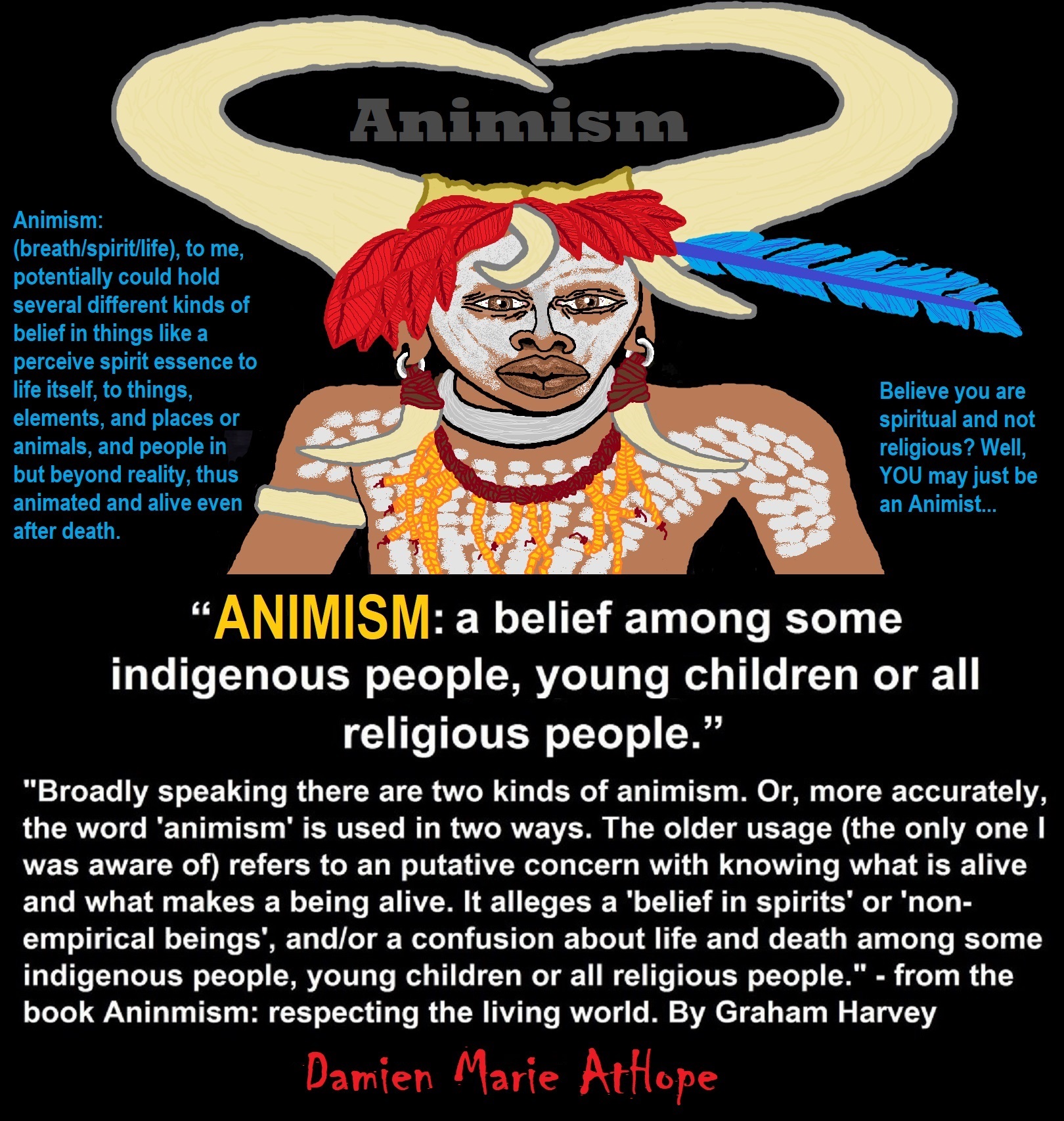
Animism: Respecting the Living World by Graham Harvey
“How have human cultures engaged with and thought about animals, plants, rocks, clouds, and other elements in their natural surroundings? Do animals and other natural objects have a spirit or soul? What is their relationship to humans? In this new study, Graham Harvey explores current and past animistic beliefs and practices of Native Americans, Maori, Aboriginal Australians, and eco-pagans. He considers the varieties of animism found in these cultures as well as their shared desire to live respectfully within larger natural communities. Drawing on his extensive casework, Harvey also considers the linguistic, performative, ecological, and activist implications of these different animisms.” ref
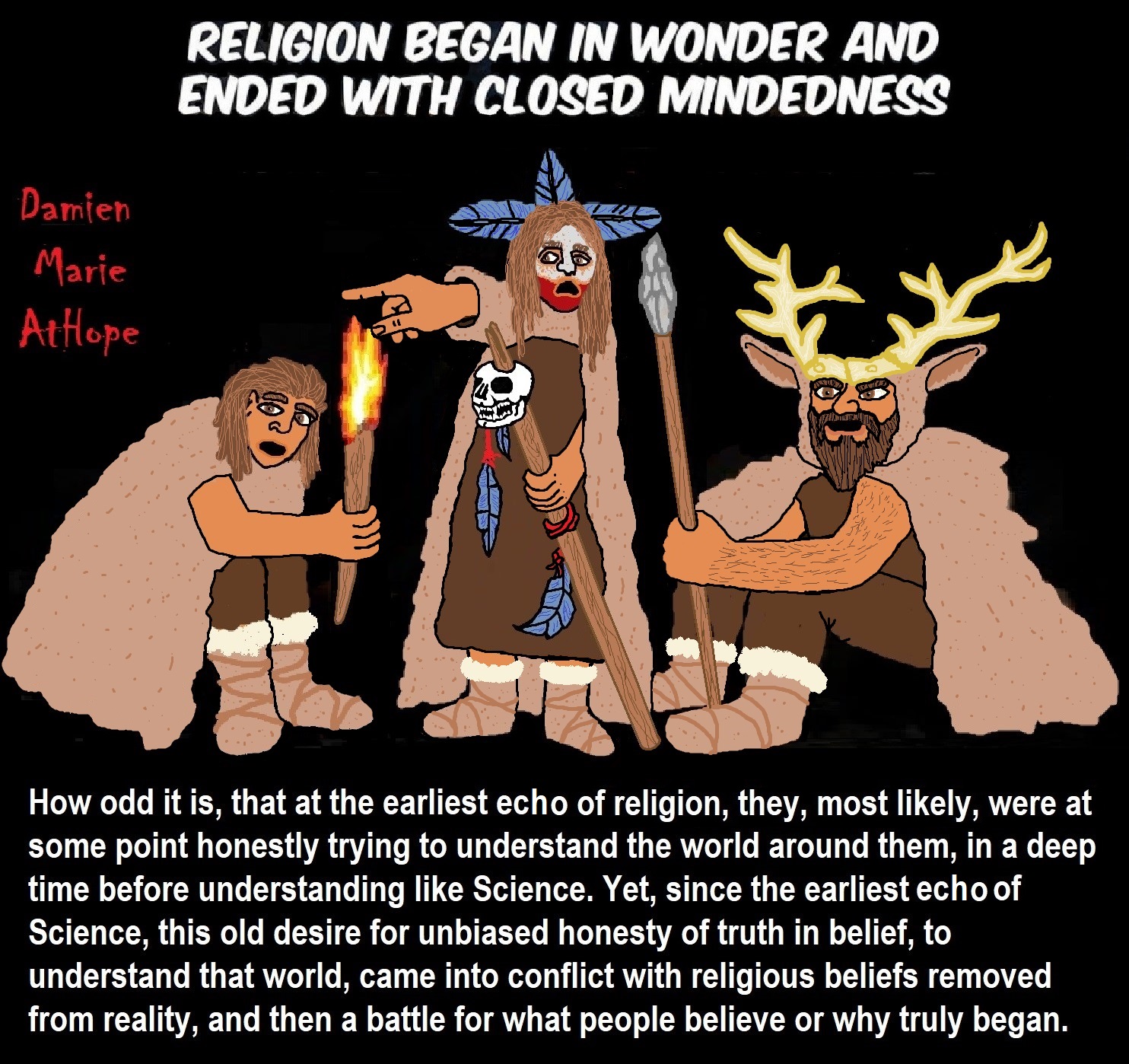


My thoughts on Religion Evolution with external links for more info:
- (Pre-Animism Africa mainly, but also Europe, and Asia at least 300,000 years ago), (Pre-Animism – Oxford Dictionaries)
- (Animism Africa around 100,000 years ago), (Animism – Britannica.com)
- (Totemism Europe around 50,000 years ago), (Totemism – Anthropology)
- (Shamanism Siberia around 30,000 years ago), (Shamanism – Britannica.com)
- (Paganism Turkey around 12,000 years ago), (Paganism – BBC Religion)
- (Progressed Organized Religion “Institutional Religion” Egypt around 5,000 years ago), (Ancient Egyptian Religion – Britannica.com)
- (CURRENT “World” RELIGIONS after 4,000 years ago) (Origin of Major Religions – Sacred Texts)
- (Early Atheistic Doubting at least by 2,600 years ago) (History of Atheism – Wikipedia)
“Religion is an Evolved Product” and Yes, Religion is Like Fear Given Wings…
Atheists talk about gods and religions for the same reason doctors talk about cancer, they are looking for a cure, or a firefighter talks about fires because they burn people and they care to stop them. We atheists too often feel a need to help the victims of mental slavery, held in the bondage that is the false beliefs of gods and the conspiracy theories of reality found in religions.
Understanding Religion Evolution:
- Pre-Animism (at least 300,000 years ago)
- Animism (Africa: 100,000 years ago)
- Totemism (Europe: 50,000 years ago)
- Shamanism (Siberia: 30,000 years ago)
- Paganism (Turkey: 12,000 years ago)
- Progressed organized religion (Egypt: 5,000 years ago), (Egypt, the First Dynasty 5,150 years ago)
- CURRENT “World” RELIGIONS (after 4,000 years ago)
- Early Atheistic Doubting (at least by 2,600 years ago)
“An Archaeological/Anthropological Understanding of Religion Evolution”
It seems ancient peoples had to survived amazing threats in a “dangerous universe (by superstition perceived as good and evil),” and human “immorality or imperfection of the soul” which was thought to affect the still living, leading to ancestor worship. This ancestor worship presumably led to the belief in supernatural beings, and then some of these were turned into the belief in gods. This feeble myth called gods were just a human conceived “made from nothing into something over and over, changing, again and again, taking on more as they evolve, all the while they are thought to be special,” but it is just supernatural animistic spirit-belief perceived as sacred.
Quick Evolution of Religion?
Pre-Animism (at least 300,000 years ago) pre-religion is a beginning that evolves into later Animism. So, Religion as we think of it, to me, all starts in a general way with Animism (Africa: 100,000 years ago) (theoretical belief in supernatural powers/spirits), then this is physically expressed in or with Totemism (Europe: 50,000 years ago) (theoretical belief in mythical relationship with powers/spirits through a totem item), which then enlists a full-time specific person to do this worship and believed interacting Shamanism (Siberia/Russia: 30,000 years ago) (theoretical belief in access and influence with spirits through ritual), and then there is the further employment of myths and gods added to all the above giving you Paganism (Turkey: 12,000 years ago) (often a lot more nature-based than most current top world religions, thus hinting to their close link to more ancient religious thinking it stems from). My hypothesis is expressed with an explanation of the building of a theatrical house (modern religions development). Progressed organized religion (Egypt: 5,000 years ago) with CURRENT “World” RELIGIONS (after 4,000 years ago).
Historically, in large city-state societies (such as Egypt or Iraq) starting around 5,000 years ago culminated to make religion something kind of new, a sociocultural-governmental-religious monarchy, where all or at least many of the people of such large city-state societies seem familiar with and committed to the existence of “religion” as the integrated life identity package of control dynamics with a fixed closed magical doctrine, but this juggernaut integrated religion identity package of Dogmatic-Propaganda certainly did not exist or if developed to an extent it was highly limited in most smaller prehistoric societies as they seem to lack most of the strong control dynamics with a fixed closed magical doctrine (magical beliefs could be at times be added or removed). Many people just want to see developed religious dynamics everywhere even if it is not. Instead, all that is found is largely fragments until the domestication of religion.
Religions, as we think of them today, are a new fad, even if they go back to around 6,000 years in the timeline of human existence, this amounts to almost nothing when seen in the long slow evolution of religion at least around 70,000 years ago with one of the oldest ritual worship. Stone Snake of South Africa: “first human worship” 70,000 years ago. This message of how religion and gods among them are clearly a man-made thing that was developed slowly as it was invented and then implemented peace by peace discrediting them all. Which seems to be a simple point some are just not grasping how devastating to any claims of truth when we can see the lie clearly in the archeological sites.
I wish people fought as hard for the actual values as they fight for the group/clan names political or otherwise they think support values. Every amount spent on war is theft to children in need of food or the homeless kept from shelter.
Here are several of my blog posts on history:
- To Find Truth You Must First Look
- (Magdalenian/Iberomaurusian) Connections to the First Paganists of the early Neolithic Near East Dating from around 17,000 to 12,000 Years Ago
- Natufians: an Ancient People at the Origins of Agriculture and Sedentary Life
- Possible Clan Leader/Special “MALE” Ancestor Totem Poles At Least 13,500 years ago?
- Jewish People with DNA at least 13,200 years old, Judaism, and the Origins of Some of its Ideas
- Baltic Reindeer Hunters: Swiderian, Lyngby, Ahrensburgian, and Krasnosillya cultures 12,020 to 11,020 years ago are evidence of powerful migratory waves during the last 13,000 years and a genetic link to Saami and the Finno-Ugric peoples.
- The Rise of Inequality: patriarchy and state hierarchy inequality
- Fertile Crescent 12,500 – 9,500 Years Ago: fertility and death cult belief system?
- 12,400 – 11,700 Years Ago – Kortik Tepe (Turkey) Pre/early-Agriculture Cultic Ritualism
- Ritualistic Bird Symbolism at Gobekli Tepe and its “Ancestor Cult”
- Male-Homosexual (female-like) / Trans-woman (female) Seated Figurine from Gobekli Tepe
- Could a 12,000-year-old Bull Geoglyph at Göbekli Tepe relate to older Bull and Female Art 25,000 years ago and Later Goddess and the Bull cults like Catal Huyuk?
- Sedentism and the Creation of goddesses around 12,000 years ago as well as male gods after 7,000 years ago.
- Alcohol, where Agriculture and Religion Become one? Such as Gobekli Tepe’s Ritualistic use of Grain as Food and Ritual Drink
- Neolithic Ritual Sites with T-Pillars and other Cultic Pillars
- Paganism: Goddesses around 12,000 years ago then Male Gods after 7,000 years ago
- First Patriarchy: Split of Women’s Status around 12,000 years ago & First Hierarchy: fall of Women’s Status around 5,000 years ago.
- Natufians: an Ancient People at the Origins of Agriculture and Sedentary Life
- J DNA and the Spread of Agricultural Religion (paganism)
- Paganism: an approximately 12,000-year-old belief system
- Paganism 12,000 years old: related to “Anarchism and Socialism” (Pre-Capitalism)
- Shaman burial in Israel 12,000 years ago and the Shamanism Phenomena
- Need to Mythicized: gods and goddesses
- 12,000 – 7,000 Years Ago – Paleo-Indian Culture (The Americas)
- 12,000 – 2,000 Years Ago – Indigenous-Scandinavians (Nordic)
- Norse did not wear helmets with horns?
- Pre-Pottery Neolithic Skull Cult around 11,500 to 8,400 Years Ago?
- 10,400 – 10,100 Years Ago, in Turkey the Nevail Cori Religious Settlement
- 9,000-6,500 Years Old Submerged Pre-Pottery/Pottery Neolithic Ritual Settlements off Israel’s Coast
- Catal Huyuk “first religious designed city” around 9,500 to 7,700 years ago (Turkey)
- Cultic Hunting at Catal Huyuk “first religious designed city”
- Special Items and Art as well as Special Elite Burials at Catal Huyuk
- New Rituals and Violence with the appearance of Pottery and People?
- Haplogroup N and its related Uralic Languages and Cultures
- Ainu people, Sámi people, Native Americans, the Ancient North Eurasians, and Paganistic-Shamanism with Totemism
- Ideas, Technology and People from Turkey, Europe, to China and Back again 9,000 to 5,000 years ago?
- First Pottery of Europe and the Related Cultures
- 9,000 years old Neolithic Artifacts Judean Desert and Hills Israel
- 9,000-7,000 years-old Sex and Death Rituals: Cult Sites in Israel, Jordan, and the Sinai
- 9,000-8500 year old Horned Female shaman Bad Dürrenberg Germany
- Neolithic Jewelry and the Spread of Farming in Europe Emerging out of West Turkey
- 8,600-year-old Tortoise Shells in Neolithic graves in central China have Early Writing and Shamanism
- Swing of the Mace: the rise of Elite, Forced Authority, and Inequality begin to Emerge 8,500 years ago?
- Migrations and Changing Europeans Beginning around 8,000 Years Ago
- My “Steppe-Anatolian-Kurgan hypothesis” 8,000/7,000 years ago
- Around 8,000-year-old Shared Idea of the Mistress of Animals, “Ritual” Motif
- Pre-Columbian Red-Paint (red ochre) Maritime Archaic Culture 8,000-3,000 years ago
- 7,522-6,522 years ago Linear Pottery culture which I think relates to Arcane Capitalism’s origins
- Arcane Capitalism: Primitive socialism, Primitive capital, Private ownership, Means of production, Market capitalism, Class discrimination, and Petite bourgeoisie (smaller capitalists)
- 7,500-4,750 years old Ritualistic Cucuteni-Trypillian culture of Moldova, Romania, and Ukraine
- Roots of a changing early society 7,200-6,700 years ago Jordan and Israel
- Agriculture religion (Paganism) with farming reached Britain between about 7,000 to 6,500 or so years ago and seemingly expressed in things like Western Europe’s Long Barrows
- My Thoughts on Possible Migrations of “R” DNA and Proto-Indo-European?
- “Millet” Spreading from China 7,022 years ago to Europe and related Language may have Spread with it leading to Proto-Indo-European
- Proto-Indo-European (PIE), ancestor of Indo-European languages: DNA, Society, Language, and Mythology
- The Dnieper–Donets culture and Asian varieties of Millet from China to the Black Sea region of Europe by 7,022 years ago
- Kurgan 6,000 years ago/dolmens 7,000 years ago: funeral, ritual, and other?
- 7,020 to 6,020-year-old Proto-Indo-European Homeland of Urheimat or proposed home of their Language and Religion
- Ancient Megaliths: Kurgan, Ziggurat, Pyramid, Menhir, Trilithon, Dolman, Kromlech, and Kromlech of Trilithons
- The Mytheme of Ancient North Eurasian Sacred-Dog belief and similar motifs are found in Indo-European, Native American, and Siberian comparative mythology
- Elite Power Accumulation: Ancient Trade, Tokens, Writing, Wealth, Merchants, and Priest-Kings
- Sacred Mounds, Mountains, Kurgans, and Pyramids may hold deep connections?
- Between 7,000-5,000 Years ago, rise of unequal hierarchy elite, leading to a “birth of the State” or worship of power, strong new sexism, oppression of non-elites, and the fall of Women’s equal status
- Paganism 7,000-5,000 years old: related to “Anarchism and Socialism” (Capitalism) (World War 0) Elite & their slaves
- Hell and Underworld mythologies starting maybe as far back as 7,000 to 5,000 years ago with the Proto-Indo-Europeans?
- The First Expression of the Male God around 7,000 years ago?
- White (light complexion skin) Bigotry and Sexism started 7,000 years ago?
- Around 7,000-year-old Shared Idea of the Divine Bird (Tutelary and/or Trickster spirit/deity), “Ritual” Motif
- Nekhbet an Ancient Egyptian Vulture Goddess and Tutelary Deity
- 6,720 to 4,920 years old Ritualistic Hongshan Culture of Inner Mongolia with 5,000-year-old Pyramid Mounds and Temples
- First proto-king in the Balkans, Varna culture around 6,500 years ago?
- 6,500–5,800 years ago in Israel Late Chalcolithic (Copper Age) Period in the Southern Levant Seems to Express Northern Levant Migrations, Cultural and Religious Transfer
- KING OF BEASTS: Master of Animals “Ritual” Motif, around 6,000 years old or older…
- Around 6000-year-old Shared Idea of the Solid Wheel & the Spoked Wheel-Shaped Ritual Motif
- “The Ghassulian Star,” a mysterious 6,000-year-old mural from Jordan; a Proto-Star of Ishtar, Star of Inanna or Star of Venus?
- Religious/Ritual Ideas, including goddesses and gods as well as ritual mounds or pyramids from Northeastern Asia at least 6,000 years old, seemingly filtering to Iran, Iraq, the Mediterranean, Europe, Egypt, and the Americas?
- Maykop (5,720–5,020 years ago) Caucasus region Bronze Age culture-related to Copper Age farmers from the south, influenced by the Ubaid period and Leyla-Tepe culture, as well as influencing the Kura-Araxes culture
- 5-600-year-old Tomb, Mummy, and First Bearded Male Figurine in a Grave
- Kura-Araxes Cultural 5,520 to 4,470 years old DNA traces to the Canaanites, Arabs, and Jews
- Minoan/Cretan (Keftiu) Civilization and Religion around 5,520 to 3,120 years ago
- Evolution Of Science at least by 5,500 years ago
- 5,500 Years old birth of the State, the rise of Hierarchy, and the fall of Women’s status
- “Jiroft culture” 5,100 – 4,200 years ago and the History of Iran
- Stonehenge: Paganistic Burial and Astrological Ritual Complex, England (5,100-3,600 years ago)
- Around 5,000-year-old Shared Idea of the “Tree of Life” Ritual Motif
- Complex rituals for elite, seen from China to Egypt, at least by 5,000 years ago
- Around 5,000 years ago: “Birth of the State” where Religion gets Military Power and Influence
- The Center of the World “Axis Mundi” and/or “Sacred Mountains” Mythology Could Relate to the Altai Mountains, Heart of the Steppe
- Progressed organized religion starts, an approximately 5,000-year-old belief system
- China’s Civilization between 5,000-3,000 years ago, was a time of war and class struggle, violent transition from free clans to a Slave or Elite society
- Origin of Logics is Naturalistic Observation at least by around 5,000 years ago.
- Paganism 5,000 years old: progressed organized religion and the state: related to “Anarchism and Socialism” (Kings and the Rise of the State)
- Ziggurats (multi-platform temples: 4,900 years old) to Pyramids (multi-platform tombs: 4,700 years old)
- Did a 4,520–4,420-year-old Volcano In Turkey Inspire the Bible God?
- Finland’s Horned Shaman and Pre-Horned-God at least 4,500 years ago?
- 4,000-year-Old Dolmens in Israel: A Connected Dolmen Religious Phenomenon?
- Creation myths: From chaos, Ex nihilo, Earth-diver, Emergence, World egg, and World parent
- Bronze Age “Ritual” connections of the Bell Beaker culture with the Corded Ware/Single Grave culture, which were related to the Yamnaya culture and Proto-Indo-European Languages/Religions
- Low Gods (Earth/ Tutelary deity), High Gods (Sky/Supreme deity), and Moralistic Gods (Deity enforcement/divine order)
- The exchange of people, ideas, and material-culture including, to me, the new god (Sky Father) and goddess (Earth Mother) religion between the Cucuteni-Trypillians and others which is then spread far and wide
- Koryaks: Indigenous People of the Russian Far East and Big Raven myths also found in Tlingit, Haida, Tsimshian, and other Indigenous People of North America
- 42 Principles Of Maat (Egyptian Goddess of the justice) around 4,400 years ago, 2000 Years Before Ten Commandments
- “Happy Easter” Well Happy Eostre/Ishter
- 4,320-3,820 years old “Shimao” (North China) site with Totemistic-Shamanistic Paganism and a Stepped Pyramid
- 4,250 to 3,400 Year old Stonehenge from Russia: Arkaim?
- 4,100-year-old beaker with medicinal & flowering plants in a grave of a woman in Scotland
- Early European Farmer ancestry, Kelif el Boroud people with the Cardial Ware culture, and the Bell Beaker culture Paganists too, spread into North Africa, then to the Canary Islands off West Africa
- Flood Accounts: Gilgamesh epic (4,100 years ago) Noah in Genesis (2,600 years ago)
- Paganism 4,000 years old: related to “Anarchism and Socialism” (First Moralistic gods, then the Origin time of Monotheism)
- When was the beginning: TIMELINE OF CURRENT RELIGIONS, which start around 4,000 years ago.
- Early Religions Thought to Express Proto-Monotheistic Systems around 4,000 years ago
- Kultepe? An archaeological site with a 4,000 years old women’s rights document.
- Single God Religions (Monotheism) = “Man-o-theism” started around 4,000 years ago with the Great Sky Spirit/God Tiān (天)?
- Confucianism’s Tiān (Shangdi god 4,000 years old): Supernaturalism, Pantheism or Theism?
- Yes, Your Male God is Ridiculous
- Mythology, a Lunar Deity is a Goddess or God of the Moon
- Sacred Land, Hills, and Mountains: Sami Mythology (Paganistic Shamanism)
- Horse Worship/Sacrifice: mythical union of Ruling Elite/Kingship and the Horse
- The Amorite/Amurru people’s God Amurru “Lord of the Steppe”, relates to the Origins of the Bible God?
- Bronze Age Exotic Trade Routes Spread Quite Far as well as Spread Religious Ideas with Them
- Sami and the Northern Indigenous Peoples Landscape, Language, and its Connection to Religion
- Prototype of Ancient Analemmatic Sundials around 3,900-3,150 years ago and a Possible Solar Connection to gods?
- Judaism is around 3,450 or 3,250 years old. (“Paleo-Hebrew” 3,000 years ago and Torah 2,500 years ago)
- The Weakening of Ancient Trade and the Strengthening of Religions around 3000 years ago?
- Are you aware that there are religions that worship women gods, explain now religion tears women down?
- Animistic, Totemistic, and Paganistic Superstition Origins of bible god and the bible’s Religion.
- Myths and Folklore: “Trickster gods and goddesses”
- Jews, Judaism, and the Origins of Some of its Ideas
- An Old Branch of Religion Still Giving Fruit: Sacred Trees
- Dating the BIBLE: naming names and telling times (written less than 3,000 years ago, provable to 2,200 years ago)
- Did a Volcano Inspire the bible god?
- The Amorite/Amurru people’s God Amurru “Lord of the Steppe”, relates to the Origins of the Bible God?
- Dené–Yeniseian language, Old Copper Complex, and Pre-Columbian Mound Builders?
- No “dinosaurs and humans didn’t exist together just because some think they are in the bible itself”
- Sacred Shit and Sacred Animals?
- Everyone Killed in the Bible Flood? “Nephilim” (giants)?
- Hey, Damien dude, I have a question for you regarding “the bible” Exodus.
- Archaeology Disproves the Bible
- Bible Battle, Just More, Bible Babble
- The Jericho Conquest lie?
- Canaanites and Israelites?
- Accurate Account on how did Christianity Began?
- Let’s talk about Christianity.
- So the 10 commandments isn’t anything to go by either right?
- Misinformed christian
- Debunking Jesus?
- Paulism vs Jesus
- Ok, you seem confused so let’s talk about Buddhism.
- Unacknowledged Buddhism: Gods, Savior, Demons, Rebirth, Heavens, Hells, and Terrorism
- His Foolishness The Dalai Lama
- Yin and Yang is sexist with an ORIGIN around 2,300 years ago?
- I Believe Archaeology, not Myths & Why Not, as the Religious Myths Already Violate Reason!
- Archaeological, Scientific, & Philosophic evidence shows the god myth is man-made nonsense.
- Aquatic Ape Theory/Hypothesis? As Always, Just Pseudoscience.
- Ancient Aliens Conspiracy Theorists are Pseudohistorians
- The Pseudohistoric and Pseudoscientific claims about “Bakoni Ruins” of South Africa
- Why do people think Religion is much more than supernaturalism and superstitionism?
- Religion is an Evolved Product
- Was the Value of Ancient Women Different?
- 1000 to 1100 CE, human sacrifice Cahokia Mounds a pre-Columbian Native American site
- Feminist atheists as far back as the 1800s?
- Promoting Religion as Real is Mentally Harmful to a Flourishing Humanity
- Screw All Religions and Their Toxic lies, they are all fraud
- Forget Religions’ Unfounded Myths, I Have Substantiated “Archaeology Facts.”
- Religion Dispersal throughout the World
- I Hate Religion Just as I Hate all Pseudoscience
- Exposing Scientology, Eckankar, Wicca and Other Nonsense?
- Main deity or religious belief systems
- Quit Trying to Invent Your God From the Scraps of Science.
- Archaeological, Scientific, & Philosophic evidence shows the god myth is man-made nonsense.
- Ancient Alien Conspiracy Theorists: Misunderstanding, Rhetoric, Misinformation, Fabrications, and Lies
- Misinformation, Distortion, and Pseudoscience in Talking with a Christian Creationist
- Judging the Lack of Goodness in Gods, Even the Norse God Odin
- Challenging the Belief in God-like Aliens and Gods in General
- A Challenge to Christian use of Torture Devices?
- Yes, Hinduism is a Religion
- Trump is One of the Most Reactionary Forces of Far-right Christian Extremism
- Was the Bull Head a Symbol of God? Yes!
- Primate Death Rituals
- Christian – “God and Christianity are objectively true”
- Australopithecus afarensis Death Ritual?
- You Claim Global Warming is a Hoax?
- Doubter of Science and Defamer of Atheists?
- I think that sounds like the Bible?
- History of the Antifa (“anti-fascist”) Movements
- Indianapolis Anti-Blasphemy Laws #Free Soheil Rally
- Damien, you repeat the golden rule in so many forms then you say religion is dogmatic?
- Science is a Trustable Methodology whereas Faith is not Trustable at all!
- Was I ever a believer, before I was an atheist?
- Atheists rise in reason
- Mistrust of science?
- Open to Talking About the Definition of ‘God’? But first, we address Faith.
- ‘United Monarchy’ full of splendor and power – Saul, David, and Solomon? Most likely not.
- Is there EXODUS ARCHAEOLOGY? The short answer is “no.”
- Lacking Proof of Bigfoots, Unicorns, and Gods is Just a Lack of Research?
- Religion and Politics: Faith Beliefs vs. Rational Thinking
- Hammer of Truth that lying pig RELIGION: challenged by an archaeologist
- “The Hammer of Truth” -ontology question- What do You Mean by That?
- Navigation of a bad argument: Ad Hominem vs. Attack
- Why is it Often Claimed that Gods have a Gender?
- Why are basically all monotheistic religions ones that have a male god?
- Shifting through the Claims in support of Faith
- Dear Mr. AtHope, The 20th Century is an Indictment of Secularism and a Failed Atheist Century
- An Understanding of the Worldwide Statistics and Dynamics of Terrorist Incidents and Suicide Attacks
- Intoxication and Evolution? Addressing and Assessing the “Stoned Ape” or “Drunken Monkey” Theories as Catalysts in Human Evolution
- Sacred Menstrual cloth? Inanna’s knot, Isis knot, and maybe Ma’at’s feather?
- Damien, why don’t the Hebrews accept the bible stories?
- Dealing with a Troll and Arguing Over Word Meaning
- Knowledge without Belief? Justified beliefs or disbeliefs worthy of Knowledge?
- Afrocentrism and African Religions
- Crecganford @crecganford offers history & stories of the people, places, gods, & culture
- Empiricism-Denier?
I am not an academic. I am a revolutionary that teaches in public, in places like social media, and in the streets. I am not a leader by some title given but from my commanding leadership style of simply to start teaching everywhere to everyone, all manner of positive education.
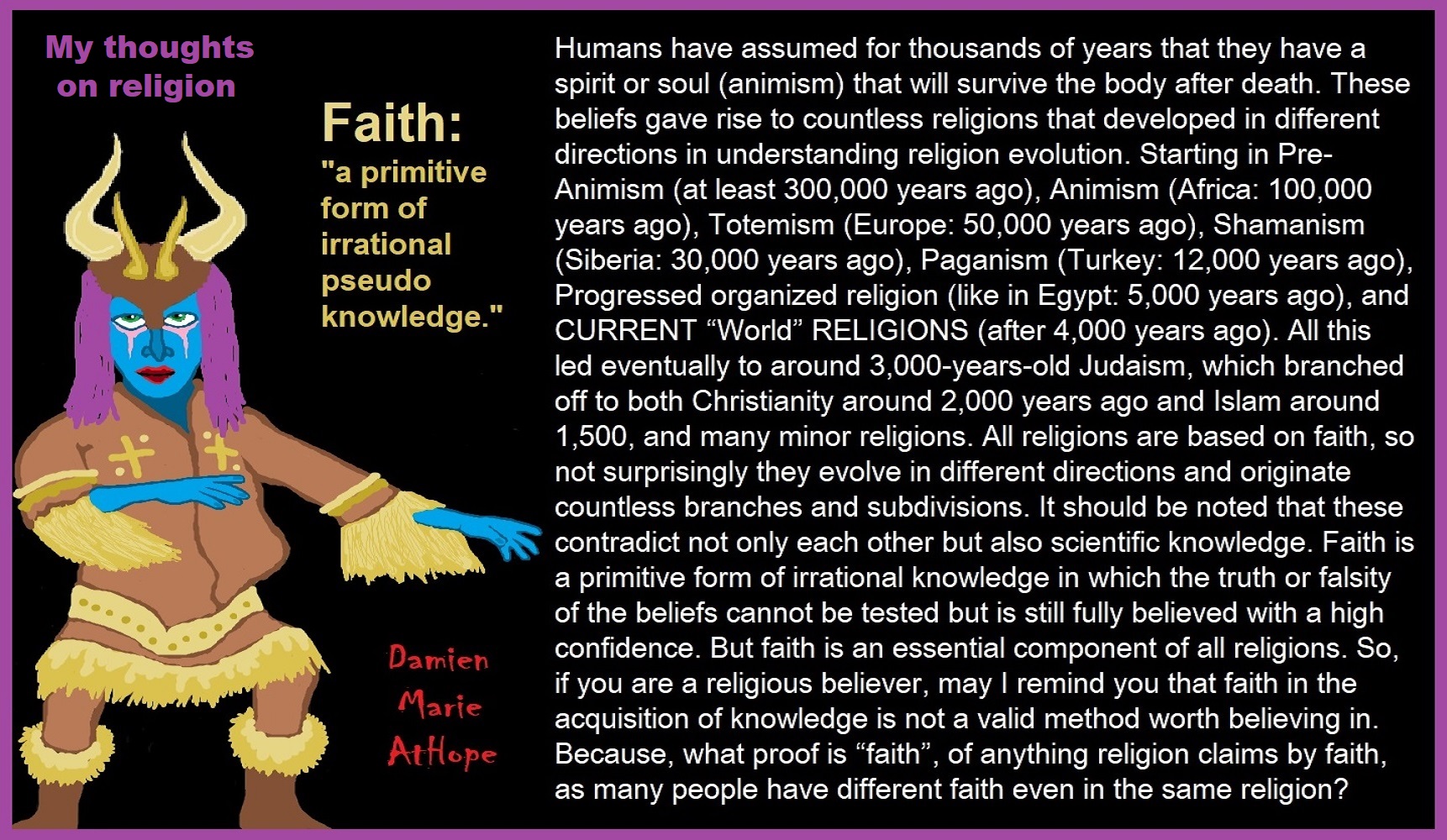

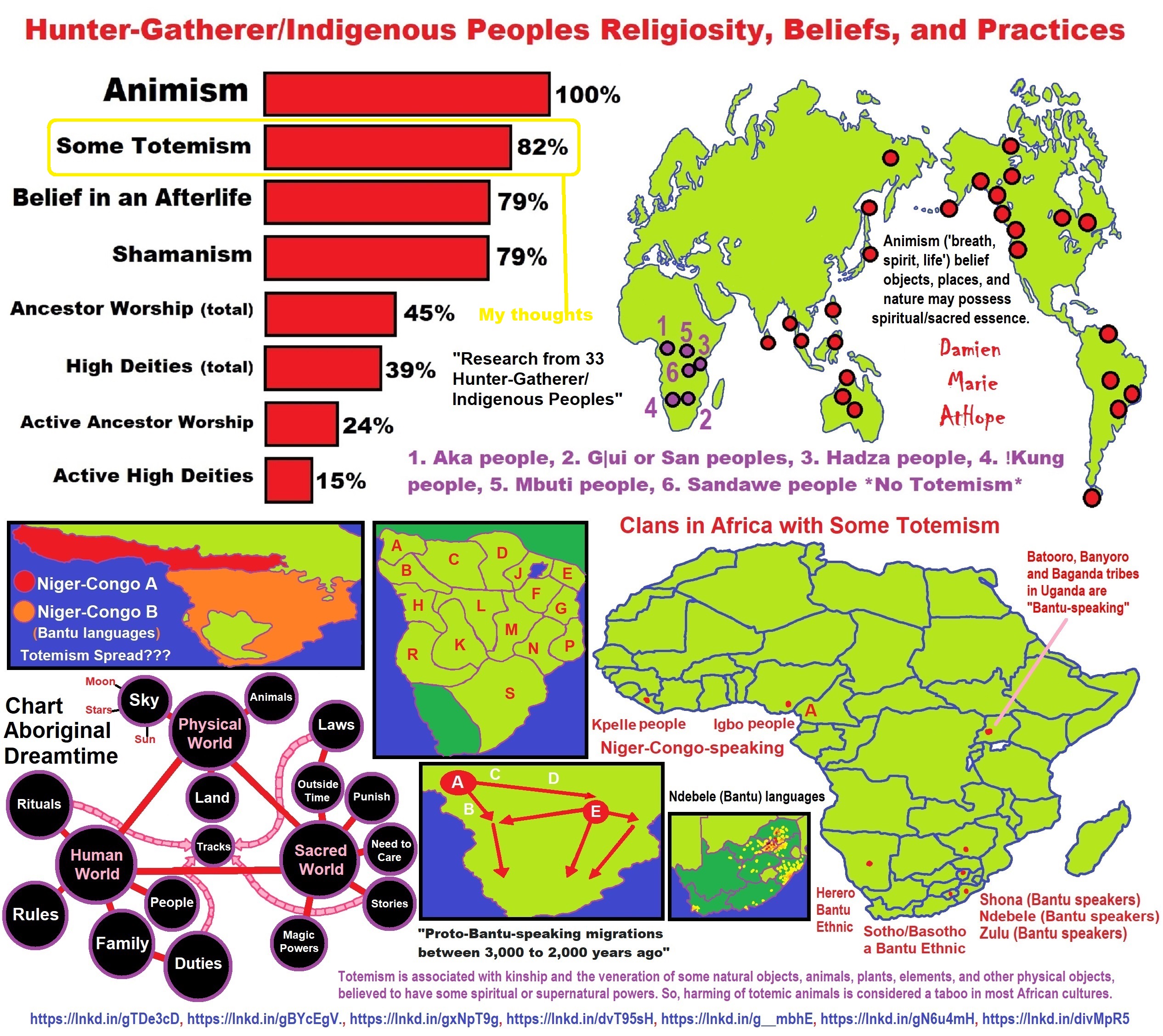
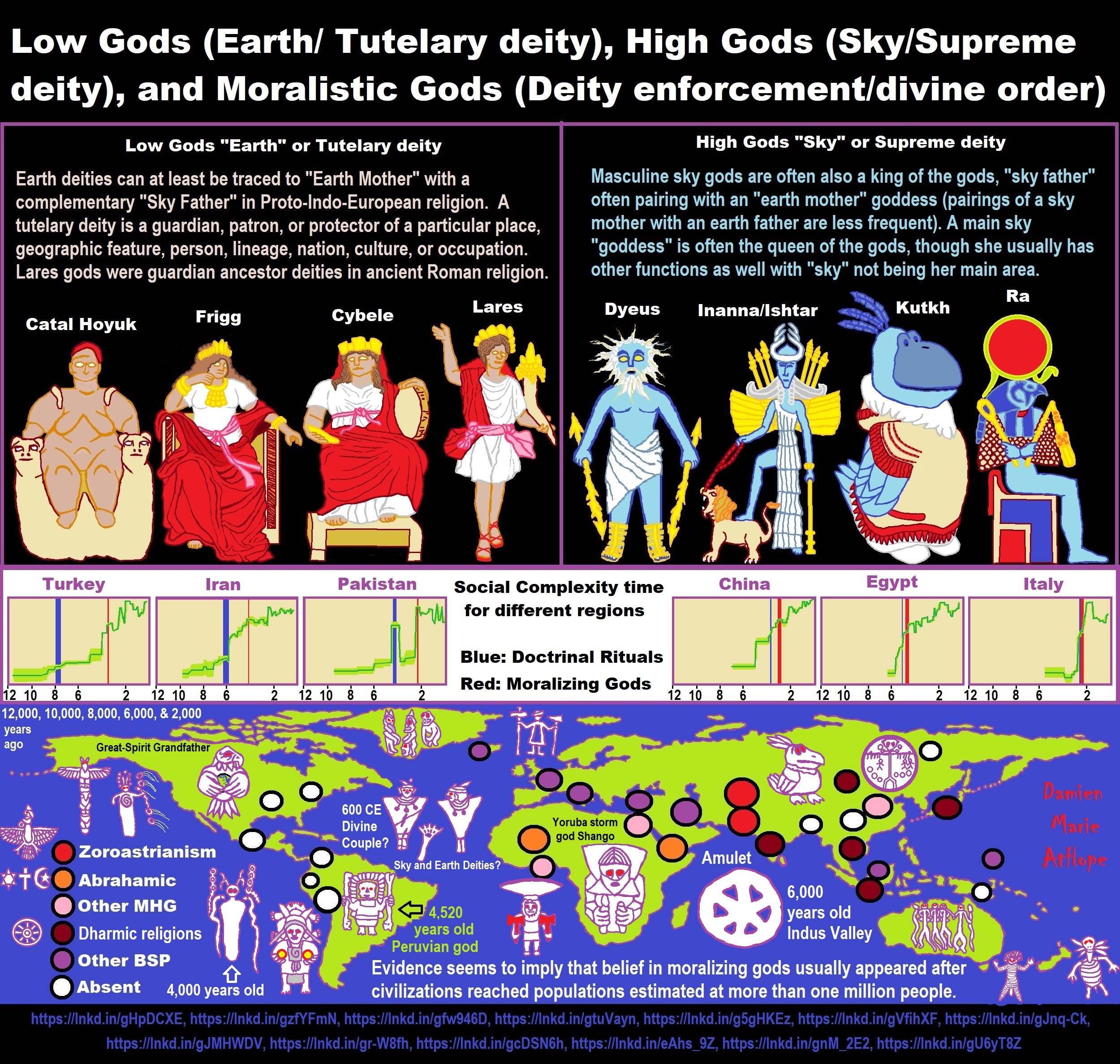
ref, ref, ref, ref, ref, ref, ref, ref, ref, ref, ref, ref, ref, ref, ref, ref, ref, ref, ref, ref, ref
Low Gods “Earth” or Tutelary deity and High Gods “Sky” or Supreme deity
“An Earth goddess is a deification of the Earth. Earth goddesses are often associated with the “chthonic” deities of the underworld. Ki and Ninhursag are Mesopotamian earth goddesses. In Greek mythology, the Earth is personified as Gaia, corresponding to Roman Terra, Indic Prithvi/Bhūmi, etc. traced to an “Earth Mother” complementary to the “Sky Father” in Proto-Indo-European religion. Egyptian mythology exceptionally has a sky goddess and an Earth god.” ref
“A mother goddess is a goddess who represents or is a personification of nature, motherhood, fertility, creation, destruction or who embodies the bounty of the Earth. When equated with the Earth or the natural world, such goddesses are sometimes referred to as Mother Earth or as the Earth Mother. In some religious traditions or movements, Heavenly Mother (also referred to as Mother in Heaven or Sky Mother) is the wife or feminine counterpart of the Sky father or God the Father.” ref
“Any masculine sky god is often also king of the gods, taking the position of patriarch within a pantheon. Such king gods are collectively categorized as “sky father” deities, with a polarity between sky and earth often being expressed by pairing a “sky father” god with an “earth mother” goddess (pairings of a sky mother with an earth father are less frequent). A main sky goddess is often the queen of the gods and may be an air/sky goddess in her own right, though she usually has other functions as well with “sky” not being her main. In antiquity, several sky goddesses in ancient Egypt, Mesopotamia, and the Near East were called Queen of Heaven. Neopagans often apply it with impunity to sky goddesses from other regions who were never associated with the term historically. The sky often has important religious significance. Many religions, both polytheistic and monotheistic, have deities associated with the sky.” ref
“In comparative mythology, sky father is a term for a recurring concept in polytheistic religions of a sky god who is addressed as a “father”, often the father of a pantheon and is often either a reigning or former King of the Gods. The concept of “sky father” may also be taken to include Sun gods with similar characteristics, such as Ra. The concept is complementary to an “earth mother“. “Sky Father” is a direct translation of the Vedic Dyaus Pita, etymologically descended from the same Proto-Indo-European deity name as the Greek Zeûs Pater and Roman Jupiter and Germanic Týr, Tir or Tiwaz, all of which are reflexes of the same Proto-Indo-European deity’s name, *Dyēus Ph₂tḗr. While there are numerous parallels adduced from outside of Indo-European mythology, there are exceptions (e.g. In Egyptian mythology, Nut is the sky mother and Geb is the earth father).” ref
Tutelary deity
“A tutelary (also tutelar) is a deity or spirit who is a guardian, patron, or protector of a particular place, geographic feature, person, lineage, nation, culture, or occupation. The etymology of “tutelary” expresses the concept of safety and thus of guardianship. In late Greek and Roman religion, one type of tutelary deity, the genius, functions as the personal deity or daimon of an individual from birth to death. Another form of personal tutelary spirit is the familiar spirit of European folklore.” ref
“A tutelary (also tutelar) in Korean shamanism, jangseung and sotdae were placed at the edge of villages to frighten off demons. They were also worshiped as deities. Seonangshin is the patron deity of the village in Korean tradition and was believed to embody the Seonangdang. In Philippine animism, Diwata or Lambana are deities or spirits that inhabit sacred places like mountains and mounds and serve as guardians. Such as: Maria Makiling is the deity who guards Mt. Makiling and Maria Cacao and Maria Sinukuan. In Shinto, the spirits, or kami, which give life to human bodies come from nature and return to it after death. Ancestors are therefore themselves tutelaries to be worshiped. And similarly, Native American beliefs such as Tonás, tutelary animal spirit among the Zapotec and Totems, familial or clan spirits among the Ojibwe, can be animals.” ref
“A tutelary (also tutelar) in Austronesian beliefs such as: Atua (gods and spirits of the Polynesian peoples such as the Māori or the Hawaiians), Hanitu (Bunun of Taiwan‘s term for spirit), Hyang (Kawi, Sundanese, Javanese, and Balinese Supreme Being, in ancient Java and Bali mythology and this spiritual entity, can be either divine or ancestral), Kaitiaki (New Zealand Māori term used for the concept of guardianship, for the sky, the sea, and the land), Kawas (mythology) (divided into 6 groups: gods, ancestors, souls of the living, spirits of living things, spirits of lifeless objects, and ghosts), Tiki (Māori mythology, Tiki is the first man created by either Tūmatauenga or Tāne and represents deified ancestors found in most Polynesian cultures). ” ref, ref, ref, ref, ref, ref, ref
Mesopotamian Tutelary Deities can be seen as ones related to City-States
“Historical city-states included Sumerian cities such as Uruk and Ur; Ancient Egyptian city-states, such as Thebes and Memphis; the Phoenician cities (such as Tyre and Sidon); the five Philistine city-states; the Berber city-states of the Garamantes; the city-states of ancient Greece (the poleis such as Athens, Sparta, Thebes, and Corinth); the Roman Republic (which grew from a city-state into a vast empire); the Italian city-states from the Middle Ages to the early modern period, such as Florence, Siena, Ferrara, Milan (which as they grew in power began to dominate neighboring cities) and Genoa and Venice, which became powerful thalassocracies; the Mayan and other cultures of pre-Columbian Mesoamerica (including cities such as Chichen Itza, Tikal, Copán and Monte Albán); the central Asian cities along the Silk Road; the city-states of the Swahili coast; Ragusa; states of the medieval Russian lands such as Novgorod and Pskov; and many others.” ref
“The Uruk period (ca. 4000 to 3100 BCE; also known as Protoliterate period) of Mesopotamia, named after the Sumerian city of Uruk, this period saw the emergence of urban life in Mesopotamia and the Sumerian civilization. City-States like Uruk and others had a patron tutelary City Deity along with a Priest-King.” ref
“Chinese folk religion, both past, and present, includes myriad tutelary deities. Exceptional individuals, highly cultivated sages, and prominent ancestors can be deified and honored after death. Lord Guan is the patron of military personnel and police, while Mazu is the patron of fishermen and sailors. Such as Tu Di Gong (Earth Deity) is the tutelary deity of a locality, and each individual locality has its own Earth Deity and Cheng Huang Gong (City God) is the guardian deity of an individual city, worshipped by local officials and locals since imperial times.” ref
“A tutelary (also tutelar) in Hinduism, personal tutelary deities are known as ishta-devata, while family tutelary deities are known as Kuladevata. Gramadevata are guardian deities of villages. Devas can also be seen as tutelary. Shiva is the patron of yogis and renunciants. City goddesses include: Mumbadevi (Mumbai), Sachchika (Osian); Kuladevis include: Ambika (Porwad), and Mahalakshmi. In NorthEast India Meitei mythology and religion (Sanamahism) of Manipur, there are various types of tutelary deities, among which Lam Lais are the most predominant ones. Tibetan Buddhism has Yidam as a tutelary deity. Dakini is the patron of those who seek knowledge.” ref
“A tutelary (also tutelar) The Greeks also thought deities guarded specific places: for instance, Athena was the patron goddess of the city of Athens. Socrates spoke of hearing the voice of his personal spirit or daimonion:
You have often heard me speak of an oracle or sign which comes to me … . This sign I have had ever since I was a child. The sign is a voice which comes to me and always forbids me to do something which I am going to do, but never commands me to do anything, and this is what stands in the way of my being a politician.” ref
“Tutelary deities who guard and preserve a place or a person are fundamental to ancient Roman religion. The tutelary deity of a man was his Genius, that of a woman her Juno. In the Imperial era, the Genius of the Emperor was a focus of Imperial cult. An emperor might also adopt a major deity as his personal patron or tutelary, as Augustus did Apollo. Precedents for claiming the personal protection of a deity were established in the Republican era, when for instance the Roman dictator Sulla advertised the goddess Victory as his tutelary by holding public games (ludi) in her honor.” ref
“Each town or city had one or more tutelary deities, whose protection was considered particularly vital in time of war and siege. Rome itself was protected by a goddess whose name was to be kept ritually secret on pain of death (for a supposed case, see Quintus Valerius Soranus). The Capitoline Triad of Juno, Jupiter, and Minerva were also tutelaries of Rome. The Italic towns had their own tutelary deities. Juno often had this function, as at the Latin town of Lanuvium and the Etruscan city of Veii, and was often housed in an especially grand temple on the arx (citadel) or other prominent or central location. The tutelary deity of Praeneste was Fortuna, whose oracle was renowned.” ref
“The Roman ritual of evocatio was premised on the belief that a town could be made vulnerable to military defeat if the power of its tutelary deity were diverted outside the city, perhaps by the offer of superior cult at Rome. The depiction of some goddesses such as the Magna Mater (Great Mother, or Cybele) as “tower-crowned” represents their capacity to preserve the city. A town in the provinces might adopt a deity from within the Roman religious sphere to serve as its guardian, or syncretize its own tutelary with such; for instance, a community within the civitas of the Remi in Gaul adopted Apollo as its tutelary, and at the capital of the Remi (present-day Rheims), the tutelary was Mars Camulus.” ref
Household deity (a kind of or related to a Tutelary deity)
“A household deity is a deity or spirit that protects the home, looking after the entire household or certain key members. It has been a common belief in paganism as well as in folklore across many parts of the world. Household deities fit into two types; firstly, a specific deity – typically a goddess – often referred to as a hearth goddess or domestic goddess who is associated with the home and hearth, such as the ancient Greek Hestia.” ref
“The second type of household deities are those that are not one singular deity, but a type, or species of animistic deity, who usually have lesser powers than major deities. This type was common in the religions of antiquity, such as the Lares of ancient Roman religion, the Gashin of Korean shamanism, and Cofgodas of Anglo-Saxon paganism. These survived Christianisation as fairy-like creatures existing in folklore, such as the Anglo-Scottish Brownie and Slavic Domovoy.” ref
“Household deities were usually worshipped not in temples but in the home, where they would be represented by small idols (such as the teraphim of the Bible, often translated as “household gods” in Genesis 31:19 for example), amulets, paintings, or reliefs. They could also be found on domestic objects, such as cosmetic articles in the case of Tawaret. The more prosperous houses might have a small shrine to the household god(s); the lararium served this purpose in the case of the Romans. The gods would be treated as members of the family and invited to join in meals, or be given offerings of food and drink.” ref
“In many religions, both ancient and modern, a god would preside over the home. Certain species, or types, of household deities, existed. An example of this was the Roman Lares. Many European cultures retained house spirits into the modern period. Some examples of these include:
- Brownie (Scotland and England) or Hob (England) / Kobold (Germany) / Goblin / Hobgoblin
- Domovoy (Slavic)
- Nisse (Norwegian or Danish) / Tomte (Swedish) / Tonttu (Finnish)
- Húsvættir (Norse)” ref
“Although the cosmic status of household deities was not as lofty as that of the Twelve Olympians or the Aesir, they were also jealous of their dignity and also had to be appeased with shrines and offerings, however humble. Because of their immediacy they had arguably more influence on the day-to-day affairs of men than the remote gods did. Vestiges of their worship persisted long after Christianity and other major religions extirpated nearly every trace of the major pagan pantheons. Elements of the practice can be seen even today, with Christian accretions, where statues to various saints (such as St. Francis) protect gardens and grottos. Even the gargoyles found on older churches, could be viewed as guardians partitioning a sacred space.” ref
“For centuries, Christianity fought a mop-up war against these lingering minor pagan deities, but they proved tenacious. For example, Martin Luther‘s Tischreden have numerous – quite serious – references to dealing with kobolds. Eventually, rationalism and the Industrial Revolution threatened to erase most of these minor deities, until the advent of romantic nationalism rehabilitated them and embellished them into objects of literary curiosity in the 19th century. Since the 20th century this literature has been mined for characters for role-playing games, video games, and other fantasy personae, not infrequently invested with invented traits and hierarchies somewhat different from their mythological and folkloric roots.” ref
“In contradistinction to both Herbert Spencer and Edward Burnett Tylor, who defended theories of animistic origins of ancestor worship, Émile Durkheim saw its origin in totemism. In reality, this distinction is somewhat academic, since totemism may be regarded as a particularized manifestation of animism, and something of a synthesis of the two positions was attempted by Sigmund Freud. In Freud’s Totem and Taboo, both totem and taboo are outward expressions or manifestations of the same psychological tendency, a concept which is complementary to, or which rather reconciles, the apparent conflict. Freud preferred to emphasize the psychoanalytic implications of the reification of metaphysical forces, but with particular emphasis on its familial nature. This emphasis underscores, rather than weakens, the ancestral component.” ref
“William Edward Hearn, a noted classicist, and jurist, traced the origin of domestic deities from the earliest stages as an expression of animism, a belief system thought to have existed also in the neolithic, and the forerunner of Indo-European religion. In his analysis of the Indo-European household, in Chapter II “The House Spirit”, Section 1, he states:
The belief which guided the conduct of our forefathers was … the spirit rule of dead ancestors.” ref
“In Section 2 he proceeds to elaborate:
It is thus certain that the worship of deceased ancestors is a vera causa, and not a mere hypothesis. …
In the other European nations, the Slavs, the Teutons, and the Kelts, the House Spirit appears with no less distinctness. … [T]he existence of that worship does not admit of doubt. … The House Spirits had a multitude of other names which it is needless here to enumerate, but all of which are more or less expressive of their friendly relations with man. … In [England] … [h]e is the Brownie. … In Scotland this same Brownie is well known. He is usually described as attached to particular families, with whom he has been known to reside for centuries, threshing the corn, cleaning the house, and performing similar household tasks. His favorite gratification was milk and honey.” ref



ref, ref, ref, ref, ref, ref, ref
Trialetian culture (16,000–8000 years ago) the Caucasus, Iran, and Turkey, likely involved in Göbekli Tepe. Migration 1?
Haplogroup R possible time of origin about 27,000 years in Central Asia, South Asia, or Siberia:
- Mal’ta–Buret’ culture (24,000-15,000 years ago)
- Afontova Gora culture (21,000-12,000 years ago)
- Trialetian culture (16,000–8000 years ago)
- Samara culture (7,000-6,500 years ago)
- Khvalynsk culture (7,000-6,500 years ago)
- Afanasievo culture (5,300-4,500 years ago)
- Yamna/Yamnaya Culture (5,300-4,500 years ago)
- Andronovo culture (4,000–2,900 years ago) ref
Trialetian sites
Caucasus and Transcaucasia:
- Edzani (Georgia)
- Chokh (Azerbaijan), layers E-C200
- Kotias Klde, layer B” ref
Eastern Anatolia:
- Hallan Çemi (from ca. 8.6-8.5k BC to 7.6-7.5k BCE)
- Nevali Çori shows some Trialetian admixture in a PPNB context” ref
Trialetian influences can also be found in:
- Cafer Höyük
- Boy Tepe” ref
Southeast of the Caspian Sea:
- Hotu (Iran)
- Ali Tepe (Iran) (from cal. 10,500 to 8,870 BCE)
- Belt Cave (Iran), layers 28-11 (the last remains date from ca. 6,000 BCE)
- Dam-Dam-Cheshme II (Turkmenistan), layers7,000-3,000 BCE)” ref
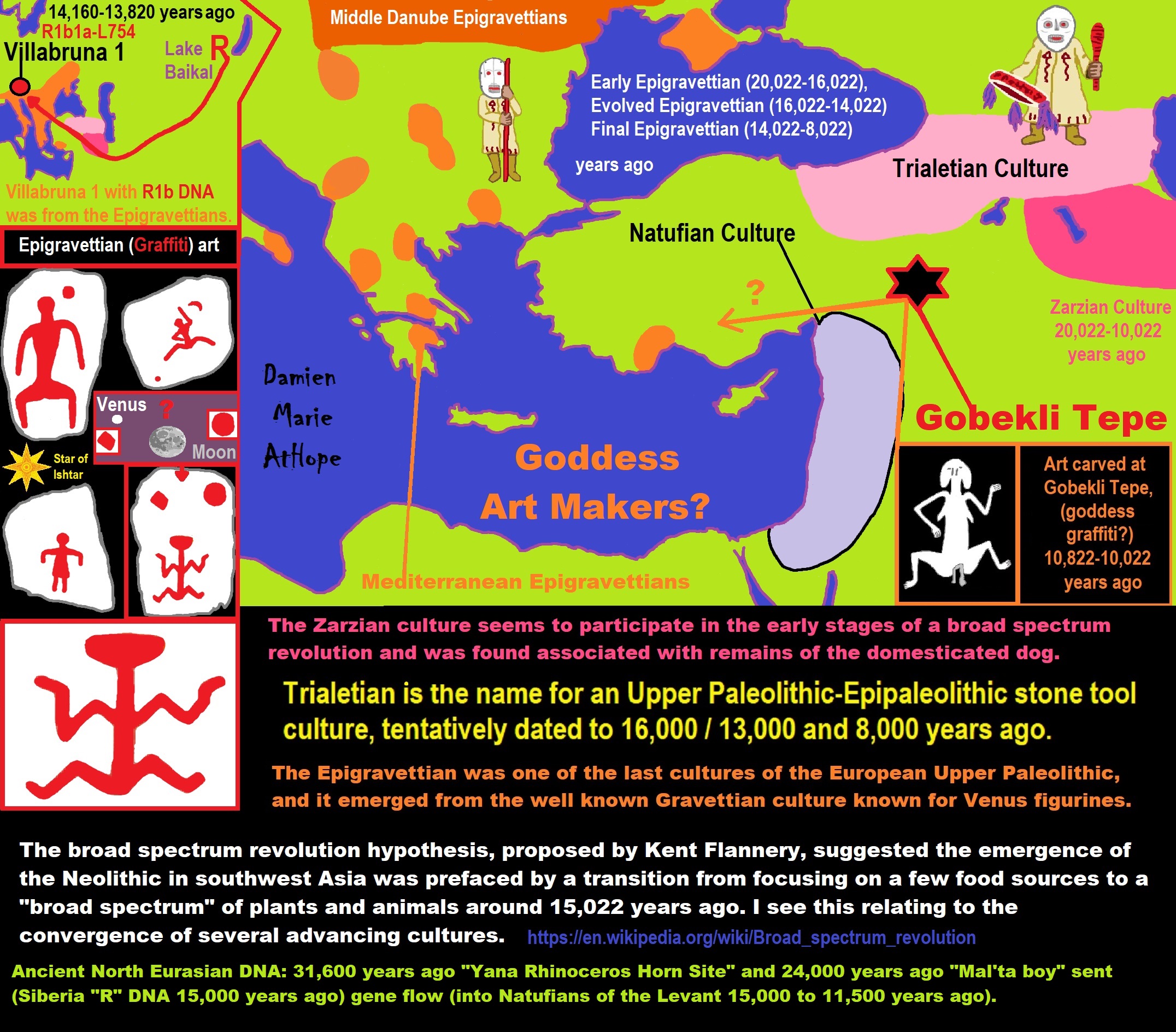



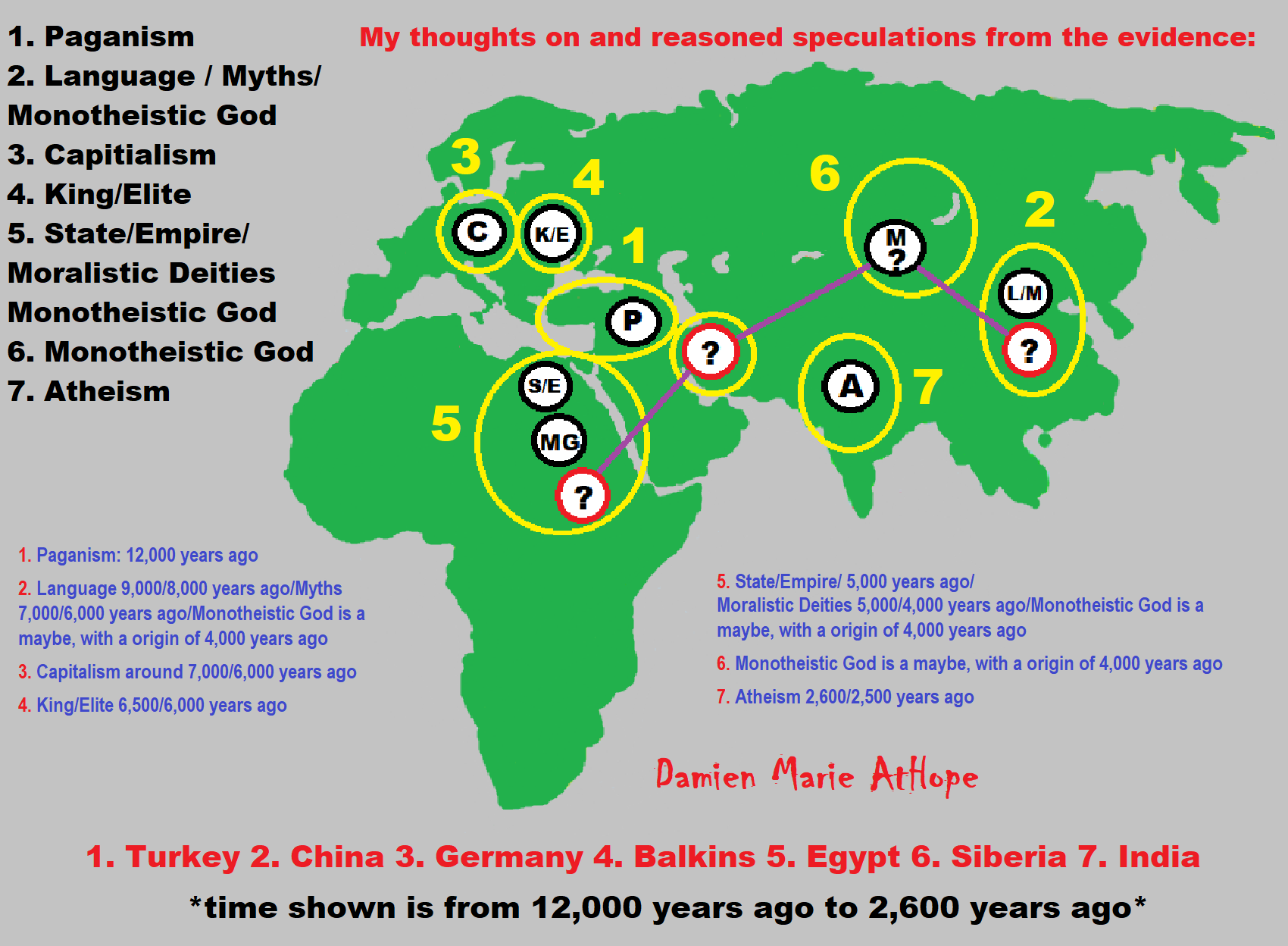

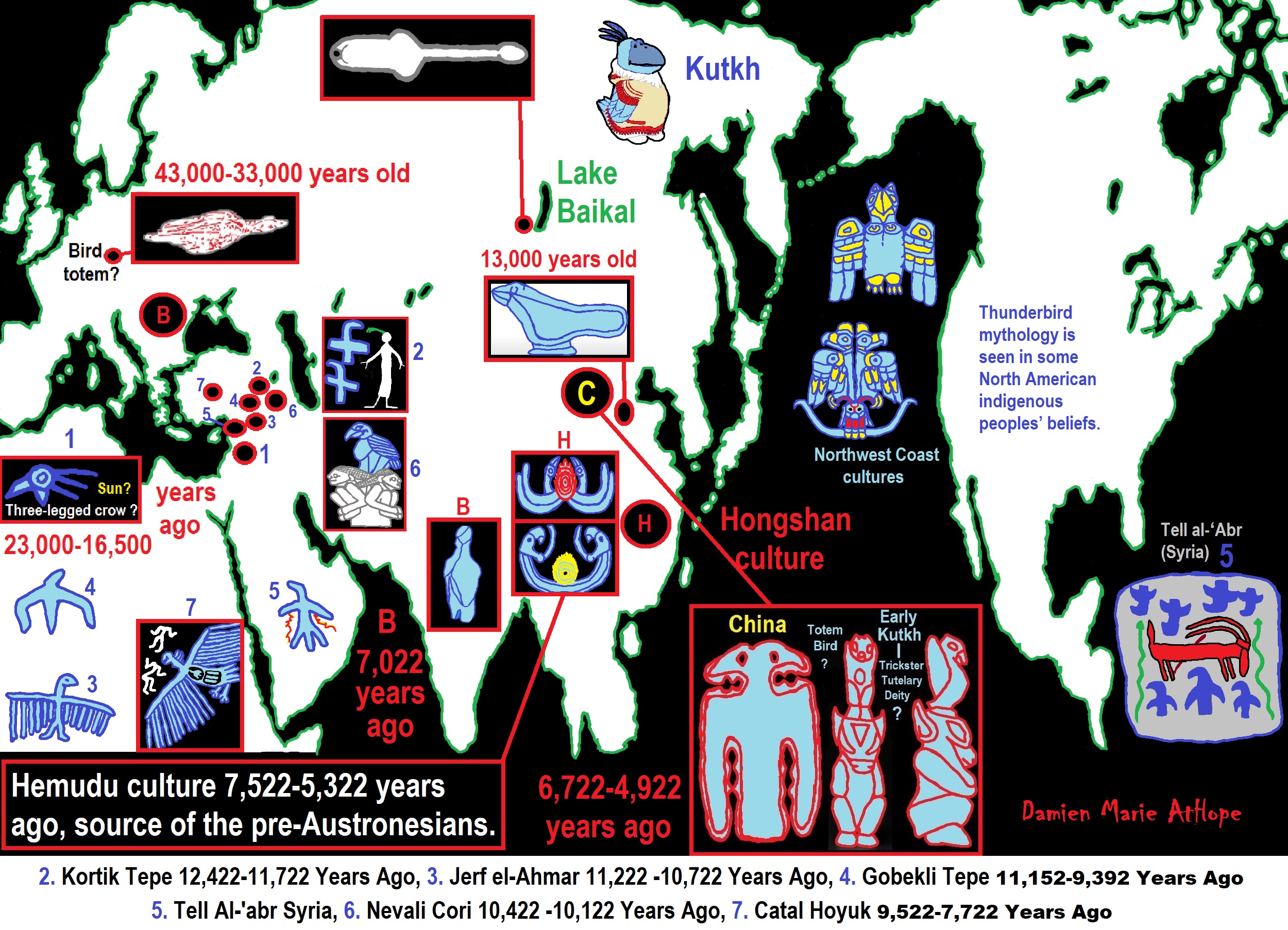
ref, ref, ref, ref, ref, ref, ref, ref, ref, ref, ref, ref, ref, ref
1. Kebaran culture 23,022-16,522 Years Ago, 2. Kortik Tepe 12,422-11,722 Years Ago, 3. Jerf el-Ahmar 11,222 -10,722 Years Ago, 4. Gobekli Tepe 11,152-9,392 Years Ago, 5. Tell Al-‘abrUbaid and Uruk Periods, 6. Nevali Cori 10,422 -10,122 Years Ago, 7. Catal Hoyuk 9,522-7,722 Years Ago
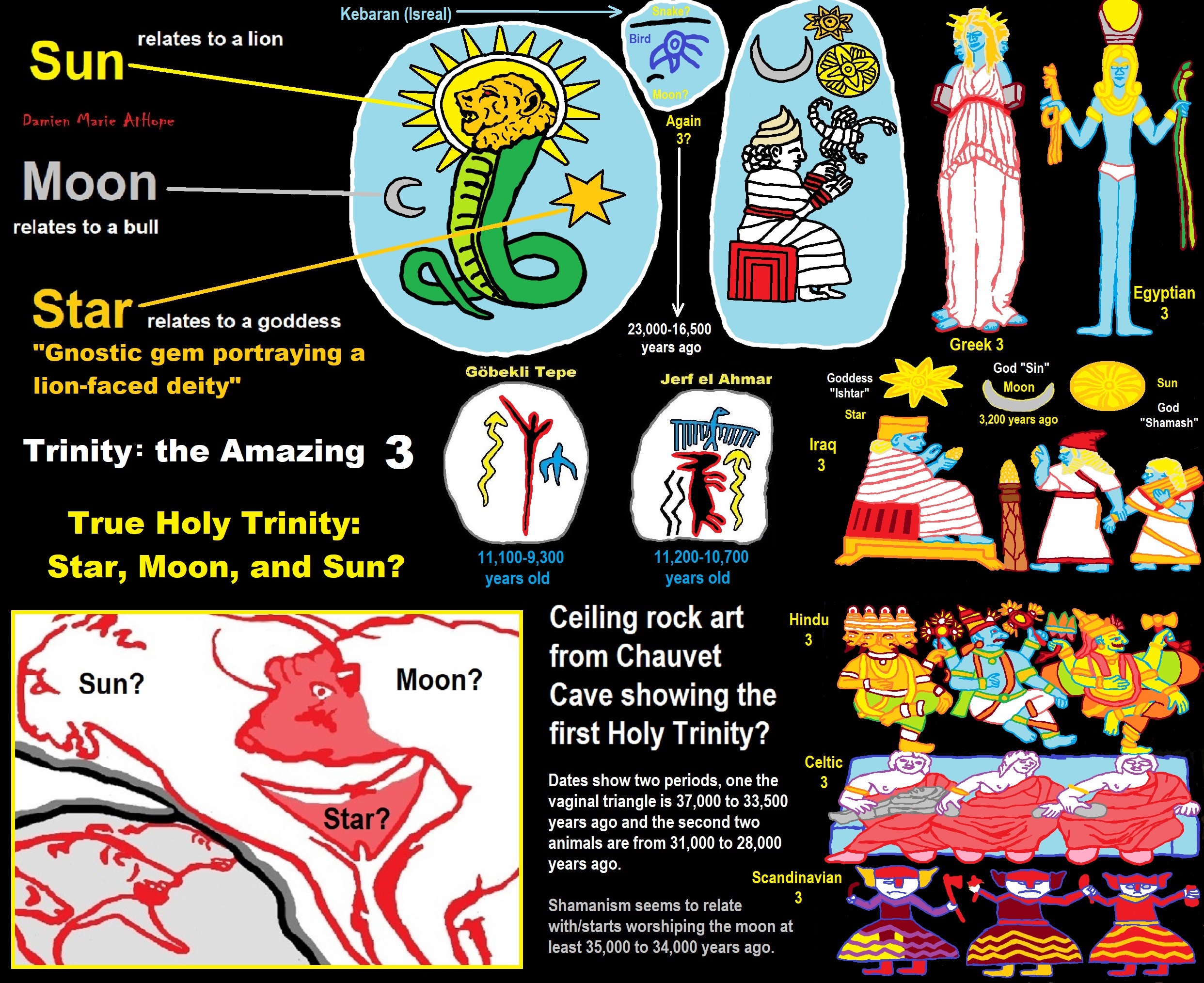
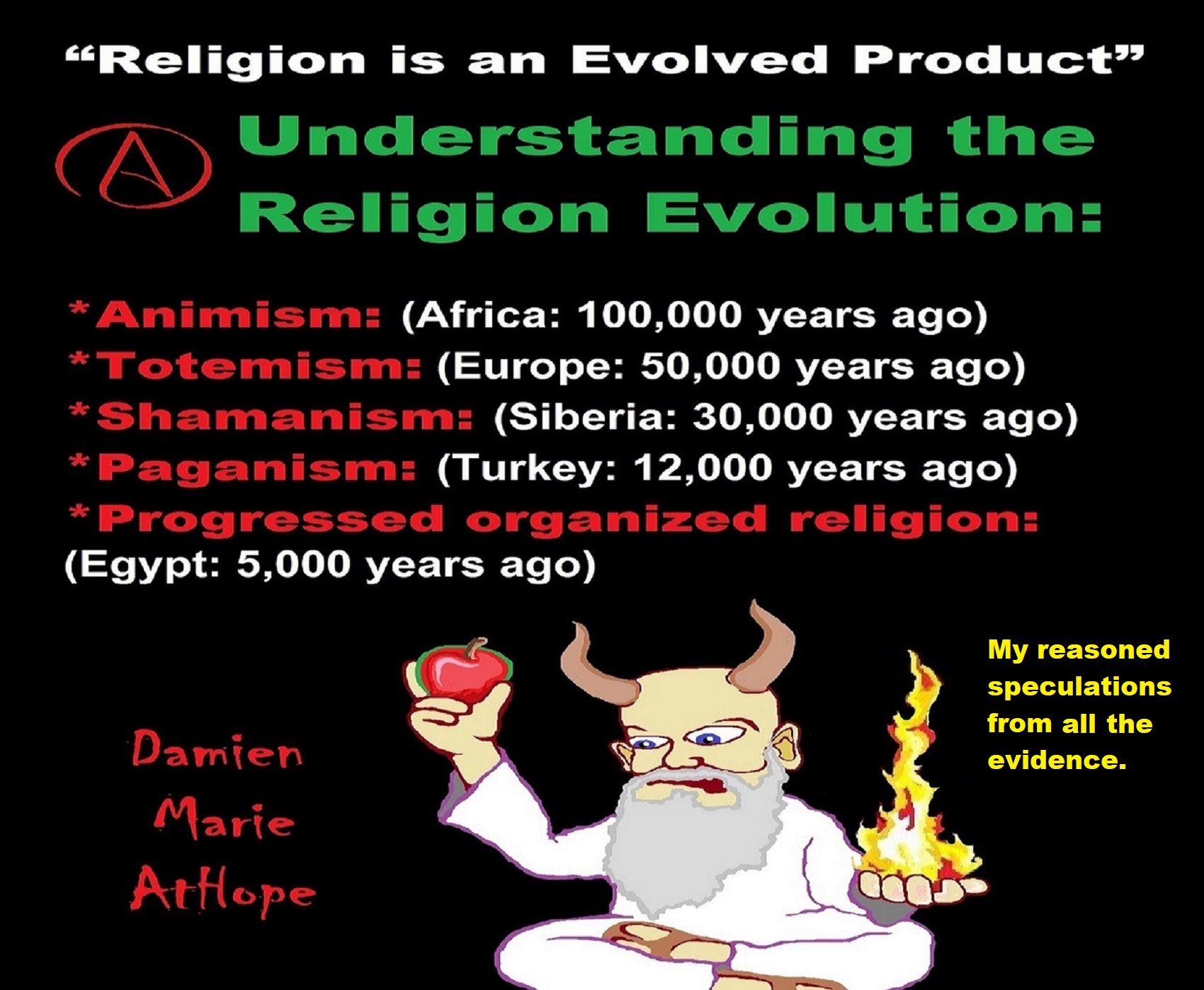


Hinduism around 3,700 to 3,500 years old. ref
Judaism around 3,450 or 3,250 years old. (The first writing in the bible was “Paleo-Hebrew” dated to around 3,000 years ago Khirbet Qeiyafa is the site of an ancient fortress city overlooking the Elah Valley. And many believe the religious Jewish texts were completed around 2,500) ref, ref
Judaism is around 3,450 or 3,250 years old. (“Paleo-Hebrew” 3,000 years ago and Torah 2,500 years ago)
“Judaism is an Abrahamic, its roots as an organized religion in the Middle East during the Bronze Age. Some scholars argue that modern Judaism evolved from Yahwism, the religion of ancient Israel and Judah, by the late 6th century BCE, and is thus considered to be one of the oldest monotheistic religions.” ref
“Yahwism is the name given by modern scholars to the religion of ancient Israel, essentially polytheistic, with a plethora of gods and goddesses. Heading the pantheon was Yahweh, the national god of the Israelite kingdoms of Israel and Judah, with his consort, the goddess Asherah; below them were second-tier gods and goddesses such as Baal, Shamash, Yarikh, Mot, and Astarte, all of whom had their own priests and prophets and numbered royalty among their devotees, and a third and fourth tier of minor divine beings, including the mal’ak, the messengers of the higher gods, who in later times became the angels of Judaism, Christianity and Islam. Yahweh, however, was not the ‘original’ god of Israel “Isra-El”; it is El, the head of the Canaanite pantheon, whose name forms the basis of the name “Israel”, and none of the Old Testament patriarchs, the tribes of Israel, the Judges, or the earliest monarchs, have a Yahwistic theophoric name (i.e., one incorporating the name of Yahweh).” ref
“El is a Northwest Semitic word meaning “god” or “deity“, or referring (as a proper name) to any one of multiple major ancient Near Eastern deities. A rarer form, ‘ila, represents the predicate form in Old Akkadian and in Amorite. The word is derived from the Proto-Semitic *ʔil-, meaning “god”. Specific deities known as ‘El or ‘Il include the supreme god of the ancient Canaanite religion and the supreme god of East Semitic speakers in Mesopotamia’s Early Dynastic Period. ʼĒl is listed at the head of many pantheons. In some Canaanite and Ugaritic sources, ʼĒl played a role as father of the gods, of creation, or both. For example, in the Ugaritic texts, ʾil mlk is understood to mean “ʼĒl the King” but ʾil hd as “the god Hadad“. The Semitic root ʾlh (Arabic ʾilāh, Aramaic ʾAlāh, ʾElāh, Hebrew ʾelōah) may be ʾl with a parasitic h, and ʾl may be an abbreviated form of ʾlh. In Ugaritic the plural form meaning “gods” is ʾilhm, equivalent to Hebrew ʾelōhîm “powers”. In the Hebrew texts this word is interpreted as being semantically singular for “god” by biblical commentators. However the documentary hypothesis for the Old Testament (corresponds to the Jewish Torah) developed originally in the 1870s, identifies these that different authors – the Jahwist, Elohist, Deuteronomist, and the Priestly source – were responsible for editing stories from a polytheistic religion into those of a monotheistic religion. Inconsistencies that arise between monotheism and polytheism in the texts are reflective of this hypothesis.” ref
Jainism around 2,599 – 2,527 years old. ref
Confucianism around 2,600 – 2,551 years old. ref
Buddhism around 2,563/2,480 – 2,483/2,400 years old. ref
Christianity around 2,o00 years old. ref
Shinto around 1,305 years old. ref
Islam around 1407–1385 years old. ref

Knowledge to Ponder:
Stars/Astrology:
- Possibly, around 30,000 years ago (in simpler form) to 6,000 years ago, Stars/Astrology are connected to Ancestors, Spirit Animals, and Deities.
- The star also seems to be a possible proto-star for Star of Ishtar, Star of Inanna, or Star of Venus.
- Around 7,000 to 6,000 years ago, Star Constellations/Astrology have connections to the “Kurgan phenomenon” of below-ground “mound” stone/wood burial structures and “Dolmen phenomenon” of above-ground stone burial structures.
- Around 6,500–5,800 years ago, The Northern Levant migrations into Jordon and Israel in the Southern Levant brought new cultural and religious transfer from Turkey and Iran.
- “The Ghassulian Star,” a mysterious 6,000-year-old mural from Jordan may have connections to the European paganstic kurgan/dolmens phenomenon.
“Astrology is a range of divinatory practices, recognized as pseudoscientific since the 18th century, that claim to discern information about human affairs and terrestrial events by studying the apparent positions of celestial objects. Different cultures have employed forms of astrology since at least the 2nd millennium BCE, these practices having originated in calendrical systems used to predict seasonal shifts and to interpret celestial cycles as signs of divine communications. Most, if not all, cultures have attached importance to what they observed in the sky, and some—such as the Hindus, Chinese, and the Maya—developed elaborate systems for predicting terrestrial events from celestial observations. Western astrology, one of the oldest astrological systems still in use, can trace its roots to 19th–17th century BCE Mesopotamia, from where it spread to Ancient Greece, Rome, the Islamicate world and eventually Central and Western Europe. Contemporary Western astrology is often associated with systems of horoscopes that purport to explain aspects of a person’s personality and predict significant events in their lives based on the positions of celestial objects; the majority of professional astrologers rely on such systems.” ref
Around 5,500 years ago, Science evolves, The first evidence of science was 5,500 years ago and was demonstrated by a body of empirical, theoretical, and practical knowledge about the natural world. ref
Around 5,000 years ago, Origin of Logics is a Naturalistic Observation (principles of valid reasoning, inference, & demonstration) ref
Around 4,150 to 4,000 years ago: The earliest surviving versions of the Sumerian Epic of Gilgamesh, which was originally titled “He who Saw the Deep” (Sha naqba īmuru) or “Surpassing All Other Kings” (Shūtur eli sharrī) were written. ref
Hinduism:
- 3,700 years ago or so, the oldest of the Hindu Vedas (scriptures), the Rig Veda was composed.
- 3,500 years ago or so, the Vedic Age began in India after the collapse of the Indus Valley Civilization.
Judaism:
- around 3,000 years ago, the first writing in the bible was “Paleo-Hebrew”
- around 2,500 years ago, many believe the religious Jewish texts were completed
Myths: The bible inspired religion is not just one religion or one myth but a grouping of several religions and myths
- Around 3,450 or 3,250 years ago, according to legend, is the traditionally accepted period in which the Israelite lawgiver, Moses, provided the Ten Commandments.
- Around 2,500 to 2,400 years ago, a collection of ancient religious writings by the Israelites based primarily upon the Hebrew Bible, Tanakh, or Old Testament is the first part of Christianity’s bible.
- Around 2,400 years ago, the most accepted hypothesis is that the canon was formed in stages, first the Pentateuch (Torah).
- Around 2,140 to 2,116 years ago, the Prophets was written during the Hasmonean dynasty, and finally the remaining books.
- Christians traditionally divide the Old Testament into four sections:
- The first five books or Pentateuch (Torah).
- The proposed history books telling the history of the Israelites from their conquest of Canaan to their defeat and exile in Babylon.
- The poetic and proposed “Wisdom books” dealing, in various forms, with questions of good and evil in the world.
- The books of the biblical prophets, warning of the consequences of turning away from God:
- Henotheism:
- Exodus 20:23 “You shall not make other gods besides Me (not saying there are no other gods just not to worship them); gods of silver or gods of gold, you shall not make for yourselves.”
- Polytheism:
- Judges 10:6 “Then the sons of Israel again did evil in the sight of the LORD, served the Baals and the Ashtaroth, the gods of Aram, the gods of Sidon, the gods of Moab, the gods of the sons of Ammon, and the gods of the Philistines; thus they forsook the LORD and did not serve Him.”
- 1 Corinthians 8:5 “For even if there are so-called gods whether in heaven or on earth, as indeed there are many gods and many lords.”
- Monotheism:
- Isaiah 43:10 “You are my witnesses,” declares the LORD, “and my servant whom I have chosen, so that you may know and believe me and understand that I am he. Before me no god was formed, nor will there be one after me.
Around 2,570 to 2,270 Years Ago, there is a confirmation of atheistic doubting as well as atheistic thinking, mainly by Greek philosophers. However, doubting gods is likely as old as the invention of gods and should destroy the thinking that belief in god(s) is the “default belief”. The Greek word is apistos (a “not” and pistos “faithful,”), thus not faithful or faithless because one is unpersuaded and unconvinced by a god(s) claim. Short Definition: unbelieving, unbeliever, or unbelief.

Expressions of Atheistic Thinking:
- Around 2,600 years ago, Ajita Kesakambali, ancient Indian philosopher, who is the first known proponent of Indian materialism. ref
- Around 2,535 to 2,475 years ago, Heraclitus, Greek pre-Socratic philosopher, a native of the Greek city Ephesus, Ionia, on the coast of Anatolia, also known as Asia Minor or modern Turkey. ref
- Around 2,500 to 2,400 years ago, according to The Story of Civilization book series certain African pygmy tribes have no identifiable gods, spirits, or religious beliefs or rituals, and even what burials accrue are without ceremony. ref
- Around 2,490 to 2,430 years ago, Empedocles, Greek pre-Socratic philosopher and a citizen of Agrigentum, a Greek city in Sicily. ref
- Around 2,460 to 2,370 years ago, Democritus, Greek pre-Socratic philosopher considered to be the “father of modern science” possibly had some disbelief amounting to atheism. ref
- Around 2,399 years ago or so, Socrates, a famous Greek philosopher was tried for sinfulness by teaching doubt of state gods. ref
- Around 2,341 to 2,270 years ago, Epicurus, a Greek philosopher known for composing atheistic critics and famously stated, “Is God willing to prevent evil, but not able? Then he is not omnipotent. Is he able, but not willing? Then he is malevolent. Is he both able and willing? Then whence cometh evil? Is he neither able nor willing? Then why call him god?” ref
This last expression by Epicurus, seems to be an expression of Axiological Atheism. To understand and utilize value or actually possess “Value Conscious/Consciousness” to both give a strong moral “axiological” argument (the problem of evil) as well as use it to fortify humanism and positive ethical persuasion of human helping and care responsibilities. Because value-blindness gives rise to sociopathic/psychopathic evil.

While hallucinogens are associated with shamanism, it is alcohol that is associated with paganism.
The Atheist-Humanist-Leftist Revolutionaries Shows in the prehistory series:
Show two: Pre-animism 300,000 years old and animism 100,000 years old: related to “Anarchism and Socialism”
Show tree: Totemism 50,000 years old: related to “Anarchism and Socialism”
Show four: Shamanism 30,000 years old: related to “Anarchism and Socialism”
Show five: Paganism 12,000 years old: related to “Anarchism and Socialism”
Show six: Emergence of hierarchy, sexism, slavery, and the new male god dominance: Paganism 7,000-5,000 years old: related to “Anarchism and Socialism” (Capitalism) (World War 0) Elite and their slaves!
Prehistory: related to “Anarchism and Socialism” the division of labor, power, rights, and recourses: VIDEO
Pre-animism 300,000 years old and animism 100,000 years old: related to “Anarchism and Socialism”: VIDEO
Totemism 50,000 years old: related to “Anarchism and Socialism”: VIDEO
Shamanism 30,000 years old: related to “Anarchism and Socialism”: VIDEO
Paganism 12,000 years old: related to “Anarchism and Socialism” (Pre-Capitalism): VIDEO
Paganism 7,000-5,000 years old: related to “Anarchism and Socialism” (Capitalism) (World War 0) Elite and their slaves: VIEDO
Paganism 5,000 years old: progressed organized religion and the state: related to “Anarchism and Socialism” (Kings and the Rise of the State): VIEDO
Paganism 4,000 years old: related to “Anarchism and Socialism” (First Moralistic gods, then the Origin time of Monotheism): VIEDO
I do not hate simply because I challenge and expose myths or lies any more than others being thought of as loving simply because of the protection and hiding from challenge their favored myths or lies.
The truth is best championed in the sunlight of challenge.
An archaeologist once said to me “Damien religion and culture are very different”
My response, So are you saying that was always that way, such as would you say Native Americans’ cultures are separate from their religions? And do you think it always was the way you believe?
I had said that religion was a cultural product. That is still how I see it and there are other archaeologists that think close to me as well. Gods too are the myths of cultures that did not understand science or the world around them, seeing magic/supernatural everywhere.
I personally think there is a goddess and not enough evidence to support a male god at Çatalhöyük but if there was both a male and female god and goddess then I know the kind of gods they were like Proto-Indo-European mythology.
This series idea was addressed in, Anarchist Teaching as Free Public Education or Free Education in the Public: VIDEO
Our 12 video series: Organized Oppression: Mesopotamian State Force and the Politics of power (9,000-4,000 years ago), is adapted from: The Complete and Concise History of the Sumerians and Early Bronze Age Mesopotamia (7000-2000 BC): https://www.youtube.com/watch?v=szFjxmY7jQA by “History with Cy“
Show #1: Mesopotamian State Force and the Politics of Power (Samarra, Halaf, Ubaid)
Show #2: Mesopotamian State Force and the Politics of Power (Eridu “Tell Abu Shahrain”)
Show #3: Mesopotamian State Force and the Politics of Power (Uruk and the First Cities)
Show #4: Mesopotamian State Force and the Politics of Power (First Kings)
Show #5: Mesopotamian State Force and the Politics of Power (Early Dynastic Period)
Show #6: Mesopotamian State Force and the Politics of Power (King/Ruler Lugalzagesi)
Show #7: Mesopotamian State Force and the Politics of Power (Sargon and Akkadian Rule)
Show #9: Mesopotamian State Force and the Politics of Power (Gudea of Lagash and Utu-hegal)
Show #12: Mesopotamian State Force and the Politics of Power (Aftermath and Legacy of Sumer)

The “Atheist-Humanist-Leftist Revolutionaries”
Cory Johnston ☭ Ⓐ Atheist Leftist @Skepticallefty & I (Damien Marie AtHope) @AthopeMarie (my YouTube & related blog) are working jointly in atheist, antitheist, antireligionist, antifascist, anarchist, socialist, and humanist endeavors in our videos together, generally, every other Saturday.
Why Does Power Bring Responsibility?
Think, how often is it the powerless that start wars, oppress others, or commit genocide? So, I guess the question is to us all, to ask, how can power not carry responsibility in a humanity concept? I know I see the deep ethical responsibility that if there is power their must be a humanistic responsibility of ethical and empathic stewardship of that power. Will I be brave enough to be kind? Will I possess enough courage to be compassionate? Will my valor reach its height of empathy? I as everyone, earns our justified respect by our actions, that are good, ethical, just, protecting, and kind. Do I have enough self-respect to put my love for humanity’s flushing, over being brought down by some of its bad actors? May we all be the ones doing good actions in the world, to help human flourishing.
I create the world I want to live in, striving for flourishing. Which is not a place but a positive potential involvement and promotion; a life of humanist goal precision. To master oneself, also means mastering positive prosocial behaviors needed for human flourishing. I may have lost a god myth as an atheist, but I am happy to tell you, my friend, it is exactly because of that, leaving the mental terrorizer, god belief, that I truly regained my connected ethical as well as kind humanity.
Cory and I will talk about prehistory and theism, addressing the relevance to atheism, anarchism, and socialism.
At the same time as the rise of the male god, 7,000 years ago, there was also the very time there was the rise of violence, war, and clans to kingdoms, then empires, then states. It is all connected back to 7,000 years ago, and it moved across the world.
Cory Johnston: https://damienmarieathope.com/2021/04/cory-johnston-mind-of-a-skeptical-leftist/?v=32aec8db952d
The Mind of a Skeptical Leftist (YouTube)
Cory Johnston: Mind of a Skeptical Leftist @Skepticallefty
The Mind of a Skeptical Leftist By Cory Johnston: “Promoting critical thinking, social justice, and left-wing politics by covering current events and talking to a variety of people. Cory Johnston has been thoughtfully talking to people and attempting to promote critical thinking, social justice, and left-wing politics.” http://anchor.fm/skepticalleft
Cory needs our support. We rise by helping each other.
Cory Johnston ☭ Ⓐ @Skepticallefty Evidence-based atheist leftist (he/him) Producer, host, and co-host of 4 podcasts @skeptarchy @skpoliticspod and @AthopeMarie
Damien Marie AtHope (“At Hope”) Axiological Atheist, Anti-theist, Anti-religionist, Secular Humanist. Rationalist, Writer, Artist, Poet, Philosopher, Advocate, Activist, Psychology, and Armchair Archaeology/Anthropology/Historian.
Damien is interested in: Freedom, Liberty, Justice, Equality, Ethics, Humanism, Science, Atheism, Antiteism, Antireligionism, Ignosticism, Left-Libertarianism, Anarchism, Socialism, Mutualism, Axiology, Metaphysics, LGBTQI, Philosophy, Advocacy, Activism, Mental Health, Psychology, Archaeology, Social Work, Sexual Rights, Marriage Rights, Woman’s Rights, Gender Rights, Child Rights, Secular Rights, Race Equality, Ageism/Disability Equality, Etc. And a far-leftist, “Anarcho-Humanist.”
I am not a good fit in the atheist movement that is mostly pro-capitalist, I am anti-capitalist. Mostly pro-skeptic, I am a rationalist not valuing skepticism. Mostly pro-agnostic, I am anti-agnostic. Mostly limited to anti-Abrahamic religions, I am an anti-religionist.
To me, the “male god” seems to have either emerged or become prominent around 7,000 years ago, whereas the now favored monotheism “male god” is more like 4,000 years ago or so. To me, the “female goddess” seems to have either emerged or become prominent around 11,000-10,000 years ago or so, losing the majority of its once prominence around 2,000 years ago due largely to the now favored monotheism “male god” that grow in prominence after 4,000 years ago or so.
My Thought on the Evolution of Gods?
Animal protector deities from old totems/spirit animal beliefs come first to me, 13,000/12,000 years ago, then women as deities 11,000/10,000 years ago, then male gods around 7,000/8,000 years ago. Moralistic gods around 5,000/4,000 years ago, and monotheistic gods around 4,000/3,000 years ago.

Damien Marie AtHope (Said as “At” “Hope”)/(Autodidact Polymath but not good at math):
Axiological Atheist, Anti-theist, Anti-religionist, Secular Humanist, Rationalist, Writer, Artist, Jeweler, Poet, “autodidact” Philosopher, schooled in Psychology, and “autodidact” Armchair Archaeology/Anthropology/Pre-Historian (Knowledgeable in the range of: 1 million to 5,000/4,000 years ago). I am an anarchist socialist politically. Reasons for or Types of Atheism
My Website, My Blog, & Short-writing or Quotes, My YouTube, Twitter: @AthopeMarie, and My Email: damien.marie.athope@gmail.com


